#great great beautiful story. remarkable story. homosexual story
Text
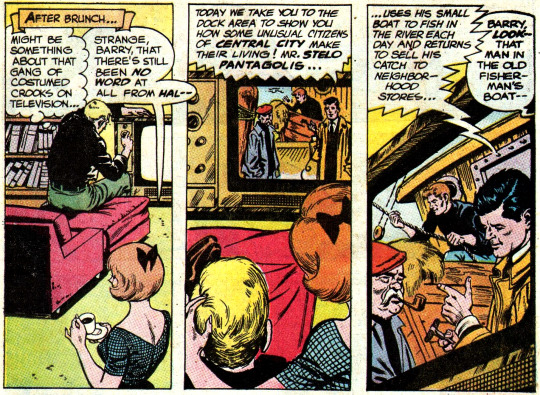
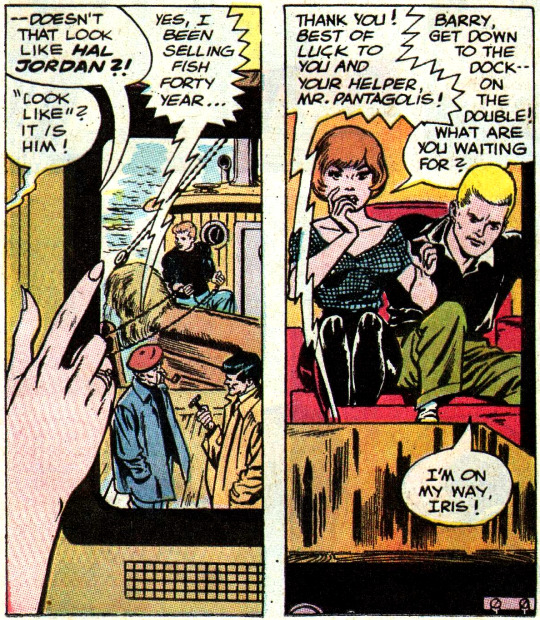
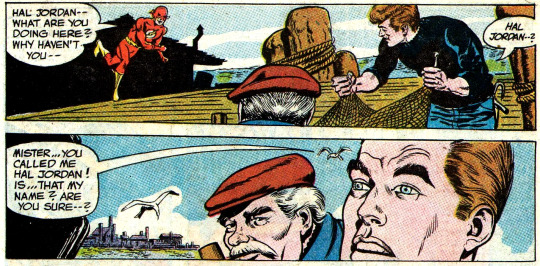
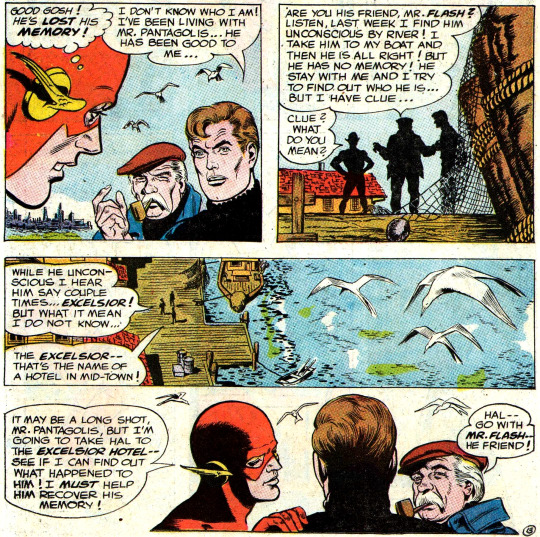
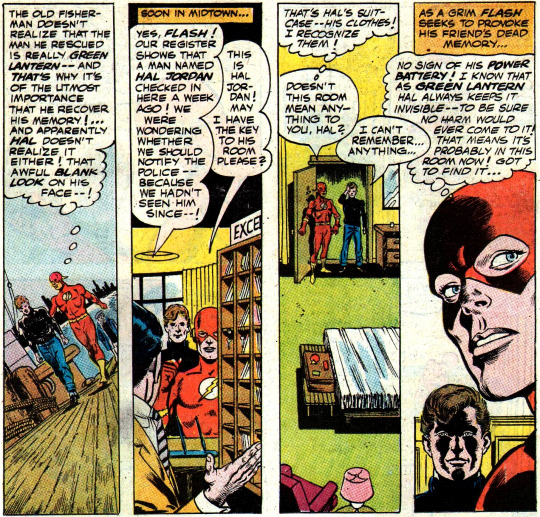
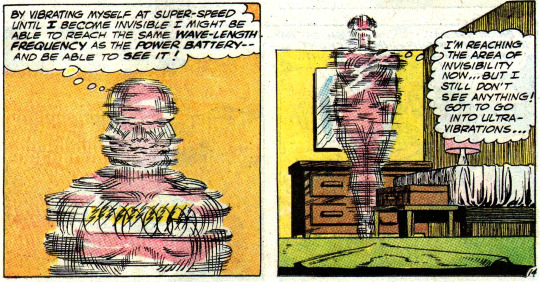
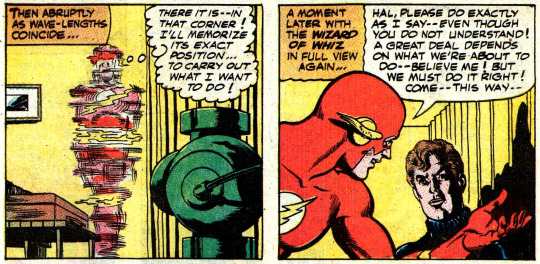
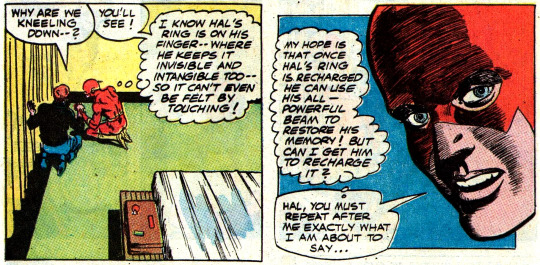
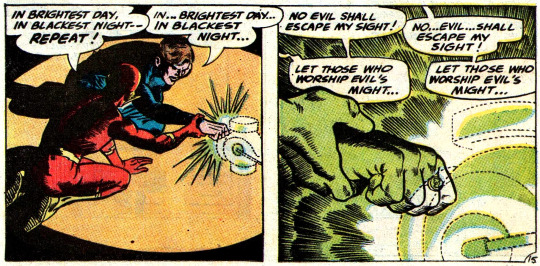
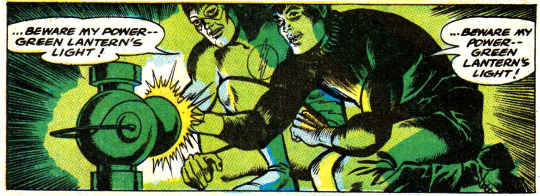
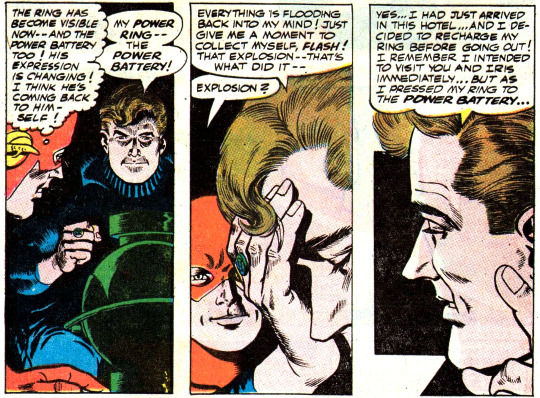
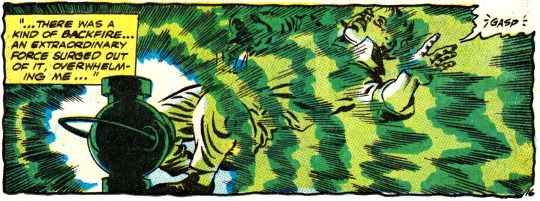
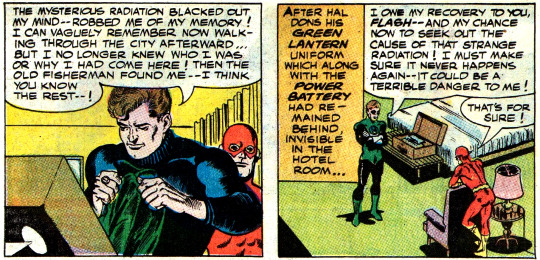
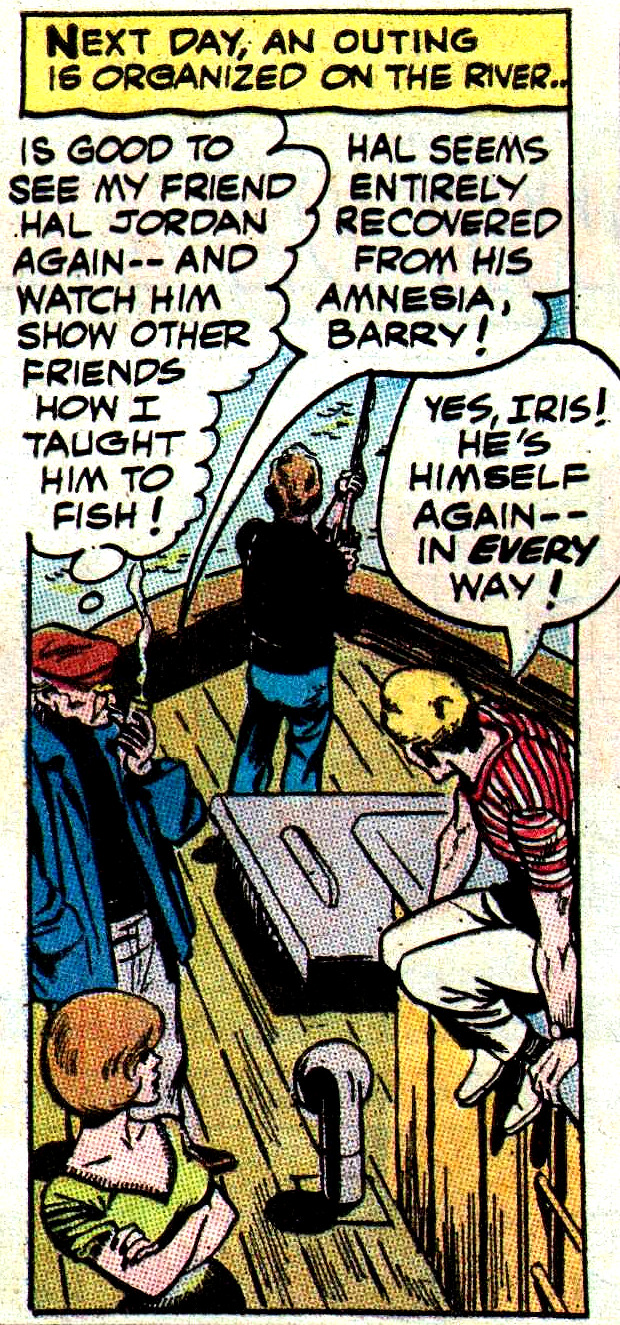
Is good to see my friend Hal Jordan again-- and watch him show other friends how I taught him to fish!
Hal Jordan in The Flash (1959) #168
(John Broome, Carmine Infantino)
#the flash 1959#hal jordan#green lantern#barry allen#the flash#iris west#dc#dc comics#john broome#carmine infantino#dcedit#comicedit#comicsedit#u can reblog#I CANT BELIEVE I OWN THIS. RUNS AROUND SCREAMING#great great beautiful story. remarkable story. homosexual story
8 notes
·
View notes
Text
sweet daisy and the violet witch (agatha harkness x fem!reader)
tip jar / masterlist
summary: you are a baby witch in a tough situation. when a mysterious, brooding woman offers to teach you how to control your powers, you can't refuse. but what does she want with you? and... what do you want with her?
warnings: smut (18+), captivity and bondage but reader isn't exactly unwilling, mind-reading, sexy magic, humiliation, praise kink, dirty talk, enchanted strap, squirting, agatha is dark ofc, reader has a shitty sexist ex-boyfriend but he's only there to set up the story
notes: MY FIRST AGATHA FIC! this is set pre-westview and it is just pages upon pages of detailed, heretical, homosexual filth. it's been a long time coming, and i'm really proud of it. hope you guys enjoy 💜
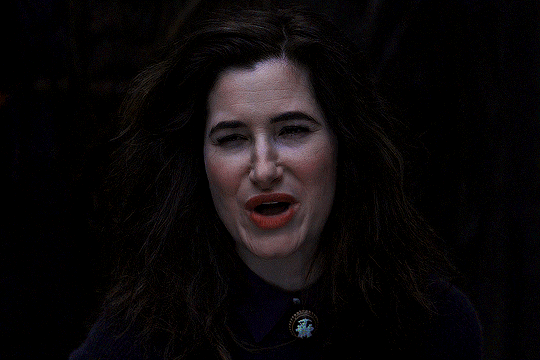
tears streamed down your face as you stormed out of your now ex-boyfriend's house. the relationship had run its course, you knew that. but you never expected the breakup to be so ugly. he called you a "crazy bitch" and threatened to call the cops on you for destroying his living room.
and you didn't even do anything! at least, not on purpose.
the fight lasted an hour. you told him you wanted to break up, and he didn't take the rejection well. he started cursing you out, following you around the house as you frantically gathered your belongings.
now, you could handle the insults to your appearance and the comments about all the other women who supposedly wanted him. but when he started making sexual remarks—talking about how "frigid" you were and lamenting that he never fucked you hard enough to put you in your place—you lost it.
"shut up!" you cried, and the house shook with the impact. a wave of daisy yellow light burst from your chest and wreaked havoc on the living room. every lightbulb in every lamp shattered. the tv fell off the wall. books flew off their shelves and hurtled toward your ex's head. the carpet was singed. a few cracks appeared in the ceiling.
your ex ducked to avoid the flying books, then fell to his knees. he was uninjured despite the destruction, but his pride was wounded. you used his moment of weakness to grab your bag and rush out of the house, running down the street as fast as you could while he shouted obscenities.
you ran for a minute or so before a black car with tinted windows pulled up beside you. you froze in fear, but quickly relaxed when the driver rolled her window down. she was an older woman, and a beautiful one at that.
long, dark waves framed her face, and concern was written in her expression. her left arm extended out toward you, and you could see she was wearing a deep purple blazer.
"hey, hon. i heard some commotion from down the street and then saw you running. are you alright?" the woman's low voice was soothing, and you felt much safer already.
"i'm okay, thank you. i just broke up with my boyfriend and it didn't go over well," you admitted, your shaky voice betraying your anxiety about the whole situation.
"well, i can't let you walk all the way home, sweetheart. how about i give you a ride?"
you considered her offer. it was cold and rainy outside, and your apartment was a good distance away. this woman was a stranger, but she put you at ease for some reason. besides, much worse people than her could be out at this time of night.
"that would be great. thank you so much. i'm y/n," you said, stepping into the passenger seat.
"agatha harkness," the good samaritan replied, offering her hand to you. you took her hand and shook it, noting the delicate veins running up her long fingers. her thumb stroked the back of your palm for a few seconds, and the skin tingled when she stopped. "lovely to meet you, dear."
you told her your address and she put it in the gps, beginning the 15-minute drive to your place. agatha was pleasant and kind as she listened to your story, how your boyfriend had treated you and how you'd reacted—omitting the magical details, naturally.
when the car pulled up in front of your apartment, you thanked agatha and gave her a hug. she smelled like violets and old books, and you hesitated to pull away. when you did reach for the door handle, it didn't budge.
it all happened in a flash: purple smoke obscured every window, your hands and feet were bound by glowing purple ties, and agatha smiled. the smoke cleared, and you were not at your apartment. instead, the car was parked in front of a small black house with gothic accents.
"wha—how—" you stuttered.
"i'm glad you asked. it was a simple illusion spell. couldn't have you getting suspicious, could i?"
"s-spell?"
"yes, darling, a spell. i'm a witch. you are, too, but i'm sure you already knew that."
you looked down at your lap and shook your head.
"oh? that's a surprise. i mean, i knew you weren't the most sophisticated witch, but i figured you'd at least have a grasp on what you are."
your mind reeled at the revelation. although she had basically kidnapped you, you felt a strange pull to the woman in the driver's seat. your gut told you to trust what she was saying: you were a witch.
"tell you what, baby witch," she offered, a mischievous glint in her eye. "if you promise not to run, i'll untie you."
what choice did you have but to obey her? you didn't know how to control your powers, and sooner or later, they were going to get you in trouble. agatha knew more than you did, and she was teasing you with the irresistible chance to understand your magic.
"i won't run," you whispered. you felt agatha lift her magical binds.
"good girl."
---
agatha did what she always did. she promised to teach you how to master your powers, lulled you into a false sense of security. and at night, when you were sleeping soundly in her bed, she would try to take your power.
it only took her a couple of days to realize that she couldn't access your magic. she tried everything, but your bright yellow power was totally incompatible with her mystic purple—a fountain of light, untouchable by other witches.
oddly, agatha accepted this. unlike any of her previous conquests, you inspired a curious fondness in the older woman. you were smart and beautiful, powerful yet unassuming. and you were hers to teach, to touch, to protect and corrupt. with some training, you would be a formidable ally.
as for you? you were neither her victim nor her partner, but something in between. you abandoned your old life and happily crawled into bed with her each night—so she could keep an eye on you, she said.
"women like us will never be safe in this world, y/n," she would whisper into your hair. "that asshole saw what you can do, and he didn't like it. you're too precious for the stake, honey. i have to keep you close."
agatha hated your ex, but she could use him to channel your rage. as you worked through the emotional toll of the breakup, you worked on your telekinesis. as you processed the extent of his manipulation, you learned the basics of mind control.
one day, agatha wanted to see if you could hold your own against her. she was anxious to know if you could protect yourself with the strategies she'd taught you.
"you ready, superstar?" agatha asked, looking you up and down hungrily. you were wearing the outfit she had picked out specifically for this occasion: a black mesh halter top with a little yellow skirt, "ideal" for mobility. "don't worry, i'll go easy on you."
"i think so," you responded, trying to settle your nerves and anticipate her first move. but it was hard to focus when she stared at you with dark eyes, hair pulled back into a ponytail and arms crossed, emphasized by her tight purple t-shirt.
"don't get distracted, now," a sultry voice whispered from behind you. agatha had teleported, and you were too focused on her arms to notice. "that's rule number one."
you shuddered at the feeling of her hot breath in your ear, but kept your guard up. purple strings began to flow from her fingertips and wrap around you. you swiftly floated up and out of her hold, yellow sparks carrying you across the room.
you landed with a flourish and agatha raised her eyebrows, impressed. she didn't let you rest for more than a second, though, as a blow of her magic struck you right in the chest.
you stumbled back, but quickly retaliated. with a snap of your fingers, agatha was knocked off balance by a burst of yellow. she smirked and waved her palm. but this time, you remembered to block, crossing your arms and projecting a white shield in front of you.
"so you have been listening to me," she cooed, flying toward you and pushing you up against the wall with her magic. "you always seem so preoccupied when i'm teaching you, like your pretty little mind is off somewhere else. tell me, do i scare you?"
the answer was complicated. yes, agatha scared you, but not in an unpleasant way. it was a thrilling kind of fear that left you breathing hard and wanting more.
"no, ma'am," you decided, using her momentary surprise to push back against the magic pinning you to the wall. agatha withdrew.
"hmmm, 'ma'am.' i like the sound of that," she drawled as you awaited her next move. "you're doing well, baby witch, but you forgot one thing."
in a split second, you were lying flat on your back, purple threads binding your hands and feet to the carpet. before you could even attempt to react with magic, agatha was on you. she hovered above your restrained form and leaned in.
"rule number two: protect your mind," her voice above you was the last thing you heard before being plunged into darkness.
---
when you came to a few minutes later, agatha was still on top of you. she wore a coy smile as she watched the purple swirls disappear from your eyes.
"welcome back, sweet daisy," agatha husked. "after reading your mind, it seems like you're not as sweet and pure as i thought."
you struggled against her restraints, but they didn't budge. you were definitely losing the fight, but with the way she was looking at you (like she wanted to ravage you), you didn't much care.
"you wanna know what i saw, pretty girl?" she taunted, and you swallowed thickly but did not respond. "i saw myself on top of you just like this, pumping my fingers inside you while you screamed out for mercy."
well, your secret was out. but agatha didn't seem displeased; on the contrary, she was basking in your humiliation like a true sadist. you felt wetness gathering in your panties at the sight.
"i saw myself bending you over," she continued, using her powers to lift you off the ground and maneuver you so you were bent over the couch. "punishing you for forgetting your spells."
she swatted your ass once, hard, and you whined pathetically.
"i saw you kneeling between my legs," she said, once again manipulating your body into that position. "listening to my directions, being my good girl."
on your knees, you nuzzled agatha's leg in embarrassment, and she stroked your hair. you stayed like that for a minute before agatha lifted you into her lap, spreading your legs wide.
"and i saw you grinding in my lap, squirming and whimpering like a needy whore," she concluded, running her hands up and down your inner thighs as you straddled her. "what do you have to say for yourself, honey?"
you were at a loss for words, now incredibly turned on and burying your face in her neck. her fingers twitched and you were pushed out of your hiding place, her magic forcing you to face her.
"your mind is so dirty. how are you feeling? excited?" before you could respond, she slipped her hand between your legs. she lifted up your skirt and traced your slit over your panties, inhaling sharply when she found them soaked. "oh, you are. you just can't control yourself around me, can you? all hot and bothered. do you need me to take care of you?"
"yes, please," you begged, wiggling impatiently in her arms. tendrils of purple magic snaked around you, tickling your skin and preventing you from moving any more.
"much better," agatha hummed as she restrained you. she laughed seeing your helpless face. "don't pout. i'm going to touch you, make you feel so nice. but you need to sit still and take it like a good girl."
you nodded, and she rewarded you by vanishing your top. she took your breasts in her hands and kneaded them, working her way to your nipples. when she rolled them between her fingers, you yelped.
"shhh, i know, you're so sensitive," she cooed as she toyed with you. "you're in for a treat, babygirl. have you ever used your powers to play with yourself?"
she knew the answer. of course you hadn't. you didn't even know how. but she reveled in the way your face scrunched up in wanton embarrassment at the mention of touching yourself.
"allow me to demonstrate," she said, removing her hands from your nipples and whispering a latin word under her breath. you gasped when a purple buzz settled on your buds, replicating agatha's touch without physical contact. "feels good, hm?"
you merely whined and tried to grind against her, frustrated when you couldn't move an inch. she seemed to know what you needed, though, as your skirt then disappeared in a flash of violet.
"as much as i love that little skirt on you, honey, it's in the way of what i really want to see," agatha drawled, and you held your breath with the anticipation. with no warning, she gently lifted your hips up toward her, leaned down, and latched onto your clit through your panties.
"oh my god!" you moaned as she suckled through the fabric, putting delicious pressure on your bundle of nerves. then she sat up again and returned you to your position on her lap, once again whispering the incantation to continue stimulating your clit.
"i'm flattered, but there's no god here. just me," she smirked, watching you writhe in tortured pleasure. "alright, superstar, you with me? watch this."
she held two of her fingers up to your eye level, and your eyes grew wide as her fingertips lit up. with a predatory grin, she thrusted her fingers upwards, and you felt them inside you. you couldn't suppress your sinful moan.
"don't you see how powerful we are? i'm not even touching you, and you can feel me in your pretty little pussy," she mused, drunk on her power over you. "and if i do this," she curled her fingers just right, and you screamed as she stroked your special spot, "i can feel you squeezing me. like a tiny piece of heaven."
while her fingers continued thrusting and curling, her power pumping in and out of you, she used her other hand to explore every inch of your body. she touched you like you were the most precious work of art, a soft and delicate masterpiece in her arms. her touch and her magic were all over you, and you felt yourself getting close to the edge.
"won't be long now. you're so easy, sweetness," she sang proudly. her free thumb found your clit and rubbed tight circles on it, direct touch compounding the pleasure from her magical suction. not even a minute later, your release swept over you. "there you go."
when you came, agatha lifted the restraints so she could watch your legs shake and your core convulse. she kept pumping her fingers until she heard you whimper helplessly, squirming away from her invisible touch. she then withdrew the magical stimulation and ran her palms up and down your sides to comfort you.
"how was that, sunshine?" she smiled as she checked in with you. you gave her a breathless kiss, pouring all of your passion and admiration for the older woman into her mouth. her eyes sparkled with adoration as she looked at you, fucked out and struggling to stay upright in her lap. she inched closer to whisper against your lips. "i want to fuck you."
you weren't entirely sure what she meant, but you knew from your recent mind-blowing orgasm that anything was possible through magic. you started to get antsy in her lap again. you stood up on shaky legs and started toward the bedroom.
"don't be silly, superstar," agatha laughed as she effortlessly raised you into the air until you were hovering bridal-style in her arms.
agatha swiftly brought you up the stairs and into her bedroom. she laid you down on the bed and nudged your legs apart with her magic before retreating to the closet.
"do you know what this is, princess?" agatha asked, emerging from the closet with a large purple strap-on dildo in hand. you swallowed thickly at the sheer size of it and nodded your head.
"it's a strap-on," you replied sheepishly.
"correct, smart girl. this is a very special strap-on, though. do you know why?"
"no, ma'am."
"well, i want you to think of it as my cock. because when i put on the harness," she snapped her fingers and the strap was secured between her legs, "i can feel everything."
she gave the dildo a few rough strokes and groaned to illustrate her point. you trembled in anticipation. agatha was going to take you with the biggest cock you'd ever seen. and she would be able to feel the warmth, the wetness, the fluttering of your most intimate place with her own flesh. you unconsciously spread your legs wider.
"ready for me?" agatha crawled on top of you and dragged the tip of her cock through your messy folds, getting it lubricated. you nodded tentatively. "i'll be gentle. wouldn't want to break my delicate little flower. at least, not yet."
the second her tip breached your entrance, you inhaled sharply. it was going to be a tight fit, even though you were soaked. agatha recognized your discomfort and leaned down to kiss your lips sweetly. with another latin whisper, you felt those soft kisses all over your body, on every part of you all at once—even your clit. this relaxed you, and agatha gave you a few more inches.
"you're so tight," the older woman breathed, marveling at the sensation of feeling your wet warmth around her. "and all mine, little witch. you'd like to be mine, wouldn't you? i'd dress you every day in those mini skirts and no panties, play with this pussy all day long."
agatha's words worked exactly as she intended. you lost yourself in the hazy fantasy of being hers, and she penetrated you all the way. you both cursed as she bottomed out.
"good girl, taking my cock so well, letting me fill you up. let me just..." she trailed off and pulled out before thrusting back in at a new angle, hitting your g-spot and conjuring stars behind your eyes. "there she is."
once she knew you were okay, agatha seemed to lose the last of her restraint. she fucked you fast and rough, slamming her tip into your sweet spot on every thrust. she forced her cock even deeper by pinning your knees to your chest with her powers. then she snapped her fingers and the suction was back on your clit, only three times more powerful than before.
"come on my cock, y/n," agatha commanded, sending you flying into an orgasm. this one felt different from the first one, like a spark in your core spreading into an uncontrollable fire throughout your body. your legs jerked and your face twisted up, and the sight of you sent agatha over the edge too. you felt her hot release coat your walls, satiating you.
agatha pulled out of you and coaxed you to sit up, at which point you noticed the mess. a glowing purple liquid seeped out from between your legs, and agatha's midsection was dripping with clear liquid... wait, was that glowing too? the yellow aura looked unnatural, almost neon.
"rule number three," agatha chuckled, sensing your confusion. "don't be alarmed when things start glowing. comes with the territory, dear."
"how did that...?" you wondered aloud.
"well, for me it was an artistic choice. some women really enjoy the idea of me coming inside them, so i added a special enchantment to make their dreams come true," she explained. then her face broke into a smug grin. "and you, my darling, you squirted. it's not a magical experience on its own, but apparently it was for you."
your eyes followed her hands as she gestured to the glimmering evidence of your climax.
"have you ever done that before?" she asked while waving her hands in the air. before she finished the sentence, you were both suddenly clean and wearing fresh pajamas, warm like they'd just been in the dryer.
"no," you admitted, still a bit shy after losing control so dramatically. agatha hummed and pulled you close, and you grew drowsy while she cuddled you.
"oh, sweet daisy girl. i still have so much to show you."
#agatha harkness x reader#wandavision fanfic#mcu fanfiction#agatha harkness x you#agatha harkness x female reader#agatha harkness x y/n#wlw fanfic#wlw smut#wandavision smut#agatha harkness smut#fanfic#marvel fanfiction
185 notes
·
View notes
Text
Family & Bonds AU Headcanons
I an dabbling in a couple of AU’s currently. Primarily what I have posted is a Family and Bonds AU titled....Family Bonds. (original. v crafty. wow.) Anyway, lengthy post under the cut.
I shifted the family tree from Bonds in order to accommodate the incredible characters designed by middlewarnersibling in Family to be the Warner trio's parents, and I love that story line for them.
In Bonds, it seemed odd that Bosko would some how not notice his lover's aging or just how she managed to keep all three kids a secret, but I figured, one was totally possible and that one child was Slakko, their father from Family. So it goes like this:
Oswald and Ortensia have a daughter named Odelia.
Odelia has an affair with Bosko Warner
Culminating in middlewarnersibling’s character Slakko Warner. Odelia still never tells Bosko and before the baby arrives, Bosko’s bleeding heart brother, Kokko offers to marry Odelia so the baby at least appears “legit.”
So Kokko becomes the Warner trio’s legal grandfather.
According to Family, Slakko meets Ophelia, a cat toon who sings and dances. They hook up and reluctantly wind up in a shotgun marriage and eventually all three kids are born.
Yakko is approx 5-6 years older than Dot and 3 years older than Wakko, putting him solidly in the middle.
Their birthdays are all in different seasons; I have decided Dot is mid-late June, Wakko is early October and Yakko is January, so their age gap gets all wonky at certain times of the year.
Babs and Buster were actually about 14/15 respectively at the launch of Tiny Toon Adventures which makes them both a couple years Yakko's senior.
I also think it makes for an excellent joke about Yakko always gunning for older women.
(For future reference, yes this makes Buster a solid 7 years older than Dot.)
The rest of the primary Tiny Toons crew is pretty much on par with the exception of Hampton and Dizzy who I headcanon as younger by about a yearish.
(Why yes, Yakko and Dot both have deep seated parental trauma, why do you ask? Wakko does too but it uh....comes out in a different way.)
I headcanon an interesting arch for Slakko which involves something of redemption? In Bonds while Bosko is on the hunt for the Warners he finds this other Warner and decides to see if he has any information. Slakko is living alone in a bit of a shite apartment and mostly keeps to himself and has been ok at staying out of bigger trouble. So when Bosko and his boys arrive at his door he's suspicious and ready to make it a fight if he has to. But there isn't much of a fight; Bosko demands to know where the trio is, Slakko honestly has no idea but Bosko doesn't believe him. The weasels and whomever else Bosko brought as his cronies beat the shit out of him but he holds true to his story.
So Bosko finally believes him. More or less. He doesn't want to have to come back here so he decides to make sure that Slakko can't ever 'see' his children again and has whomever's with him hold him down and burn his eyes with dip. So Slakko's left blinded, injured and probably should be dead but he's not.
Yakko remembers that his folks hardly ever reported an injury or used a hospital unless they absolutely had to. So, close to the end of the show Yakko finds out his father actually used medical services and decides to figure out how to get himself listed as an emergency contact. Not that he intended to ever come to assist but more so that he can make sure to be notified of anything particularly fatal. In Family, he lamented that he never got to say goodbye to their mother and as much as he disagrees with him, Yakko never wants to miss that chance again. So, post Bonds, he ends up finding out about Slakko's sudden blindness and discreetly, not to the knowledge of Slakko or his sibs, decides to help out. Just this once, is Yakko's reasoning.
Um....some cute things I headcanon....
I kept Wakko's diabetes....not cute but like, it's more light hearted than that other stuff tbh
Also not 100% cute: Babs continues to go to therapy to address things like depression and PTSD but it takes some....convincing for Yakko to see someone again. Especially after being made to on the lot. But after a particularly bad night he agrees to give it a shot.
Basically, they coax each other through episodes and have learned to spot when they're each using coping mechanisms in harmful ways and call each other out on it. They make a fantastic team.
They also don’t totally shy away from the conversations with their daughters. They introduce what’s appropriate and with their age gap that can be tricky.
They both also have a very....interesting time being parents early on. Babs is waiting to see if she'll feel what her mother must have felt that made her leave them in a huff and Yakko's struggling to come to terms with the fact that there was nothing wrong with him, his father just never wanted them. Basically they're looking for when another shoe will drop but it won't because they don't just love their kid, they wanted them.
They got to make a choice their parents didn't.
I do have fankids for Babs and Yakko, both girls, both named after powerful women in art and history. Lucille Ophelia and Jacqueline Madeline. (If any of you know the Madeline namesake I will be impressed AF)
Lucille very strictly goes by Lu, call her Lucy and you die (unless you're Wakko. This kid plays favorites and he is it.) and she is a handful of a teenager. Sharp tongued and sharp witted.
Jackqueline, or Jackie, is 5 years younger and is so naive and sweet it hurts and she is Daddy's Girl capital D. Yes, at first they figured she was just masterful at the cuteness game like Dot was but as it turns out, she's got that Wakko style innocence.
Babs jokes that she's clearly actually Wakko's kid. (There is absolutely no possible way for that to be true. Which is why it's funny instead of suspicious.)
They have both watched Animaniacs and Tiny Toon Adventures and just to piss off her dad, Lu says Tiny Toons is her favorite.
Skippy, like Dot, had a dance focus and so, in a few years' time, she's gonna run into him on the set of a music video. That'll be fun!
Babs and Yakko have pissed of more than one director for going off on what appear to be essentially joke tangents but it's actually the two of them attempting to out do each other until there's a clear winner. They are both spotlight hogging, competitive lil shits.
It's Babs' idea for Wakko to try fronting the band he's in and his bandmate get stupidly jealous and steals his girl....oops.
Dot is stupidly beautiful and very much lovable (wow. shocking.) And some poor poor blue bunny is gonna fall face first into a sitcom level affair....and since he can't tell either of his best bros about it he ends up drunkenly calling Babs who just laughs her ass off the whole time.
Yakko can play chess in his head. Like...he doesn't need the board. He can just keep track of the pieces. (Honestly, having to be so damn smart is a complex brought on the physical and verbal abuse from his father.)
Wakko....honestly, as smart as he can be and as righteous as he is, he has that Warner independence streak something bad after touring. He tries a bit much and ends up starting a fight with someone and long story short, he's caught with that twink stuff from Family (unfortunate name tbh basically, think crack.)
Yakko is obviously beside himself and Dot is more or less oblivious as she's at university at this point. Basically, shit hits the fan and the brothers split.
Dot tries to keep in touch with Wakko but he severs the connection from both his sibs.
Wakko does get clean. He also falls in love with a remarkable human toon named Jesse.
He’s also still friends with Foghorn, who is actually a pretty great support in all of this.
I headcanon Wakko as demi homosexual.
Much to her own surprise, Babs LOVES being a mom.
Yakko struggles with partnership. A lot of what goes into being a parent are things he’s already experienced and he has a hard time NOT being a know it all and actually partnering with his wife....it’s a fun dynamic.
Yakko also still has a crush on Max Goof that he SWORE he was over but after seeing him at random very much IS NOT.
It's not just Wakko making horrible choices btw. Sorry this was meant to be the cute stuff....uh....
Both Yakko and Wakko walk with their sister at her wedding (told you things will circle back!)
#animaniacs#family and bonds#family bonds au#is it an au when it's just blended fics?#bonds#family#animaniacs family#animaniacs bonds#Headcanon Time#fanfic#relax#he isn't going to leave his wife for max#pretty sure#lol#none of these kids are het or mono tbh
51 notes
·
View notes
Text
Ramblings and crazy theory time about GK chap 256 “Tokushirou’s number one”
So we get a new chapter in which…

…yeah, Usami gets friendzones but as he’s happy about it and honestly, his relationship with Tsurumi wasn’t what I would call normal.... well, I guess this is all well and good.
So we resume from where we started.
After Usami got shoot by Ogata’s bullet he falls back and right down the stairs while Ogata gets a clip of bullets and recharges his rifle as fast as he can.
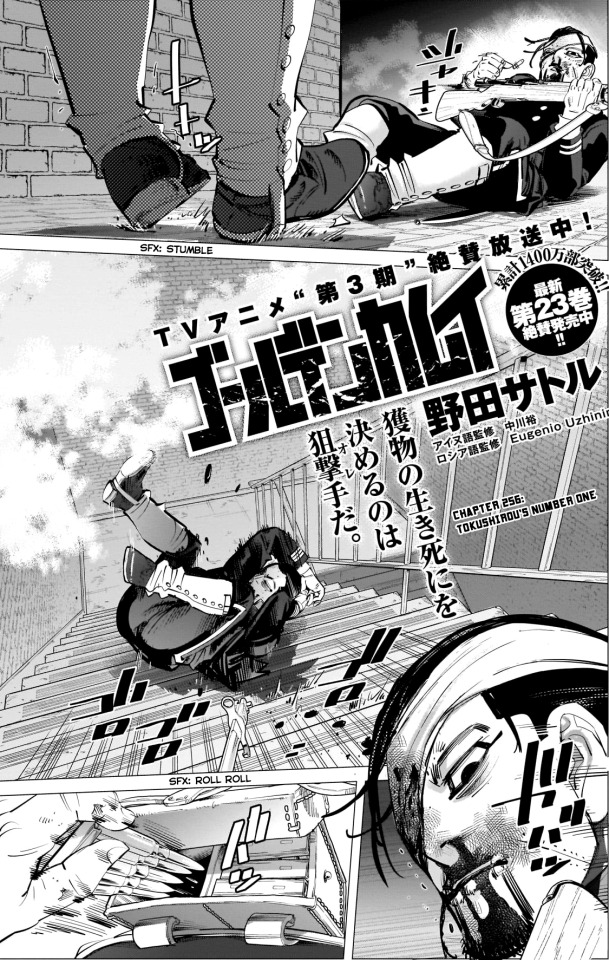
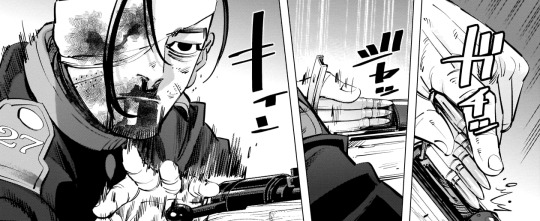
However, by the time he can approach the stairs and shoot again Usami has understood he has lost the upper hand and had escaped, leaving a trail of blood behind himself.
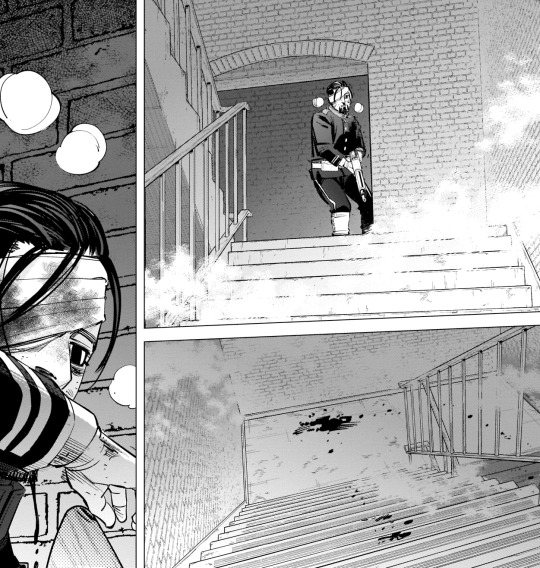
Usami’s wound his serious, as he’s bleeding profusely, panting and sweating and looking fatigued. Evidently Ogata has hit a blood vessel.
Knowing this could kill him and that he’s no more in shape to face Ogata, Usami decides he doesn’t have anymore the time to worry about Hyakunosuke (yes, he still calls him just by name, I wonder what kind of relation they used to have before all this mess) and that he has to hurry pass the skins and the info he collected to Tsurumi.
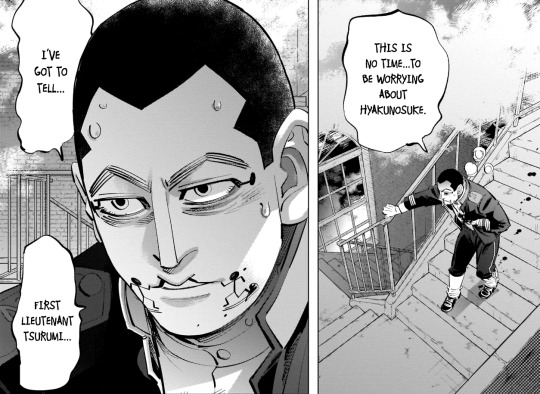
It took him a bullet that almost killed him to rearrange his priorities and understand his petty grudges weren’t so relevant after all.
Meanwhile, outside, Ueji is giving the firefighters hell by tugging the water pump and causing one to risk falling from the stairs. He also has knocked unconscious a firefighter and then begins to climb on their stairs, confusing all the remaining firefighters.
I guess the firefighters are really devoted to save lives so they couldn’t start waving those stairs really hard when he’s high enough and cause him to crash on the ground, possibly where the fire is. Pity.
Back to Usami, he has left the building and has spotted one of the carriages of the firefighters, and, more importantly, the horses attached to it which would grant him a fast escape.
At the same time we see again a scene from chap 255, the one in which Sugimoto tosses Ostrog off a window, remarking than rather than worrying about who gave birth to him he should have worried about what he lived for. This means this scene is happening at the same time as that one but it’s also a veiled remark to Usami who has dismissed Ogata as the mere son of a prostitute and ended up getting shoot by him… though I’ll say more than worrying about what Ogata lived for he should have worried about what Ogata could do.
But whatever, let’s go on.
Sugimoto tosses Ostrog out of the window, Ogata notices him falling and, below him, Usami running away on a horse.
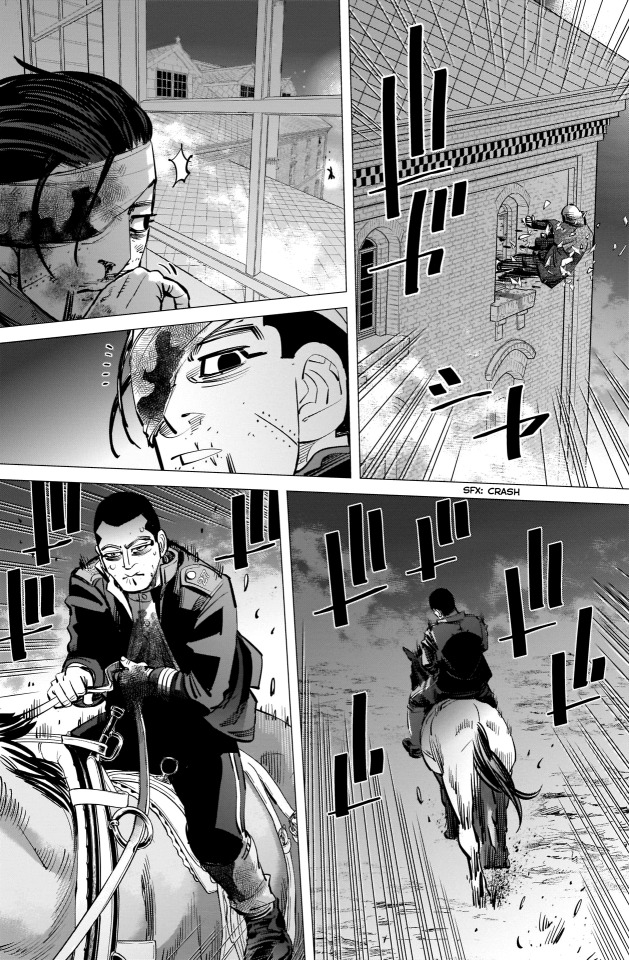
I’m surprised Ushiyama, who was right below that window, didn’t seem to notice Usami because it’s true he was turned toward the building but he should have heard the horse running but whatever, it’s not relevant.
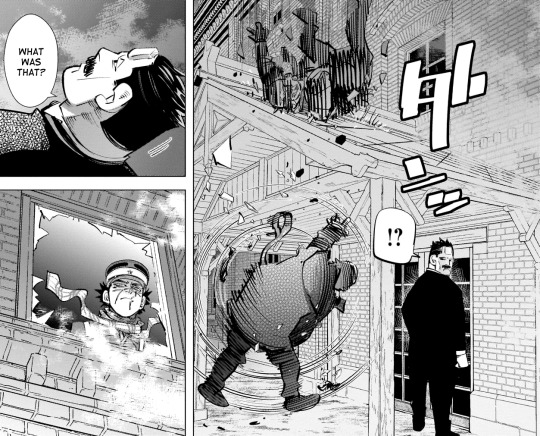
Ogata aims at Usami, saying that if Usami is really concerned about being or not a cheap piece he can discover the truth watching Tsurumi’s expression at his funeral.
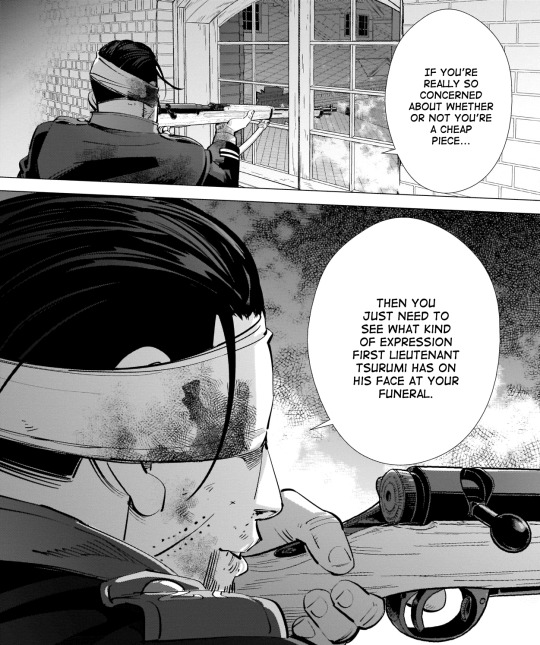
Now, Noda does a really clever thing here.
With a clever trick of panels seems to depict Ogata as having a chance to shoot Sugimoto through the window.
Maybe he does. Maybe he does not.
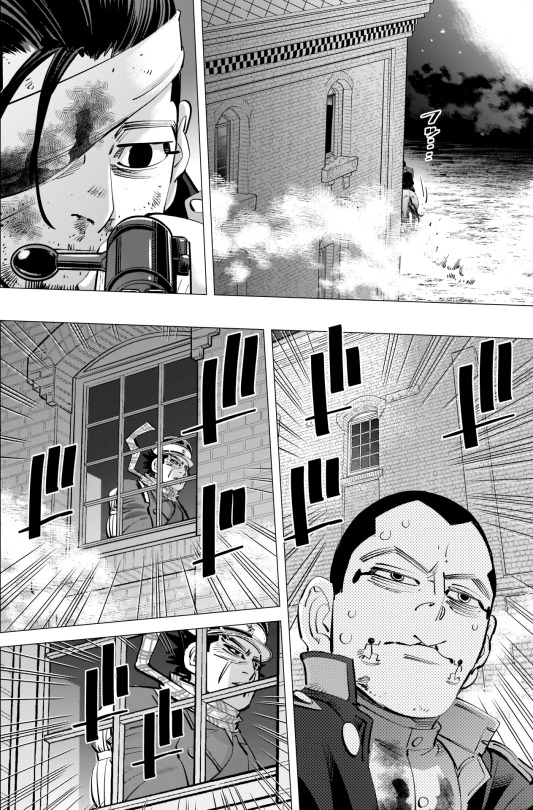
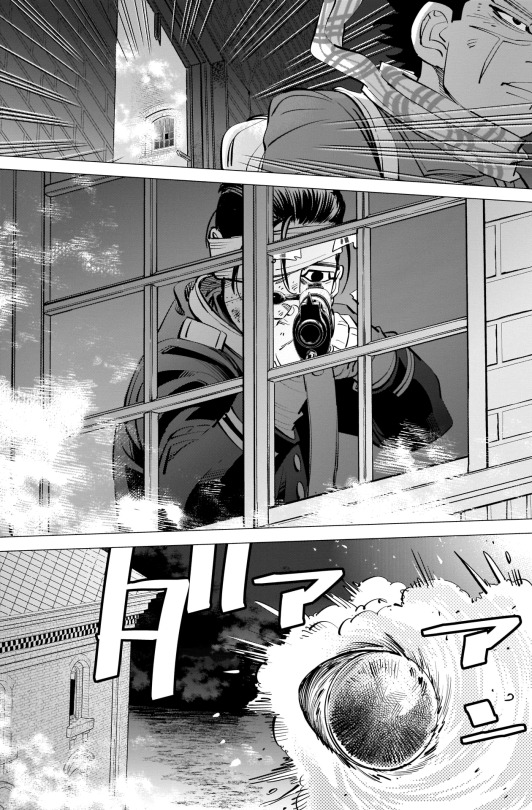
Actually not only it’s unclear if Ogata could see Sugimoto as the inside of the place isn’t exactly well light but Sugimoto has moved away already from the broken window and is near the close window above Usami.
Now… there’s something that puzzles me though and that is how, when Ogata shoot, Usami wasn’t visible anymore, as if he had already turned the corner, something that’s easily noticeable when we place the panel prior to Ogata shooting that was on page 8 and the panel in which Ogata shoots on page 9.
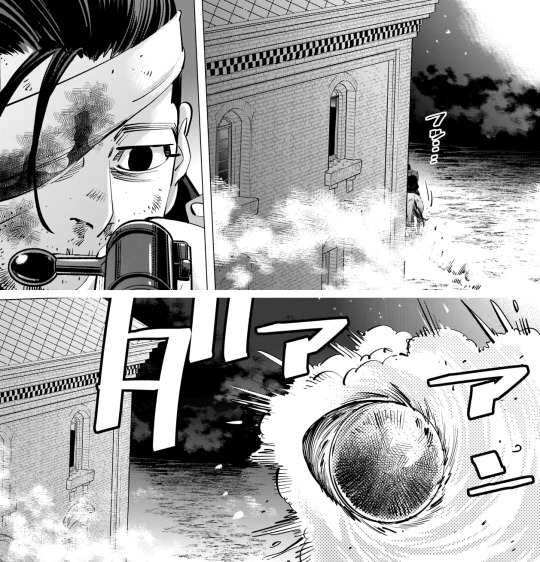
See? Usami has turned the corner and therefore is not visible anymore.
This makes me wonder if it’s possible Ogata’s bullet actually hit him because it went through the broken window and then out of the closed window (the one near which Sugimoto was standing) and, from it, through Usami.
This would mean that the panels showing the windows above Usami and near which Sugimoto is don’t actually aim to draw our attention on Sugimoto, who’s actually leaving the frame but on the window at which Ogata is, visible through it.
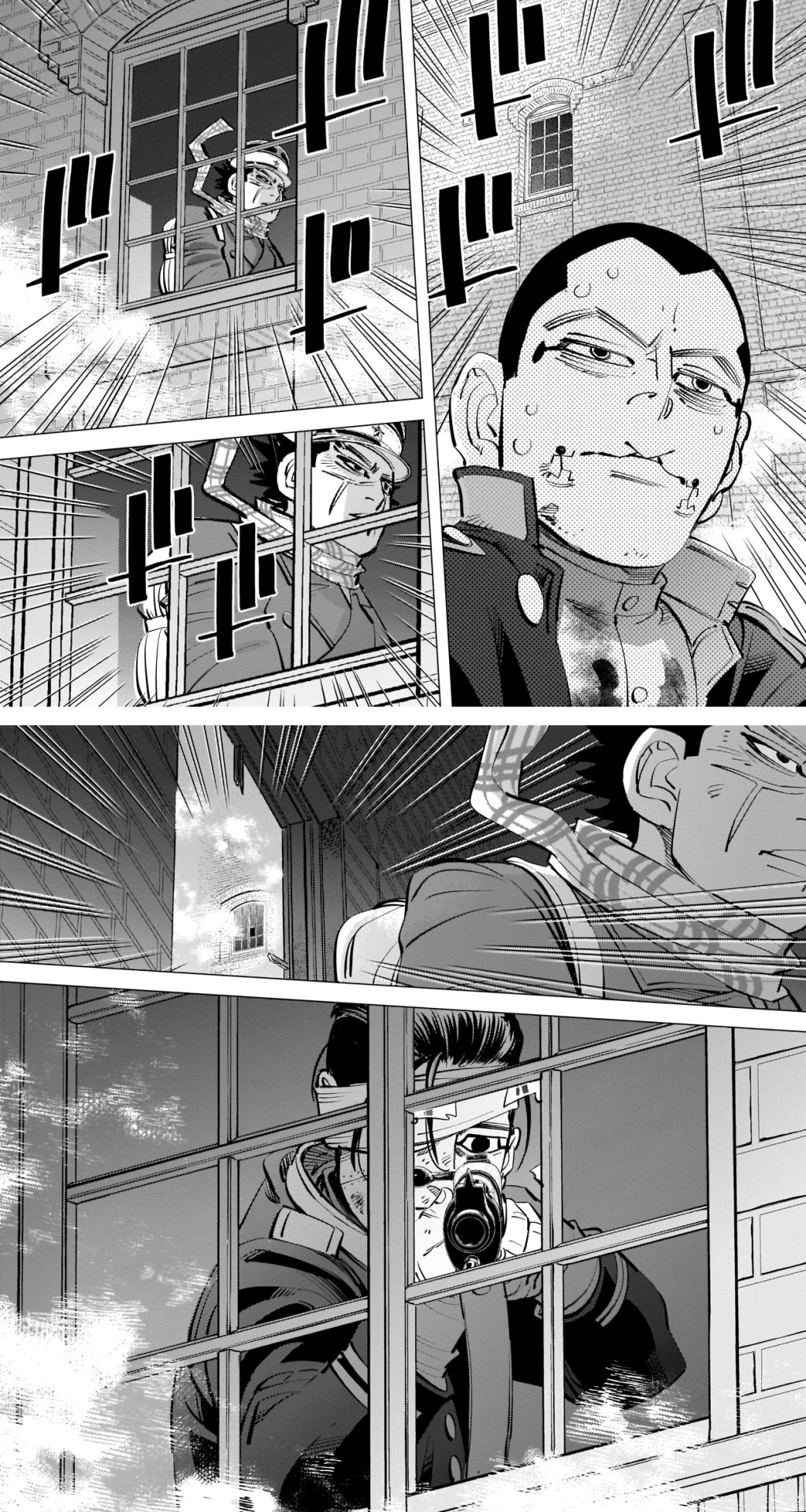
This would be an hellishly impressive shoot because Ogata basically hit Usami without even seeing him (or even more impressive if he could actually see him through those two windows), and what’s worse would alert Sugimoto of Ogata’s position there.
I doubt Sugimoto would realize Ogata shoot Usami and not him which probably would send him in another drunken rampage as we shouldn’t forget Sugimoto is drunk.
I’m not sure though, the scene will be probably cleared up in the next chapter.
Anyway Ogata’s bullet hits Usami perfectly. I think it went through his spine as Usami falls from the horse like a broken doll, his legs completely limp.
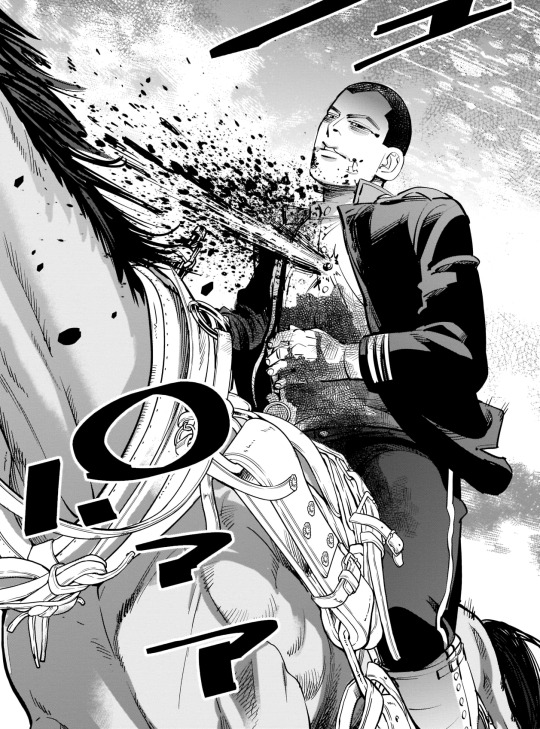
Luckily for him he falls in Tsurumi’s arms as Tsurumi coincidentally got there right in that moment, allowing Usami to see his beloved first lieutenant for his last few moments.
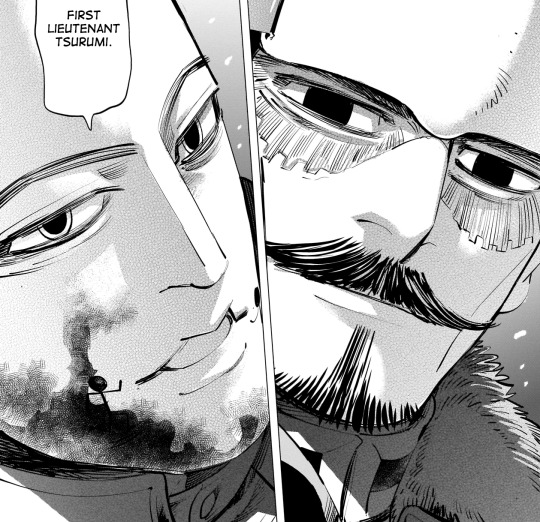
Meanwhile Ogata, who has no doubts he had hit the mark, has moved away from the window and thanking Usami as he believed killing Usami completed him as a sniper. As he says so he removes the bandages that were covering his face to reveal… not a scar or an empty eye socked but a new right eye. It immediately turns out it’s a glass one though, as it escapes his eye socket.
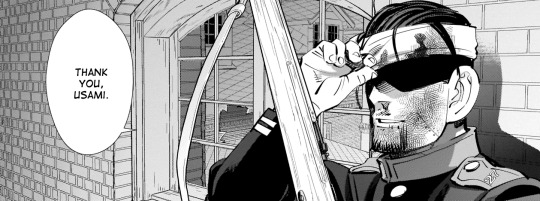
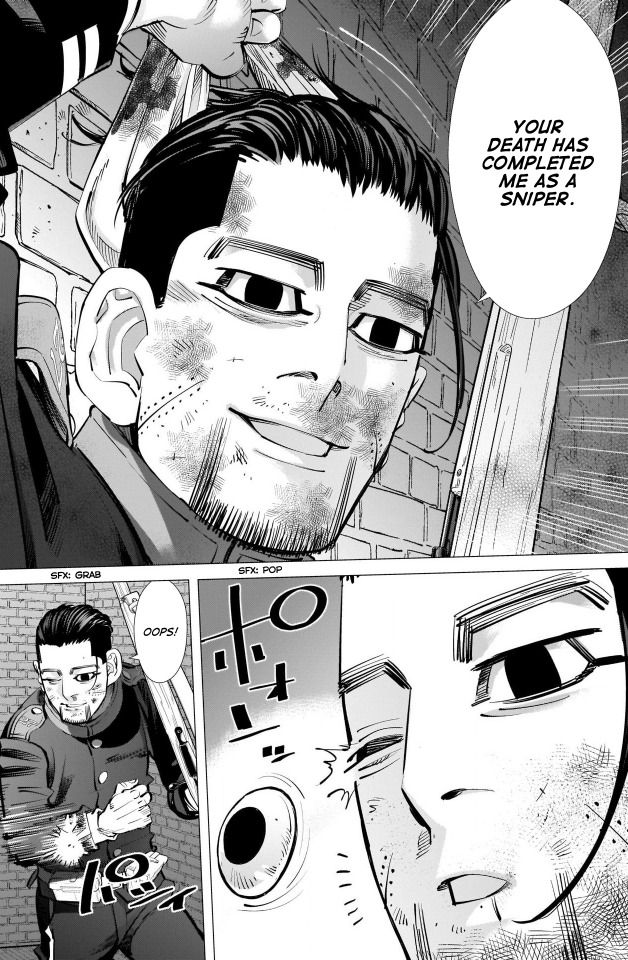
I guess Hijikata paid for it as Ogata seemed to be bankrupted when he got in Hokkaido. Ogata, still in a great mood, grabs it and will likely place it back.
I guess he wore the bandages as a personal way to tell himself he was an incomplete sniper and now that he feels he’s complete he removed them.
To all whose who wondered yes, it’s possible to remove an eye without leaving a huge scar as it’s easy enough to pop out an eye from its socket. I don’t encourage you to try doing it though.
Back to Usami he hands out the copy he stole to Kadokura and tries to say something to Tsurumi about Kadokura.
I’m not sure if he manages and we just don’t get to hear it or Tsurumi cut him out. We’ll see.
Tsurumi, slipping into the Niigata dialect, praises him (Tsurumi and Usami are both from Niigata). It’s worth to mention that vol 23 changed all the dialogues in the Tsurumi/Usami flashback so that the two of them were always talking in Niigata dialect. This, along with the ironic fact that vol 23 got Usami on its cover, ties this chapter to that flashback and explains the conclusion of their story.
At the praise Usami raises his hand toward Tsurumi, placing his little finger against his mouth. Tsurumi takes it in and bites it off.
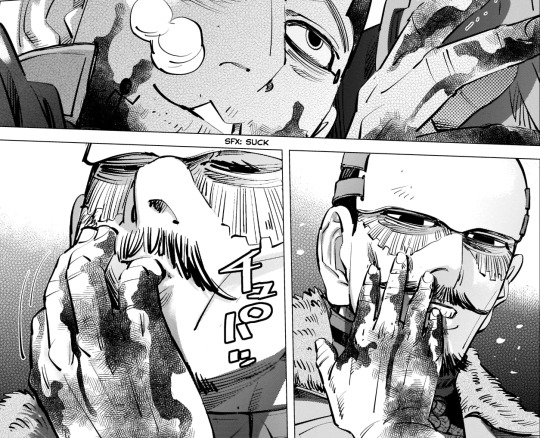
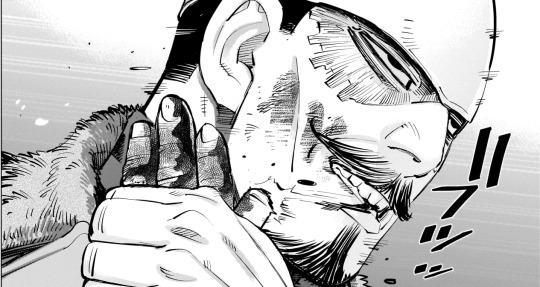
It’s the second time Tsurumi bites off a finger, the first being with Wada but, back then he spat it in Wada’s face (is Noda also about to bring back Wada’s death into the plot?).
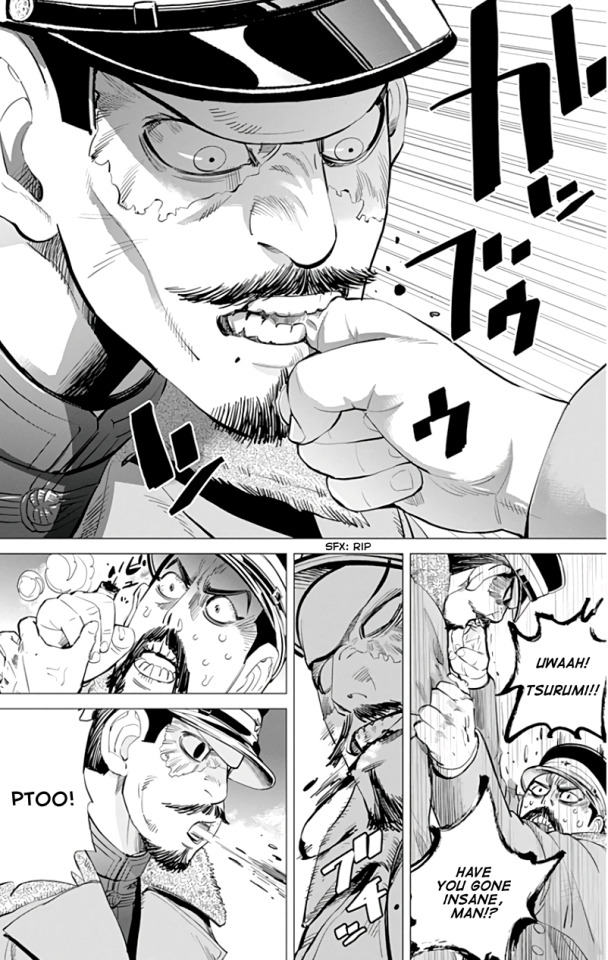
Now instead he implied he swallowed it (although no swallowing sound onomatopoeia is present) claiming this way the two of them will be together forever and that, like this ‘Tokishige-kun’ will live inside him forever (Tokishige-kun being how Tsurumi used to call him in the flashback) as his number one… friend.
‘Kore de watashitachi ha issho-ra suke. Tokishige-kun wa watashi no naka de ichiban no tomo to shite iki tsudzuken dare.’
これで私たちは一緒らすけ。時重くんは私の中で一番の友として生き続けんだれ
“With this we're together. Tokishige-kun will continue to live in me as my number 1 friend.”
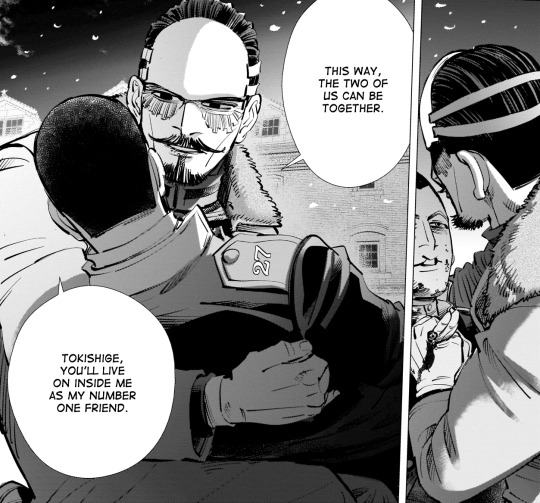
So yeah, Usami has been deeply friendzoned.
Well, actually ‘tomo’ (友) can also mean “companion”, “comrade” and, interesting enough, it seems that the word ‘uruwashiki tomo’ (麗しき友 “beautiful friend”) was speculated to refer to an homosexual relation in the past (though it’s currently not sure) so the word ‘tomo’ could give the impression of being something more than a friend to a Japanese person.
But whatever, I honestly don’t think Tsurumi had romantic feelings for Usami, he’s just using pretty words to put him at ease in his last moments.
Usami relies in the romance of the moment saying it makes him so happy he’s going to cum… because Usami is a man who knows what to do in romantic moments… as he does so he calls Tsurumi just ‘Tokushirou-san’ (篤四郎さん) as he used to do in the flashback.
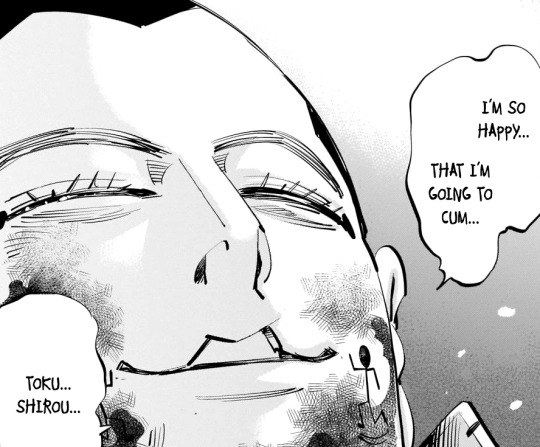
Tsurumi than takes the pose of the ‘Pietà’ (“Piety”; 1498–1499), a work of Renaissance sculpture by Michelangelo Buonarroti, housed in St. Peter's Basilica, Vatican City (which is beautiful but even more awesome up close, I can confirm as I went to see it and I recommend everyone to do the same), taking for himself the pose of the Virgin Mary while Usami is meant to be Jesus.
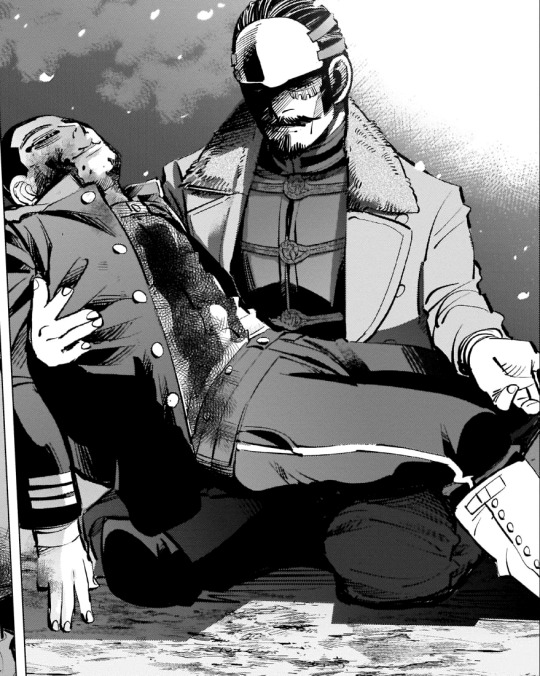

Please, let me shudder in horror at the idea… although Tsurumi likes to present himself as the Virgin which is highly ironic considering the whole discussion about immaculate conception taking place in the previous chapters. Is this Noda’s way to say that in a way it’s Tsurumi who gave birth to the Usami we know?
Does Tsurumi genuinely mourn Usami, whom he, after all, knew from when Usami was a child, in a time in which Tsurumi possibly was more emotionally stable?
In short, is Usami more than a cheap piece, as he longed for or Usami is feeding him another of his sweet lies because he has his men around and they’ve to think he cares about them?
Everything is possible as we should remember there’s another little finger Tsurumi took, and that one is the little finger of his wife. He apparently didn’t ate it but kept it with himself and she and little Olga are depicted as the reason why he became the way he is. So if he wanted to be one with someone I would expect him to wish to be one with them.
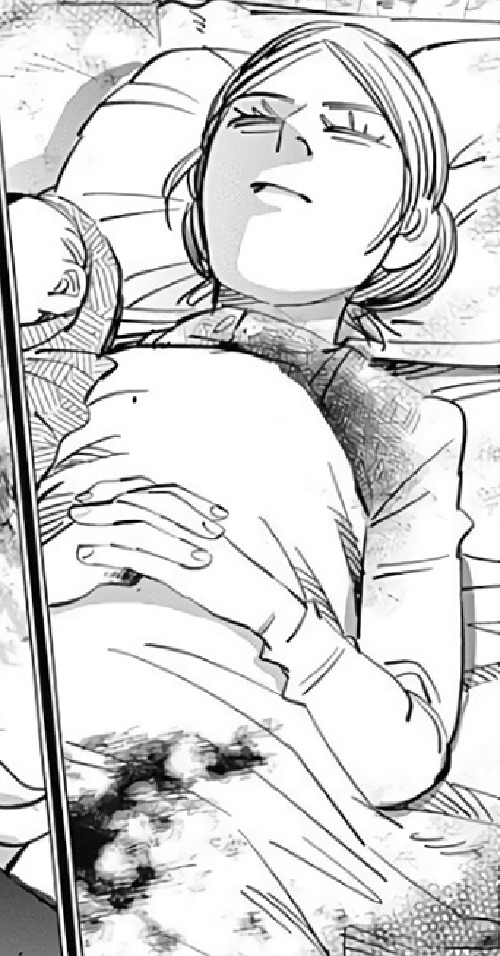
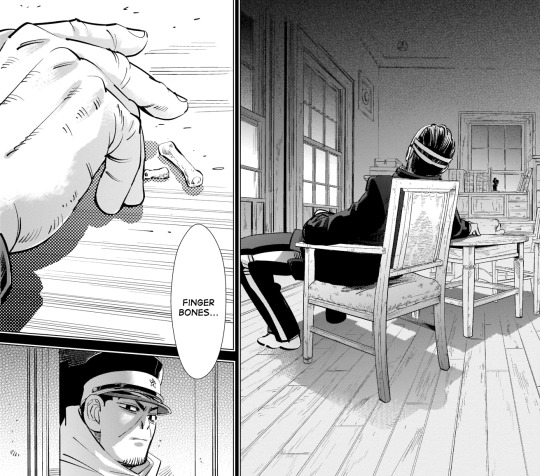
On another side, Japanese at the time differentiated the relationship they had with their wife with the relationship they could have with their male ‘friends’ so maybe Tsurumi might want to keep both.
I don’t know but I’m honestly skeptical about Tsurumi genuinely caring for Usami and it’s interesting how the last panel shows Tsurumi’s face completely in the dark as he moves close to Usami’s face, which is not smiling anymore. Is Usami dead already or he can still see? We’ll probably discover in the next chapter as Ueji interrupt the scene.
He managed to climb up a tall chimney and is calling everyone’s attention on himself… which would make this the perfect moment to shoot him. Ogata please, if you would? Vasily, you too, do something useful, please.
Anyway the chapter ends here.
Some last words of the pinky eating scene.
In Japanese the pinky is ‘koyubi’ (小指) the “little finger” and it’s a finger with interesting meanings.
The Japanese raises it to mean they’re talking about their girlfriend for example.
You’re probably also familiar with ‘Yubitsume’ (指詰め "finger shortening"), the Japanese ritual to atone for offenses to another, a way to be punished or to show sincere apology and remorse to another, by means of amputating portions of one's own little finger. That’s because the little finger was important in order to keep a good grip on the katana so losing it or part of it was a considerable weakness.
You might have heard also of ‘yubikiri’ (指切り, "finger cut-off"), the Japanese version of pinky swearing, often additionally confirmed with the vow ‘Yubikiri genman, uso tsuitara hari senbon nomasu’ (指切り拳万、嘘ついたら針千本呑ます “Finger cut-off, ten thousand fist-punchings, whoever lies has to swallow a thousand needles.”).
There are also sources that suggest the term pinky swear traces its history back to the early 1600s to mid-1800s. During this time, prostitutes were rumored to cut off their pinkies to give to customers they like. This grand yet bloody gesture signifies that they have developed affections for the customer and are willing to take their lives for them… which would basically compare Usami to a prostitute.
But there’s also a more romantic meaning to the pinky and that’s that how the ‘unmei no akaī ito’ (運命の赤い糸 “red thread of fate”) which is supposed to be an invisible red cord tied around the finger of those that are destined to meet one another in a certain situation as they are “their true love” is meant to be tied to the pinky.
You’ve probably read the notes the scanlators put at the end of the chapter so you are aware already of what ‘Honekami’ (骨噛み “Chewing the bone”) is and how it was practiced in Niigata. Now you also know why Usami might have wanted to encourage Tsurumi to bite away that particular finger and it wasn’t just a coincidental choice... and why being friendzoned might not feel so bad to him.
Well, that’s all for the chapter.
In the next we will probably discover what Ueji has to say, if Ogata really shoot Usami through the window Sugimoto was near to and therefore got his full attention and maybe if Tsurumi really cared for Usami and if Usami managed to deliver Kadokura’s secret… or if Ogata will discover it.
We’ll see.
Anyway with this chapter Usami leaves the cast.
He’s the third relevant character to leave the cast, after Kiroranke and Ienaga.
While he didn’t grow up to be a good person, but he actually went uninged as Ostrog, in a way I’m still sad for the little kid with light in his eyes that didn’t get to grow up as a normal person but got so wrapped up in his crush for Tsurumi he ended up murdering his best friend in jealous rage and then never managed to recover his mental sanity. Usami never managed to let go of his obsession, he only became worse.
It’s sad exactly because it could happen and it ruins a life forever.
#Golden Kamuy#Ogata Hyakunosuke#Usami Tokishige#Tsurumi Tokushirou#Sugimoto Saichi#Michael Ostrog#Golden Kamuy Ramblings and Theories#Ueji Keiji
76 notes
·
View notes
Text
TerraMythos 2021 Reading Challenge - Book 10 of 26
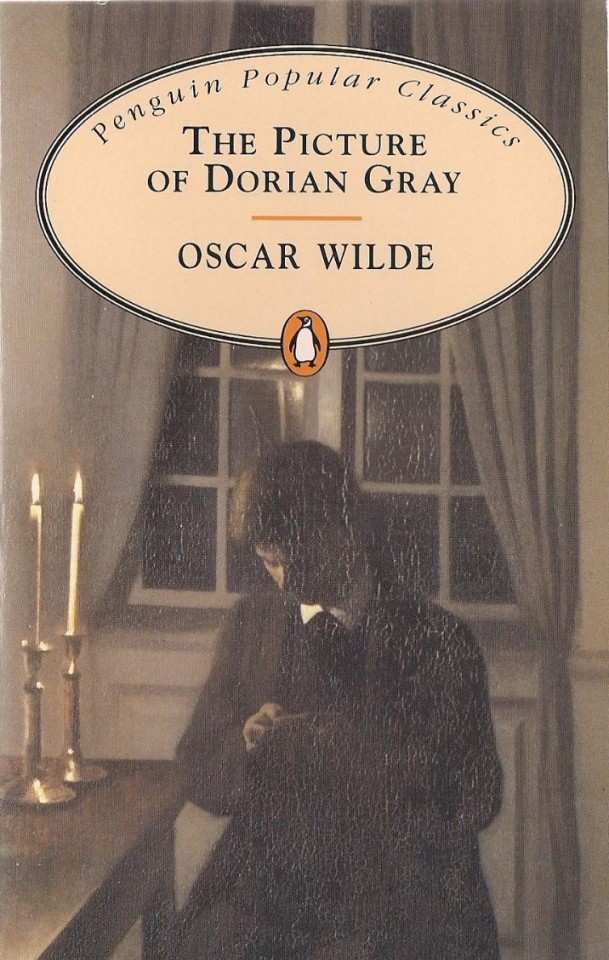
Title: The Picture of Dorian Gray (1890)
Author: Oscar Wilde
Genre/Tags: Fiction, Gothic Horror, Third-Person, LGBT Protagonist (I... guess)
Rating: 8/10
Date Began: 4/13/2021
Date Finished: 4/20/2021
When artist Basil Hallward paints a picture of the beautiful and innocent Dorian Gray, he believes he’s created his masterpiece. Seeing himself on the canvas, Dorian wishes to remain forever young and beautiful while the portrait ages in his stead. The bargain comes true. While Dorian grows older and descends a path of hedonism and moral corruption, his portrait changes to reflect his true nature while his physical body remains eternally youthful. As his debauchery grows worse, and the portrait warps to reflect his corruption, Dorian’s past begins to catch up to him.
Perhaps one never seems so much at one’s ease as when one has to play a part. Certainly no one looking at Dorian Gray that night could have believed that he had passed through a tragedy as horrible as any tragedy of our age. Those finely-shaped fingers could never have clutched a knife for sin, nor those smiling lips have cried out on God and goodness. He himself could not help wondering at the calm of his demeanour, and for a moment felt keenly the terrible pleasure of a double life.
Full review, some spoilers, and content warnings under the cut.
Content warnings for the book: Misogyny (mostly satirical). Racism and antisemitism (not so much). Emotional manipulation, blackmail, suicide, graphic murder, and death. Recreational drug use.
Reviewing a classic novel through a modern lens is always going to be a challenge for me. The world seems to change a lot every decade, let alone every century—whether some canonized classic holds up today is pretty hit or miss (sorry, English degree). And considering the sheer amount of academic focus on classic texts, it’s not like I’m going to have a “fresh take” on one for a casual review. I read and reviewed The Count of Monte Cristo last year, and thought it aged remarkably well over 170+ years.
Somehow I never read Oscar Wilde’s The Picture of Dorian Gray for school. I tried reading it independently in my late teens/early twenties, and honestly think I was just too stupid for it. Needing a shorter read before the next Murderbot book releases at the end of the month, I grabbed Dorian Gray off the shelf and decided to give it another shot. By the end, I was pleasantly surprised how much I liked the book.
I’m actually going to discuss my pain points before I get into what worked for me. The first half of the book is very slow-paced. The Picture of Dorian Gray is famous for… well… the picture. But it isn’t relevant until the halfway point of the novel, when Dorian does something truly reprehensible and finds his image in the picture has changed. There’s a lot of setup before this discovery. The first half of the book has a lot of fluff, with characters talking about stuff that happened off screen, discussing various philosophies, and so on without progressing the story. Some of this is fine, as it establishes Dorian’s initial character so the contrast later is all the more striking. I just think it could have been shorter. I realize this comes down to personal taste.
I’m also torn on the Wilde’s writing style. He’s very clever, and there are many philosophical ideas in his writing that did genuinely made me stop and think. The prose is also beautiful and descriptive; this is especially useful when it contrasts the horror elements of the story. However, there’s a lot of unnatural, long monologue in the story. Not sure if it’s the time period, Wilde’s background as a playwright, or just his writing style in general (maybe all three), but the characters ramble a LOT. My favorite game was trying to imagine how other characters were reacting to a literal wall of text.
I also feel the need to mention this book has some bigoted content, as implied in my content warnings. The misogyny in the story is satirical; it’s spouted by the biggest tool in the book, Lord Henry, whose whole shtick is being paradoxical. You just need basic critical thought to figure that out. However, some things don’t have that excuse. A minor character in the first half is an obvious anti-Semitic caricature. There’s also some pretty racist content, particularly when Wilde describes Gray’s musical instrument collection. While these are small parts of the book, it’d be disingenuous not to acknowledge them.
All that being said, there were many aspects of the book I enjoyed, particularly in the second half. Wilde does a great job characterizing terrible people who fully believe what they say. Lord Henry is an obvious example, and Dorian follows his lead as the story progresses. One of my favorite bits was after Sibyl’s suicide (which Dorian instigated by being a piece of shit). Dorian is initially shocked, but as he and Lord Henry discuss it, they come to the conclusion that her suicide was a good thing because it had thematic merit. It’s just such a brazen, horrible way to alleviate one’s guilt.
Dorian also goes to significant lengths to justify his actions. At one point, he murders Basil to keep the portrait a secret. While he briefly feels guilty about this, Dorian grows angry at the inconvenience of having killed this man, supposedly an old friend. He even separates himself from the situation, expressing that Basil died in such a horrible way. Bro, you killed him! It was you! The cognitive dissonance is just stunning.
It’s also viscerally satisfying to read about Dorian’s downfall as his awful choices catch up to him. Dorian becoming tormented by the portrait is just... *chef’s kiss*. Is it surprising? No, it’s pretty standard Gothic horror fare. But there’s something to be said about seeing a genuinely horrible man finally pay for what he’s done after getting away with it for so long. I wish real life worked that way.
There’s the picture itself, too. I know it’s The Thing most people know about this novel -- but I just think it’s a cool concept. I like the idea of someone’s likeness reflecting their true self, and the psychological effect it has on the subject. Most of the novel is fiction with realistic horror elements, but I like that there’s a touch of the supernatural thanks to Dorian’s picture. It’s an element I wouldn’t mind seeing in more works.
It's sad to read Dorian Gray with the context of what happened to Wilde. The homoeroticism in the novel is obvious, but tame compared to works today. Wilde and this book are a depressing case study in how queer people are simultaneously erased and reviled in recent history. Wilde was tortured for his homosexuality (and died from resulting health complications) over 100 years ago, yet the 1994 edition of Dorian Gray I read refers to his real homosexual relationship as a "close friendship". It's an infuriating and tragic paradox. Things have improved by inches, but we still have so far to go.
As I grow older I find I appreciate classic works more than when I was forced to read them for school. The Picture of Dorian Gray is a gripping Gothic horror story. Some aspects didn't age particularly well, but that's true for almost anything over time. If you're in the market for this kind of book, I do recommend it.
#this review is late but in my defense the nier remake came out#taylor reads#2021 reading challenge#8/10
9 notes
·
View notes
Text
Episode 11: New Believer, New Faith, and a New Vow
2/7/2021
- 1 -
Good morning! It’s a beautiful Sunday here in Las Vegas. I have much to talk about so I’m just going to get right into it.
It’s hard to believe we’re already a full month into the new year. This year for me has been very rewarding thus far. For starters, I have had no trouble keeping up with resolutions 1 and 4. (For a refresher, you can scroll back through my previous posts to the one from New Year’s Eve.) I have found time each day to read my Bible and pray, and I have had little difficulty in maintaining a pleasant attitude and a smile in my daily encounters with my co-workers and customers. As expected, though, that latter one has been tested a few times by the occasional sour apples that woke up on the wrong side of the bed. But I’ve surprised myself every time by my patience and my ability to keep a calm and pleasant demeanor. (Those of you who have known me for a long time will understand how truly remarkable that is for me.) It’s simply another testament to the power of God to change our basic attitudes when we are willing to let Him.
I’ve also made great strides in resolution #3, and that’s where I’m going to spend the bulk of my time on this post.
Have you ever sought something – therapy, a particular medication, advice from a friend or colleague – thinking that it might help with one problem, only to be pleasantly surprised that one, the result helped in many other ways you hadn’t anticipated; and two, that the change/outcome/counseling exceeded your initial expectations by such a great magnitude that you couldn’t believe you hadn’t sought this help long ago? That feeling has been with me for over three weeks now, and it’s only getting better with each session.
One of my first tasks in tackling resolution #3 was to consult a pastor on this issue of homosexuality and the Bible. I needed to know what God really said in His Word on this controversial topic, and since I have yet to find a home church here in Las Vegas the only pastor that I am casually acquainted with is Mark Sjostrom of the church in which I was born and raised back in Twin Falls, Idaho.
For those of you unfamiliar with Twin Falls or this particular church, allow me to forge a brief rabbit trail here to give you a short history. Grace Baptist Church was founded in 1975, and, back then, it was just a one-story, oblong, red-bricked building, its main auditorium forming a bubble at one end, at the intersection of Eastland Drive and Falls Avenue on the eastern edge of town. It’s still that same building today, only now there’s a massive, two-story gymnasium/classroom on the other side of the back parking lot, and a third, smaller, two-room annex that sits behind the gym. The first of those latter two structures was needed in the early eighties when the church launched its own private school, Twin Falls Christian Academy. I was in kindergarten when the gymnasium was under construction. I have many memories of watching my dad and some of the other men in church up on the scaffolds, putting together the walls, while I waited for my mom to pick me up after school, which was held in the various Sunday school rooms in the church. A few years later, I would be attending high school in the classrooms above that gym.
In the years since I have grown and left Twin Falls, I have come back to that church on the occasional Sunday morning worship service when I’m home for a vacation visit. I’ve always had mixed feelings every time I set foot beyond the threshold of its main doors (see my previous posts about my struggles during my teen years.) It’s the same feeling you get when you come back to something that is at once familiar and strangely comforting, but also brings with it unpleasant memories and the pain of old wounds that have never quite healed.
Grace’s pastor since 2005 has been Mark Sjostrom (pronounced ‘shos-trum’), and I didn’t know him that well when I decided to consult him on this issue. Our only interaction thus far had been a brief handshake and a greeting after those sporadic Sunday morning worship services, and I wasn’t sure he would even remember me when I nervously texted him a brief ‘Hello’ a month ago. He responded within a few minutes, and I re-introduced myself and then gave a short explanation of what I needed. We agreed on a time and date for a phone call, and I emailed him the next day with a longer explanation of what I needed to talk about with him.
That letter was a somewhat detailed account of what most of you are already familiar with: my struggle in high school with keeping my secret of being gay while trying to fit in socially and eventually declaring myself an Atheist after being expelled from school my senior year a month before graduation. It was probably about 2 pages, and I was now very nervous after clicking the ‘Send’ button. I suppose now is a good time to tell you something else about me.
I have been one of ‘those people’ for all of my adult life. You know who I’m talking about: the people who silently judge the other customers in the book store who pause to browse the Self Help section; or the people who quietly scoff when anyone talks about their latest therapy session with their friends or coworkers at lunch in the break room. I’m glad I don’t need self-help or therapy, I’ve always thought. But, then again, good for them, I guess. I’m glad I have all my issues worked out, and I’m a stable, normal adult. I’ve never had any issues that were so bad I needed to get help from an armchair counselor’s latest best seller or a psychiatrist’s couch.
Hhmmm. My life, lately, has been chock full of irony.
When the time came to dial Pastor Sjostrom’s number my level of nervousness was up to a ten out of ten on the anxiety scale. I hadn’t felt like this since high school when it was opening night of our Agatha Christie play, and I was one of the main cast. I had prepared a detailed outline of what I wanted to discuss, and, after a few initial pleasantries, Mark quickly put me at ease. I was pleasantly caught off guard by his relaxed, casual personality. I found immediately that he was very easy to talk to, and my anxiety level dropped to a ‘three’ in the first five minutes. Pastor Sjostrom is definitely one of those people who has found the right calling. His warm, personable demeanor made me feel like I was talking to an old friend over coffee at Starbucks, and after about ten minutes of getting to know one another, he brought the conversation back around to my letter.
Here’s where my second surprise occurred. Mark was bluntly honest. I had told him that I believed I was saved in 1985, when I was seven, after the evening service of one of our church’s mid-summer week long revival meetings. “Neal,” Mark said rather pointedly, “after reading your description of your life after high school, I gotta say that it doesn’t sound like you were saved. Your behavior and your atheism doesn’t reflect the change that is described in the Bible.” He went on to explain that salvation is a change brought about the presence of the Holy Spirit in the new believer. There is a desire to learn more about God and His Word. There is a desire to serve him and to live one’s life in surrender to Him.
I had to pause and think about that. And, doggone it, you know what? He was right. And the reason I knew that was because I had only to look at the last four months of my life, even more so since I had returned from Christmas vacation. That desire – that hunger – to know God had never been present in my life until September 17, 2020. That was the night I surrendered to Christ in an awkward, fumbling prayer on the way home from work. Ever since, I have had nothing but a desire to read my Bible and change my life. I told pastor this, and he agreed. It was evident now that I was truly saved. That evidence was lacking in my youth and my adult life up to this point.
My third major surprise of that initial counseling session – yes, that was what is was – was when pastor told me he was assigning me homework for our next weekly conversation. He wanted me to read the book of 1 John. He explained that we would eventually get to the issue of homosexuality, but that we needed to cover this ground first. I agreed to the assignment, and we hung up. I glanced at the clock in the upper corner of my computer screen. We had talked for almost an hour. I immediately reached for my Bible and opened it to 1 John. I read the whole book in about ten minutes.
1 John is a primer for the new believer. John states clearly and succinctly what makes a Christian a Christian. Chapter 1:9 was immediately familiar to me from my Sunday School days: “If we confess our sins, He is faithful and just to forgive us our sins, and to cleanse us from all unrighteousness.” So was chapter 2:9: “He that saith he is in the light, and hateth his brother, is in darkness, even until now.” John goes to say in chapter 5:2: “By this we know that we love the children of God, when we love God, and keep His commandments.” And, finally, verse 20 of that same chapter: “And we know that the Son of God is come, and hath given us an understanding, that we may know Him that is true, and we are in Him that is true, even in His Son Jesus Christ. This is the true God, and eternal life.”
Yep. All of that book made perfect sense. Part of that was because I had absorbed so much of God’s Word in my youth that it had sat in the deep recesses of my brain for all of my life, and much of it had begun floating to the surface in the last several months – like debris from an ancient wartime submarine that has been recently dislodged from its ocean grave. Except that these artifacts – Bible verses, fragments of sermons, some of Mr. Walker’s proverbs from Bible class – were not dirty, soggy, disgusting relics. They were bits of priceless treasure, and I’ve been rediscovering them in dribs and drabs ever since.
I have had three sessions with Pastor Sjostrom, and they are each the highlight of my week. I very nearly broke down after hanging up from our first talk. I felt a combination of immense relief, peace and calm. Not to be overly melodramatic, but it was if something had dislodged in my very soul, like a sliver of wood just beneath the skin that has never quite come all the way out. I realized with immediate clarity that I was getting far more than just a pastor’s opinion on a particular issue for my book. I had stumbled on to something else, something I needed far more: spiritual counseling and guidance for my new life as a child of God.
I am a new believer.
That seems so strange to say out loud. I was raised in the church. I had at least a third of the Bible memorized by the time I was twelve. I knew all the major stories from the Old Testament – the creation of the world; God’s covenant with Abraham; Jacob, Esau and Isaac; Joseph sold into slavery into Egypt and God’s eventual deliverance of the Israelites from their captivity there; the introduction of the ten commandments and the Mosaic Law; Esther, Ruth, King Saul, David, the Book of Psalms, the prophet Isaiah – I knew all of it by heart by the end of my days in elementary school. Same for the New Testament – the birth of Christ; all of His teachings and parables; His death on the cross; His resurrection after three days; the founding of His church after His ascension back to Heaven – it was all as familiar to me by the time I walked away from high school as the mathematical precepts of basic addition, subtraction, division and multiplication.
I had assumed all this time that I was still saved. I thought I had really, genuinely believed in Jesus as my savior that long ago night in 1985 when I was seven years old. And maybe I did. But, for whatever reason, the Holy Spirit had not come into me back then. I was not truly saved. (This is perhaps worthy of a more detailed discussion and analysis later on down the road.) Whatever the case, I am most definitely a new believer now. The Holy Spirit is alive and well within me, and I have only a single desire and purpose: to know the God that created me, and to serve him with all my heart, soul and mind.
Pastor and I did discuss my homosexuality issue in our second talk, and that, along with the extracurricular reading I’ve been doing on this topic, has enabled me to finally reconcile what I couldn’t in my teen years when I first fought with this problem.
- 2 -
If I am gay, and God – through His written word – has condemned what I am as a sin, how can I be His child and serve Him as he commanded me to do? That’s the question I’ve been wrestling with anew for the last few months. I began this new journey in last September with the premise that I was born gay. I’ve believed that my whole adult life. I proceeded from that assumption through all of my reading and research these last few weeks. But if God made me this way, why would He then condemn as an abomination the very thing that I am? Is He not contradicting Himself? How can this be?
Pastor Sjostrom asked that very question in our second talk. He then went on to answer it by explaining that my unnatural desire for the same sex was a cause of the Fall, when Adam and Eve disobeyed God and ate of the Tree of Knowledge of Good and Evil. This is what led their descendants to the sins of idolatry, fornication, sexual perversion, and many, many others. Yes, I was born gay. But that’s not how God made me. There’s a very distinct difference.
His explanation corroborated what I have come to discover in the last couple weeks as I’ve read Two Views on Homosexuality, the Bible, and the Church from the Counterpoints series. Author and editor Preston Sprinkle gathered four prominent Christian authors, scholars, and theologians to discuss this issue – two for and two against. I will not go into great detail of what these authors debate and discuss, mainly for the sake of page and time, but also because this issue is not anywhere near as complicated as it seems.
All four of the contributing authors to the Two Views book have used the following Bible verses/passages as the foundation of their arguments:
1.) The creation story in Genesis 1 and 2.
2.) Genesis 19:4-11 (Sodom & Gomorrah)
3.) Leviticus 18:22 & 20:13
4.) 1 Corinthians 6:9-11
5.) 2 Corinthians 5:17
6.) Romans 1:18-32, emphasis on verses 26-28
7.) 1 Timothy 1:9-10
Those authors have also drawn from extra-Biblical material such as the writings of Philo, a Jewish historian who was a contemporary of the apostle Paul; the Apocrypha; the writings of Saint Augustine; and various other books – most written in the last 50 years – on sociology, sexuality and anthropology in the ancient world.
Here’s an example of one of one of the arguments for the church’s endorsement of homosexuality. One of Two Views’ contributors, Megan Defranza argues that there were many people in Biblical times that were born with no distinct male or female genitalia or other defining sexual characteristics. These “intersex individuals” were often referred to as eunuchs by the people of that time, and many of them were used as sex slaves. Megan claims that Genesis 1 is “…a theological account describing creation in broad categories, not an exact scientific inventory of all of God’s good creatures.” She goes on to say that Adam and Eve were not the exclusive, ideal models for all of man and womankind. They were, rather, just the broad categories; that the birth of eunuchs and other such of types of intersex people prove that God would welcome the church’s acceptance of gays, lesbians and transgenders since they have been born that way, and their sexual desires are natural to them. She claims that God was not condemning the eunuchs and other similar people in those verses/passages I listed above. Those condemnations were for the ones who had turned deliberately turned away from God to worship idols and indulge their sinful lusts.
There’s a lot more detail to Megan’s argument, especially regarding the eunuchs and their forced sexual slavery to their male masters, but it’s not worth going into here. The other three contributing authors give similar arguments, citing external sources in addition to scripture, to support their particular view. Wesley Hill and Stephen Holmes, the two that are opposed to the church’s condoning of homosexuality and gay marriage, give the stronger of the four arguments. Two Views opens with Megan’s and William Loader’s essays (the other author who falls on the affirming and open acceptance side of this debate), but by the time I reached the end of their arguments, I already knew which side of this issue I was going to fall on.
Wesley Hill and Stephen Holmes – as well as Pastor Sjostrom – present a much stronger, sounder case for why the Christian church, no matter the denomination, should be condemning ALL forms of homosexuality as clearly as God does. My own Bible reading and prayer showed me this after only a few weeks. I don’t really need to read all the other books on this topic to know the truth. To be completely honest, I had a pretty good idea of what the end of this journey would look like before I even started it. All the verses from Genesis, Leviticus, Romans, 1st and 2nd Corinthians, and 1st Timothy that deal with this specific issue are quite clear. It is stated over and over: homosexuality is a sin in the eyes of God. Paul stated it best in 1 Corinthians 6:9-11:
“Know ye not that the unrighteous shall not inherit the kingdom of God? Be not deceived: neither fornicators, nor idolaters, nor adulterers, nor effeminate, nor abusers of themselves with mankind, nor thieves, nor covetous, nor drunkards, nor revilers, nor extortioners, shall inherit the kingdom of God. And such were some of you: but ye are washed, but ye are sanctified, but ye are justified in the name of our Lord Jesus, and by the Spirit of our God.”
That word “effeminate” in the KJV is translated from the original Greek word that Paul used: arsenokoitai. This is a compound word: arsen – male; koite – bed. “Male bedders”, in other words; those men who sleep with other men. In the NIV translation, the word “effeminate” is replaced with the phrase “men who sleep with other men”. The only other passage that Paul uses that word is in 1 Timothy 1:8-10 (NKJV):
“But we know that the law is good if one uses it lawfully, knowing this: that the law is not made for a righteous person, but for the lawless and insubordinate, for the ungodly and for sinners, for the unholy and profane, for murderers of fathers and murderers of mothers, for manslayers, for fornicators, for sodomites, for kidnappers, for liars, for perjurers, and if there is any other thing that is contrary to sound doctrine…”
The meaning of these two passages is quite clear: those that practice any or all of those sins listed will not inherit the kingdom of God. They are not true believers and followers of Christ. And thus, any church that not only allows its homosexual members to remain in their sin, but also performs gay marriage, is not a true church of God.
And such were some of you.
God has commanded those that follow Him and declare His name to turn from their wickedness and be transformed. Those that believe on His name and repent of their sins will no longer practice those sins listed in the passages I quoted above. That’s the meaning of the phrase, “…and such were some of you.” Well, I have definitely been transformed. I can feel the Holy Spirit working in me. And, because of that, I have no other choice. If I am to be faithful to my Lord and Creator, if I surrender myself completely to His will, I must take a vow to turn away from my sin nature. I cannot indulge in the “lusts of the flesh”, as Paul says in Romans, if I am to call myself a true Christian. I am now a child of God, and His will alone must govern all I say and do.
But, even more important than those passages I listed and quoted above, is the book of Genesis, chapter two. God created Adam first and then He decided it wasn’t good for man to be alone. So God made the woman out of Adam’s rib, and he called her ‘Eve”. Then, in verse twenty-four, God said, “Therefore shall a man leave his father and his mother, and shall cleave unto his wife: and they shall be one flesh.” This chapter, more than any other passage in the Bible, clearly and explicitly demonstrates what God had intended from the very beginning. The only natural desire of the flesh was for the opposite sex: man for woman and woman for man. That was God’s original plan.
Unfortunately for us, Adam and Eve did not resist the serpent’s temptation to eat of the Tree of Knowledge of Good and Evil. After the Fall, their perfect, pure natures were corrupted by sin, and that corruption was passed unto their children, and their children’s children. Part of that corruption was the perversion of the natural, normal sexual desire. Men lusted after men and women for women. Even though the subsequent passages in Genesis which describe mankind’s deplorable state before the Great Flood never state it specifically, it is not unreasonable to assume that more than just homosexuality was a problem. Bestiality, pedophilia, rape and incest were very likely abundant among the first few generations of man, as well as the worship of false idols and complete rejection of God. Why else would God have felt the need to punish his creation by wiping them from the face of the Earth, save for Noah and his family?
As the old saying goes, ‘God made Adam and Eve, not Adam and Steve’. I’ve always hated that pithy, snarky retort whenever I had to defend my sexuality to anyone who tried to tell me I was living in sin. But it’s true. God created only Adam and Eve; not Adam and Steve; not Melissa and Eve; not Adam, Eve, and some other non-gender, non-binary person.
Just Adam and Eve.
Man and woman were joined in holy matrimony and, until the Fall, they lived in perfect peace and union with their Lord and Creator. Anything that deviates from that original, holy standard that God still demands of His children today, is a sin. That includes homosexuality, bestiality, pedophilia, incest, idolatry and devil worship, to name a few. Anyone that willfully practices or engages in any of those things and does not repent cannot call himself a true believer in Christ. Nor can any church that not only openly endorses homosexuality but also performs gay marriage can call themselves a true church of Christ.
So then, what now? If I accept that my sexuality is a byproduct of my sin nature, and that God, in fact, did not make me this way, how can I best serve Him? I’m still gay. That hasn’t changed. (And, yes, I’m sure. I’m watching last week’s episode of The Resident as I write this. Matt Czuchry and Manish Dayal are among the best male eye candy on TV right now.) I still desire a physical relationship with another man. (Either of the aforementioned actors would be especially nice.) But that desire – as well as the act – is a sin. God has made that clear in his Word. After some more talk with Pastor Sjostrom, I finally came to an answer – or, at least, part of one.
- 3 -
I mistakenly assumed that after I asked Christ into my heart, after I surrendered myself to God, that my sin nature would be transformed. I thought what many torn, conflicted gay Christians and their family have thought: with enough prayer, genuine repentance, and strong faith I would no longer be a homosexual. God would change my unnatural desire, and I would be sexually attracted to women instead of men. I would throw out all the symbols of my gay pride that I had collected over the years – t-shirts, bracelets, baseball caps, the rainbow colored Apple watch bands – and I would begin my new life as a heterosexual man. 2 Corinthians 5:17: “Therefore if any man be in Christ, he is a new creature: old things are passed away; behold, all things are become new.” Yes, it would be hard at first, but God and I would make this work, glory hallelujah amen!
But that’s not how salvation works. Yes, there was a transformation, but not quite the kind that I was expecting. It’s hard to put into words exactly what I felt in the weeks and months following that quiet prayer on that car ride home from work late the night of September 17, 2020. I knew for sure that something was different. To begin with, there was an almost instant peace and calm that settled over my entire being. All the anxiety, the fear, and the worry about the state of the world around me that had been plaguing me for many weeks melted away. In its place was a quiet, firm assurance that, no matter what happened from then on, I was in the hands of God. He would take care of me.
And then, in the days and weeks that followed that moment of salvation, I began to feel more than just spiritual peace and tranquility. The first was a hunger – an insatiable, ravenous desire to read my Bible. I had only the app on my iPad, and I started with Genesis 1. Every night, before bed, I would read two or three chapters. And then I would pray. It was awkward and nothing like the prayers that I heard time and again from my dad or my teachers in high school or my pastor back then. I stumbled over my words, I repeated myself, I kept forgetting what I wanted to say. And I still felt weird doing it. It was like I was talking to myself. But I kept praying nonetheless.
Gradually, as Christmas loomed closer and closer, and the more I read my Bible and talked to God, I felt something stronger inside of me. But it wasn’t anything physical, like an emotion. It was…something else, something in my soul. I imagined this new feeling as a few drops of red ink falling into a bowl of clear water. At first, the drops fall straight down, coloring only a little bit of the water. But then the ink begins to slowly spread, crimson tendrils that stretch outwards, eventually turning the whole water into the color of blood. That’s what it felt like was happening inside of me. My soul – the very thing that made me me was being changed from the inside out. And it felt damn good!
It was after my Christmas vacation, after ten days of rest and relaxation with my family in Idaho, that I noticed an even bigger change. When I returned to the daily grind of my two jobs, I realized that my whole attitude – and, by extension, my whole outlook on life – had been transformed. I was no longer the angry, anxious, frustrated, fearful man that was always pissed about something – usually the people who were my customers. Before, I was short tempered, impatient, always inwardly complaining whenever those around me were being difficult or annoying me in some way. Now, however, I was at peace. The difference in my new attitude from the old was as glaring as night from day. I greeted my customers with a smile. It was no longer an effort for me to be patient with the difficult ones. Nor did I feel the need to rant and rage on social media about the problems of the world, as I had been doing practically non-stop before I became saved.
It was like being wrapped inside joy, as if joy was something tangible – like a big, soft, warm blanket fresh from the dryer. I had to constantly check my reflection because I was sure I had a giant, stupid grin on my face all day long. And that feeling only got stronger the more I continued to read my Bible – now an actual book that I had bought from Amazon – and pray. That, too, was getting better. I no longer stumbled over my words or forgot what I wanted to say. The hunger to know God, to build a new relationship with my Creator, overshadowed everything else in my life. I lost interest in many of the things that had once taken up all my time, like watching TV or playing video games. All I wanted to do every night when I got home from a busy day was to open God’s Word and keep reading.
But there was one thing that didn’t change during all of that wonderful transformation. I’m still gay. The desire for that sin is still there, as strong and lustful as ever. Everything else about me seems different. I am, indeed, a new creature in Christ. So why am I still gay? Why is this particular thorn still lodged firmly deep in my flesh?
I still don’t have an answer. But I do have a theory. The transformation of the new believer in Christ is not like wiping the old operating system of your ten year old iMac. With a computer you can install a whole new operating system that’s free of the bugs, viruses and malware that plagued the old system. The hardware is still the same old hardware, but the software is brand new. Your computer has been transformed. It performs and operates like a new machine.
But we humans are not machines. We are creatures born of the Fall. Being saved in Christ has made us like new, but the old self – the old, corrupt nature – is still there. The old operating system hasn’t been wiped away. Rather, the new OS is now installed, and the two systems are at war with one another. Why is that, I wonder? Why doesn’t God simply transform our sin nature by wiping it way when He fills us with the Holy Spirit? Wouldn’t that be easier – and more complete – than forcing us to constantly battle our old selves in order to remain faithful and obedient to Him?
The honest answer is, I don’t know.
What I do know is that God, in His infinite wisdom, has chosen not to remove this particular thorn in my flesh. I am still gay.
The thorn in my flesh. Yeah, that phrase sounds familiar. In fact, it’s been rolling around in the back of my brain for several weeks now.
In 2 Corinthians 12:7-10, Paul writes of the “thorn in the flesh, the messenger of Satan sent to buffet me.” Those four verses, more than any other Bible passages that I’ve read and also read about, have continued to echo within me ever since the beginning of this journey. Many pastors and scholars agree that that the thorn Paul speaks of was of a spiritual nature, not a physical. Paul says that he “…besought the Lord thrice, that it might depart from me.”
The thorn in my flesh.
What if I am in the same seat as Paul? What if my sexuality is the ‘thorn’ in my own flesh?
I think that part of the reason that God doesn’t just snap his fingers and wipe away our old self is because, without those old, sinful desires and temptations, we wouldn’t continually come back to Him for mercy, grace and forgiveness. It might have taken a little longer for me to surrender if the outside world hadn’t melted down last year, but I have no doubt now that God has always been working in my life, and He wants my love, worship and obedience. My homosexuality is a reminder from Him that I have a choice: I can give in to my sin nature and indulge my own desires, or I can turn from the flesh, take up my cross daily, and follow Him.
God knows us better than we know ourselves. He knows our sin nature, and He knows that when times are good, when everything is going our way, we often forget Him – just as the Israelites did over and over in the Old Testament. We get wrapped up in our daily lives, turn away from Him, and give our worship to false idols instead; or we just pay Him our weekly rituals and sacrifice on Sunday, and then put aside our Bibles until the following week. But it’s during the times of adversity, when God allows the trials and tribulations of life to afflict us, that we come to Him. We seek Him because He is our only source of comfort and peace. The storms in our lives remind us that God alone can save us, can heal us. Our afflictions draw us closer to Him. And, if we remain faithful to Him, there is much reward for our devotion and service. When the storm has passed, we often find a rainbow.
The rainbow was God’s covenant with Noah and his descendants that God would never again destroy the world with a flood. In our modern world the homosexual revolution of fifty years ago took the rainbow as a symbol of pride and diversity. When I entered my adult life as an out and proud gay man, I, too, adopted the rainbow as a symbol of pride in myself. I vowed to live my life on my terms, and I wouldn’t be cowered or ashamed into silence about who I was, of what I had been born as. But, of course, I have renounced all of that since becoming a new child of God. It is NOT my life, but His as a gift to me. I live now in complete service to Him, and Him alone.
But I’m not quite ready to throw away my rainbow bracelet that I wear on my right wrist every day. It is still a symbol to me – and to everyone I meet in daily life – but not the one that it used to be. I have found a new place beneath the rainbow created by God in the aftermath of that flood in Genesis. The peace and reconciliation I have long sought has been found at last, and the rainbow is a symbol of both my old life and my new one in God’s service. I don’t find that conflicting at all, just as I have no problem calling myself a gay Christian. Until such time as God, in his perfect timing and wisdom, decides to change my unnatural desire completely, I will always be a gay Christian, and the rainbow will be a sign of my personal covenant with Him.
The process of reconciling this issue, the spiritual traveling and soul searching that I have done over the last few months, has shown me clearly that God is my Lord and Savior. He has allowed this affliction so that I would do the work that I needed to reconcile what appeared to be a crisis of faith. I wouldn’t have experienced personal growth in my life – and my faith – without this conflict and pain. Yes, it has been painful. Peeling back the faded scars of old wounds wasn’t not all pleasant. I had to go back to that fifteen-year-old kid and have a long talk with him. (See section 5 of this post.) I wrote letters to my parents and my three brothers, apologizing for the way I treated them all those years ago. I have recognized how selfishly I have been living my adult life, and the pride of my old nature has screamed fiercely whenever I bow my knee and my heart every morning in prayer. There is now a fight within me – the old nature vs. the new self – that will never let up until I die. And, sometimes, that fight will be painful. And yes, I already know that there are times when I will fail, when I will give in to the temptation to break my new vow with God. But that failure is not as important to God as whether or not I stay in the fight. And I will stay. I’m in this for the long haul, and I know without a shred of doubt that God is on my side. He wants me to succeed.
Hallelujah, amen!
- 4 -
Most of you have seen my post on Facebook from three days ago. My only answer from God to this twenty-four-year-old conflict has been a call to celibacy. Until such time as he chooses to change my sin nature, to change my unnatural desire into a natural one, I have made the following vow to Him:
I take a vow of celibacy before God; that I have surrendered my life and my will unto Him; that I will not give in to the temptations of my sinful flesh; that I recognize my homosexual desire as a sin in His eyes, an abomination caused by the Fall; that He has saved my soul from eternal damnation, and I owe him nothing less than my whole heart, soul and mind.
I take this vow on the 3rd of February, 2021.
Amen.
- 5 -
I read a long time ago – probably in a textbook somewhere in college – that one of the tools therapists and psychiatrists use in their counseling of patients is to have their patients write a letter to their past selves. As I mentioned earlier in this post, I wrote letters to my family to apologize for how I had wronged them in the past. After some more thought and deliberation I decided to write one more letter, this time to that fifteen year old kid that used to be me.
At first, I thought this a stupid idea. I mean, how much more clichéd can one get? Plus, I’ve already treaded into dangerously melodramatic waters in this post. Is yet one more emotional, sappy passage needed?
Ehhhh…yes and no. Turns out, I had a lot more to say to myself than I thought at first, and, son-of-a-gun, I did feel remarkably better afterwards. Guess there was some genuine, therapeutic value to this little exercise after all.
So…here it is.
Hello.
It's been a long time.
Yes, I see you. You've been there all along, but only recently have I begun to really see you. You've been with me my whole adult life, affecting me, shaping me in ways I never realized until now. I thought I left you behind when I left high school. At various times in my life since, I've judged you, shunned you, tried to erase you, or just simply ignored you. I could never understand why you never had the courage to speak up, to ask for help. There were a few adults – or even your friends – who would have very likely sympathized and tried to help you. All you had to do was say something! But you didn't. You kept your secret, protecting it, guarding it like Gollum with his precious ring. I was the one who eventually had to reveal the secret to those around me when I was old enough and no longer ashamed of what I was.
But now I realize that instead of judging you and blaming you, there's one thing that I should have done long ago. I never said, “Thank you.” Thank you for giving me the strength and courage to step into the world as a confident, independent adult. It was because of you, what you went through silently as a teenager, that I developed the strength and resolve to live my truth as an adult. It was because of you that I knew what I wanted in life. It was never my desire to just go with the flow, to blend into the crowd and do whatever everyone else was doing. I did my own thing. And yes, it would have been better if I had been living that truth within God's will, but God, in His infinite wisdom, decided not to work His will just yet. He chose to wait while I forged my own path.
Part of me wishes that I could go back in time and be the adult that you needed. I would have embraced you, told you that you weren't a mistake; that God loves you just the way you are, including being gay. And, deep down inside, you knew that you were loved. Your parents told you that every day. But you always had that sliver of doubt in the back of your mind.
“Would you still love me if you knew my secret? Would you still accept me if I was gay?”
I, the adult looking back at you across the gulf of years between us, know the answer to that is a resounding “Yes! They have always loved you, no matter what!”
Part of me also wonders how our life would have been different if you had reached out to the one person that understood what you were going through; the one that knew your pain – and your secret. It was He that made you, after all. What I can see so clearly now is that it never occurred to you to reach out to God. You only knew Him through the church, through your teachers, through your parents, through all the endless rules, and restrictions, and demands that they all placed on you. That's what you rebelled against. God, to you, was just a system, an institution that governed every corner of your life. That institution would never understand your secret, would never accept you for the real you.
But He was there all along. He was there on those nights when you cried yourself to sleep. You were struggling to understand your pain, to understand the turmoil inside you, but you didn't have the words or the wisdom or the experience to fully realize it all. All that you knew was anger, frustration and fear. But God understood you, and He was there in the darkness, crying with you.
I want so badly to be there now, to wrap you in my arms and wipe away your tears and tell you that everything will be okay. Because it will be. You can’t see it now, but things will get better. You will find a way through this, and you will emerge on the other side with a strength and resolve that you never knew you had within you. The rest of your life is an as-yet-unwritten map of joys and blessings, failures and setbacks, triumphs and successes that will make all of this suffering worthwhile. You will know happiness that you couldn’t dream of – most of it found within the family that you don’t understand or get along with now. (There are 10 nieces and nephews that think you’re the greatest uncle ever, for example.) God has a plan for you, and, like the father of the prodigal son, He will be there with open arms when you finally come back home. He will accept you, just as you are.
But all of that is for later. For now, just know this: the storm will pass, and there will be peace.
You will find your rainbow.
2 notes
·
View notes
Text
Gay And Lesbian Porn Groups And Programs
This really is no longer the situation in the United States, given that such laws and regulations were dominated unconstitutional from the Supreme Courtroom in the year 2003 in Lawrence v. Tx. P. S i9000. Sorry, I am just not spreading my telephone number, even if most likely a sweet boy (18+), hot man or muscled male pornstar trying to get in touch with me; ).
Mislav can be described as woodland otage who has hidden himself a long way away from civilisation. With some moving, Mislav may reveal which he had a romance with the lord's son, Florian. As for the information on their age ranges & Paige's crush- both these styles those things have been supposed to be clean in the game, when they were not, I apologize. Throughout Fable 3, once once more there are a lot more lesbian, homosexual, and andrógino NPC townspeople to courtroom and get married to. Reaver dividends, this time appealing the main character to have a 'private party' in the bedchamber. In the 1980s, personas that can be asserted as discovering as LGBT were seldom shown in the realistic or even non-stereotypical circumstance and had been often the items of poker fun at or humor.
What just about every married couple recognizes is that just what takes over a relationship through the years is certainly companionship. Sex satisfaction is definitely an aspect, yet only a great aspect–not typically the core in the marital relationship. In the Fall forward, Scripture stories the disease involving sin which has set themselves in the design of gentleman. Regarding sins of a love-making nature, there is not any longer an organic sense regarding monogamy. During marriage, a guy is likely to keep soupirant and rest with prostitutes.
Commenters have the event planners and guests "COVIDIOTS!, inches with remarks such as, "So many self-centered people, inches and, "You are the purpose thousands can be dying per day. " Hardly any of them will be worth spreading, as they would certainly add practically nothing new or even interesting towards the alreadyimportant movie. But in this situatio, dancer Nicole Kirkland together with beauty changer Mac Daddyy have joined to bring us all a version belonging to the ‘WAP’ video clip that features mainly queer persons of colorations. He mentioned Wednesday he "started to be able to slowly realize" he's gay and lesbian in 2017, and started to feel "inauthentic and disingenuous" in his video clips. “Captain Marvel†star Briekäse Larson possesses queer Forums in a tizzy today right after she shared a video involving herself addressing personal inquiries to her Youtube . com channel in addition to one response, dropped a touch that this lady could be homosexual.
Yet , they said, typically the wider issue of law enforcement abuse with their arrest power for homosexual, lesbian plus transgendered individuals will carry on unless the particular political kings protesting the previous look into the second item. But as racy as the online video is, supporters are beneath no sham that the a couple of are in typically the throes regarding gay new puppy love. Mister. Robinson in addition to Mr. Finney identify because heterosexual, https://en.wikipedia.org/wiki/?search=gay but since some TikTok influencers have found, man-on-man motion is a quick way to crank out traffic. Published in Feb ., the video features gotten greater than 2 . two million landscapes and thirty-one, 000 reviews. In the online video, Trump looked after her hubby as a staunch champion regarding lesbians, gays(i think they are sick), bisexuals, transgender and singular Americans, and even rejected typically the claims regarding his "enemies in the personal establishment" which he is anti-gay or towards equality. "I know how a lot my husband adores the Us people and am know the passion is obviously is to find all the individuals of this excellent country flourish and succeed, " the girl said inside the video. LGBT Studies within Videois some sort of cinematic study of the everyday life of saphic girls, gay, androgino, and transgender people in addition to the cultural and even political progress of the LGBT community.
Simply by clicking on the particular "Enter" switch, and by getting into this website a person agree with all of the above and approve under charges of perjury that you are a grownup. If you are underneath the age of eighteen years, or even under the regarding majority within the location through where you are getting at this website there is no need authorization or even permission in order to enter this site or entry any of the materials. In case you are older than 18 several years or over age majority within the location through where you are being able to access this website by simply entering the web site you hereby agree to abide by all the Conditions and terms. You also concur with and consent that you are definitely not offended by simply nudity and even explicit depictions of sexual acts. Michael Lucas' Dangerous Attache Lucas Leisure is the greatest production with this director together with studio. Variously described as a movie adaptation regarding Les lien dangereuses, and also a remake involving Dangerous Attache.
It’s a brazen pro-sex anthem that doesn’t clearly tie getting a pussy or even being major in the bedroom in order to womanhood together with, thus, has the capacity to bring out the lining “freak†that individuals of all sexes and sexualities. It should become said, for many who don’t understand, that Cardi and Megan are 2 women who happen to be attracted to men and women. Footage of this Australian soccer star showing up in a gay and lesbian porn video clip has been going around online current weeks. The particular scene was initially shot nine years ago, plus Capewell, who is in an extensive relationship using a woman, claims he was tricked into engaging. She is relocated to see the wonderful blessings the lady does have got and then is targeted on how she could honor normally the one who perished for her. Meant for, again, which is only point that distinguishes romantic absolutely love and associate love–sexual love.
My personal Masters any movie by the director that has influenced several gay painters. L. Some sort of. Plays By itself is a movie by an important director which is archived with the Museum of recent Art, Nyc. The sixties and 1971s also noticed the grow of gay and lesbian publishing along with After Dark together with Michael's Issue. During this time more magazines have been founded, like In Touch plus Blueboy. Playgirl, ostensibly developed for women, had been purchased and even enjoyed by simply gay as well as feature total frontal nudity.
L'ensemble des Minets Sauvages (Jean-Daniel Cadinot, 1984) is among the biggest movies of colorgaytube the important French pornographic director. Lack of Aspen series, from 1978, is probably the Adult Movie News' top all time gay and lesbian movies. Several scholars believe while "barebacking" and "UAI" technically each mean exactly the same thing, they have various undertones. With all the increased technique term "barebacking", the term continues to be adopted to get marketing reasons.
This is because "Unprotected Anal Intercourse" makes an immediate connection among unprotected intercourse and the danger of getting diseases such as HIV/AIDS. Nevertheless , although "bareback" seems to have end up being the favorable phrase, studies show that will both conditions ultimately have got equally harmful implications. Inside a study exactly where participants had been shown 2 different moments featuring anal sex, the importance of the words and phrases "bareback" plus "UAI" grew to become apparent. Include galleries in order to playlist simply by clicking the icon on your own favourite movies. Gaymaletube. possuindo has a zero-tolerance policy towards illegal porn material. Click here designed for records necessary pursuant to eighteen U. Ersus. C. 2257 Record Maintaining Requirements Conformity Statement. Simply by entering this website you vow that you are associated with legal age group in your area to see adult materials and that you intend to view this kind of material.
2 notes
·
View notes
Text
After some time, I’m still sour about the Untamed.
This is a post to rant and convey my feelings as a firm believer of the novel, the source material. And I am also a huge fan of the audio drama and the donghua. I absolutely detest the Untamed live series. So if you’re one of the many fans of the live action, please don’t bother responding or reading this. I really do not want to argue with any of you. I just want to convey the deep sorrow and incensed indignation I feel about people putting the Untamed ahead of any of the other adaptations, especially the novel which is the source material.
After more than a year since the Untamed’s release, hordes of the drama’s fans are still hijacking comments sections of the other adaptations, even other BL franchise’s or other dramas of the actors, just to preach about the drama’s greatness.
Aside from the fact that the act of injecting and imposing praise from a series that has nothing to do with a lot of the other franchises posts these comments appear on is just plain rude; it is also highly unacceptable by right because the drama was shambolic both as a stand-alone drama and as an adaptation.
I find it really difficult to accept and concile the fact that a large scale of gaslighting seem to happen where the Untamed fans are going out in numbers to preach about how excellent that production was, even as far as to shamelessly and illogically denounce the novel itself which is the source material. How can they denounce the source material without which Untamed cannot even exist?!
I have difficulty allowing for the fact that Untamed being an adaptation and utilising the same characters and story arcs from the source material should disrespect and deface the very characters’ essence and fundamentals of the storyline. I do not want to rehash about how the Untamed WWX was better or how the Untamed Wen Qing was better or how the added fabled characters and changed plot points eg the Yin Hu Iron just existing and Lan Yi is still alive and is friends with WWX’s mother etc - are considered some upgrade. Because they all deface and destroy core essence of characters personalities and their arcs, then they are not an upgrade; even if they were executed well which in Untamed’s case, were not.
I get that the actors XZ and WYB are attractive to a lot of fans, and that whole physical attraction to things and people that are pleasing to the eye, adds a lot of brownie points and the feel good factor. But please do not confuse that superficial attraction and chemical reaction with whether the story, the production, the acting etc were actually of good quality and substance-which they were not.
If I had watched the Untamed with no prior knowledge of the novel or story, I would go in as if it were any brand new story or drama. And the Untamed would still not be able to stand up to the test. From the first 10 episodes, the production quality was a really huge distraction because of how poor quality it is. The natural sceneries may be beautiful but the make up, props, styling, costumes and special effects were all of really poor quality- Ghost General and WRH to name a few, Lan Sect forehead plastic strap that looks so out of place and random. One cannot seriously go in and seeing the horrible production quality and continue to think this is a great production and sit through 50 episodes of that. Then the characters and acting- if you didn’t know the original characters , you’d still find it really jarring and in fact really more annoying to see a WWX who is really acting like a girl to a LWJ who has the expression of either being sleepy or as if he’s dead. There’s no microexpressions in the eyes or face, there’s no person present nor personality in that character. I made a straight male friend watch the Untamed with no prior knowledge of what it’s about and he had no expectations of knowing the original characters, and he could not get past 10 episodes.
Now, if I watch it as a fan of the original story and characters: I would take huge issues with how they’ve defaced the essence of these beloved characters. There is no doubt that the Untamed was laden with so much shameless fan service and BL-fan-baiting. The novel, the audio drama, the donghua still carried through the essence and core personalities and characteristics of each of the characters. They were of certain constituencies and should not be watered down, dumbed down, hero-washed because they’re using the same characters’ names and story backgrounds and from the same universe as the novel. It’s incredibly disrespectful to make WWX not the grandmaster of demonic cultivation, not the person who had as much manly badassery and flirtatious teasing, and the sensitivity of feeling inferior in the family but possessed of great talents and his unwavering stance to defend the righteous regardless of consequences. Not to mention, his mistakes and arrogance with the demonic cultivation and the horrible consequences he then had to bear- which were all removed. LWJ as well was a layered character with self discipline and a penchant for suppressing emotions due to his childhood and the situation with his mother, and how he buries them deep which is how the novel and other adaptations showed his growth and layers when he’d silently been doing things either directly or indirectly that were a show of his emotions but just through actions. His turmoil and confusion when he fell in love, especially in the context of homosexuality in that time and universe setting, and his cultural identity from his sect and the expectations, but yet when it really counted, he was willing to sacrifice the veneer of reputation and standing and defend his love; and he was willing to mourn the loss and carry that burden of preserving WWX’s good when he took LSZ in and passed on some of WWX’s knowledge or how he still believed in WWX’s good and continued to Inquire after his soul, and want to investigate after his death. So many other characters’ stories and their personalities are changed from the original which makes it unacceptable. That’s like saying we should insist on changing people’s fundamental personalities because of some perceived opinion of what version is better, and that is even IF the subsequent proposed version is in fact better. But which like I say in Untamed’s case, is not. The WWX in Untamed was a Gary Sue who never did anything wrong, who never even did the remarkable feat of discovering demonic cultivation, and was acting like a teenage girl who was infatuated with the LWJ from high school as opposed to that cheeky, confident, borderline annoying extroverted young cultivator who had enjoyed that deference in the Jiang Clan even though he’s supposed to be the son of a servant in the novel canon. In fact in the Untamed, WWX was already practising what would be considered demonic cultivation tricks with the paper people and freezing techniques at Cloud Recesses which then just shatters any form of constructs or rules in the setting of that universe.
Basically, I am really tired of seeing Untamed fans stalking all forms of other media and leaving trails of forcing down people’s throats about how great this drama and acting is, even in places where they are not welcomed and has nothing to do with them. And when it is so excruciatingly inaccurate. It pains me to see people who may not be familiar with BL novels and franchises; MDZS canon, or other adaptations then think the Untamed is some game changer that paved the way- when it’s just a really horrible fanfic-like AU akin to 50 shades and twilight, that really butchers and takes away the epic storytelling and compelling characters and relationships a lot of BL franchises and especially the original MDZS canon bring.
4 notes
·
View notes
Note
Drop the essay 🥺 it sounds so interesting
omg I’m so flattered! ❤️ I’ll put it under the cut here (it’s 3600 words lol), just a few things:
Anon is referring to this post
I wrote this for my Gothic Lit + Film module during my BA - 3ish years ago. This clearly isn’t the final version (uncited works, missing bib, etc.) and there’s a lot I would change now. God, I might rewrite it for Victorian Gothic or just for kicks... I got so close to making some really great points lol so forgive Undergraduate me for being almost smart.
And yes, I looked at Interview with The Vampire so #tw: Anne Rice lol
‘Love Never Dies’ (tagline from Bram Stoker’s Dracula)
Explore the Treatment of Homoerotic Desire in Gothic Fiction and/or Film
The Gothic genre is one of transgressions and transformations. It crosses the boundaries of everyday societal norms to explore and express cultural anxieties by reforming psychological worries as physical monsters. Influxes of immigrants from around the Empire and the publication of Darwin’s Theory of Evolution created a huge social shift, undermining religious beliefs of creation and human’s superiority over the natural world. However, it also gave rise to more ‘scientific’ moral categorisations, being twisted to suit the needs of the white colonialists and justify the prejudices of the time by “grounding them in “truth.”” This new Scientia Sexualis, the bringing of sexuality into the psychoanalytic, political and scientific discourse, created new categorisations for sexuality and encouraged identification with these new categorisations.[1] This, for the first time, linked sexuality and identity and now meant one’s sexual practices and preferences came with a “truth” about the person. Homosexuality, as it was now known, was pathologised and seen as a new “species”[2] entirely, one that was a defective, lesser evolution than that of the traditional heterosexuality. Using the Gothic monster meant that authors could explore the ‘queer’ space in society, which means to blur boundaries of sexuality and gender[3] to explore repressed desires and curiosities raised by cultural anxieties over sexuality and gender. In Victorian Gothic, Le Fanu’s Carmilla and Stevenson’s Strange Case of Dr Jekyll and Mr Hyde are two of examples of using the genre’s transgressive nature and monstrous metaphors to express veiled desires and vicariously act upon them. Although the Gothic gives a home to all that is abhorrent and unacceptable in everyday society, Rice’s Interview with The Vampire explores how the Gothic can treat something on the edge of acceptability. Writing in a time sexual liberation and progressive thinking, Rice’s treatment of homosexuality and non-conventional relationships could be seen to threaten the traditional allegorical use of the genre.
The vampire has long been a sexual being often representing foreign or ‘monstrous’ sex desires and appetites, and Carmilla’s portrayal of aggressive, homoerotic female desire is one the earliest and most complex of these examples. Although one cannot be certain about how progressive Le Fanu wished his novel to be, it can definitely be used to argue against the misogynistic and repressive Victorian gender roles. By using the Gothic genre, Le Fanu explores the ideas of transgressing boundaries, most prominently between life and death, but also using the boundaries of the domestic space being transgressed by Carmilla as a metaphor for the structure of society. The Victorians saw the woman as the ‘angel in the house’, ethereal and asexual, therefore Carmilla’s demonic invasion of the house and her inherently seductive nature is directly antithetical to the socially acceptable version of femininity. However, Carmilla’s “perfidious and beautiful” appearance is confusing for both the other characters, in particular Laura, and the reader themselves. Le Fanu’s expression of female sexuality and gender identity through vampirism conforms to the fact that the “monstrous is transgressive and unnatural because it blends those categories that should be classified as distinct.”[4] Carmilla represents a blurring of the gender boundaries set for women by Victorian society, with vampires being traditionally fluid characters as they “straddle the borders of the living and the dead,” it is natural for Carmilla’s vampirism to give her a freedom akin to that of masculinity. Carmilla excites and threatens the heterosexual male audience with her aggressive sexuality and choice of female victims. On the one hand, she is full of the voracious libidinal energy that is viewed as desirable in sexual objects, but on the other, because of her sexual power and freedom she can be read as a “potential castrator” by becoming a superior sexual predator. Crossing the boundaries of homosocial to homoerotic, Carmilla provides Laura with a relationship separate from her father, one that allows to grow outside of the parameters of the submissive, obedient and asexual daughter. The relationship between Laura and Carmilla means that they have, as Irigaray describes it, “refused to go to market.”[5] The queerness of Carmilla and Laura means that they no longer have to be commodities in the patriarchal market, passed from man to man, but created their own exchange between each other. By engaging in relationship with another woman Carmilla and Laura have “become masculine,”[6] they no longer need to seek masculine assurance outside of themselves or each other.
The group murder of Carmilla by the dominant men in Laura’s life is seen almost identically in Stoker’s Dracula. Lucy is staked by the three men from which she has had blood transfusions in a heavily sexually violent scene where the rebellious female is ‘penetrated’ and subdued by the heterosexual patriarchy. Once Carmilla has been destroyed, Laura is placed safely back under the dominance of the men around her and relies on them to relay Carmilla’s true identity. The confusion between whether they have killed the vampire or the queer woman becomes blurred by Le Fanu here. Laura is told that vampires stalk their victims with the “passion of love” and the use of “artful courtship,”[7]implying that she is not only being warned against vampires, but monstrous queer women. The men in her life invert her homosexual desire into warning signs of a vampire; that she must listen more carefully to the “abhorrence” she feels and ignore the “pleasure” that is akin to the “ardour of a lover.”[8] The novel seemingly ends with the message that many works in the genre embody:
“The Gothic may kill off the monster in such a way as to effect catharsis for the viewer or reader, who sees his or her unacceptable desires enacted vicariously and then safely ‘repressed’ again.”
Carmilla is no exception when it comes to reinstating the status quo after destroying the monstrous queer body it used to be able to safely blur and cross boundaries of societal norms.[9] However, this can also be argued. The novella ends with Laura reminiscing on the time since Carmilla’s destruction, and while she says: “it was long before the terror … subsided”, she also admits there is an “ambiguous” nature to her memories. The male authorities in Laura’s life could see Carmilla’s vampiric nature long before Laura could and despite insisting to Laura that Carmilla was nothing but a “demon”, making it clear that Carmilla’s desire was solely to kill Laura, she still feels affection for her lost friend. The very last sentence of the novella clearly shows her conflicting, but continued desire for Carmilla:
“sometimes the playful, languid, beautiful girl; sometimes the writhing fiend I saw in the ruined church; and often from a reverie I have started, fancying I heard the light step of Carmilla.”
Though the novella is, on the surface, wrapped up neatly with the white, patriarchy dominating over the queer female body, Fanu’s parting sentence emphasises the idea that it might not be a happy ending. Although Carmilla was literallya monster and would have killed Laura had she not been caught, she has clearly had a profound and positive emotional effect on Laura, who was briefly allowed to experience both same-sex support and desire.
Much of the eighteenth and nineteenth centuries were “shadowed by the growing focus on the dangers of … close male friendships and signifiers of homosexuality,”[10] causing a repressed and paranoid time of ‘homosexual panic’. Men of the upper classes moved in almost exclusively male circles; all of their significant relationships outside of marriage would have been homosocial and therefore, plagued with worries about being seen as taking these relationships too far.[11] This paranoia manifested itself in the Gothic literature of the time as frantic and often contradictory.[12] Socially acceptable misogyny allowed male writers to praise homosocial relationships above those with women, who were seen as weak and hysterical, as seen in Stoker’s Dracula when Mina Harker is described as remarkable because she has “the brain of a man.”[13] However, the more insistent and heated misogyny only serves to emphasis what the writers are trying to avoid: being read as homosexual. Stevenson’s novella The Strange Case of Jekyll and Hyde exemplifies the idea ‘homosexual panic’ manifesting closer to homosexual repression. The invisibility of women, apart from being placed near or as victims of Hyde’s violence, not only speaks to Stevenson’s feelings about women, but also his feelings about men. Hyde’s aggression is often triggered by being faced with female sexuality: he is angered by the prostitute that offers her “venereal box”[14] and the saleswomen that exude “lurid charms” and “coquetry.”[15] While this could be a product of his evilness or lack of moral development, Jekyll retells the former story as the woman offerings a “box of lights,” even though it is clear to both the characters and the readers what really happened. This reluctance to admit to Hyde’s anger towards female sexuality implies an awareness and an anxiety around profound misogyny, particularly if it is female sexuality that repulses Hyde, which leads the reader immediately to ideas of homosexual desire. Through the Gothic genre, Stevenson is able to explore man as “truly two” by creating a physical outlet for this anxiety and repression felt around homosocial relationships that dominated men’s lives. Gothic literature is often full of mystery and secrecy, and like the vampire, which has been linked to the plight of homosexuality because they are forced to live in the shadows, hiding their abhorrent desires and constantly plagued with the fear of being caught and destroyed - Jekyll goes through the same fears with Hyde. Although homosexuality was no long a capital crime (the last men executed for it in the UK being in 1835, the law was changed in 1861, before the publication of both Carmilla (1872) and Jekyll and Hyde (1886)), it was still punishable by law. Jekyll creates Hyde as a criminal outlet for his “concealed pleasures” that he saw as incompatible with his high social status and unworthy of a man respected so greatly by his peers.
Like with the vampire, the Gothic allows for Hyde to be an example of the “monstrous queer” with his “evil” actions reflected in his “deformed” “ape-like” body. In the eighteenth century, ‘monstrous’ was synonymous with queer, linking same-sex desire with the demonic.[16] Similarly, Stevenson’s use of language to describe Hyde is full of natural and evolutionary imagery. He constantly emphasises the fact that Hyde is animalistic, beast-like or, specifically, ape-like to distance Hyde from the respectable and civilised Dr. Jekyll. Hyde is presented as a step down on the evolutionary chain, he is a lesser creature and incapable of higher reasoning and moral thinking. Due to this lack of moral and reasoning capabilities, homosexuals were also seen as inherently selfish and indulgent. The purpose of their sexuality was solely to satisfy personal pleasure rather than transcendental values and contribute to the wider society.[17] This is linked to thinking that Edelman coined as “reproductive futurism,”[18] which is the idea that capitalism’s hold on cultural thinking pervades even to police sexual practices that it deems “unproductive” and therefore, “unnatural.” However, through the Gothic monstrous body, Stevenson can apply natural imagery to Hyde’s impulses and desires while still concealing them under the guise of a “deformity” or a lesser developed being. Through the paradox of his closeness to nature making him ‘abnormal’, Stevenson can tap into the language of the culture and exploit the reader’s psychological justifications for how they view these ‘social disgraces’ (homosexuals), but he can also challenge them.[19] By presenting Hyde as a grotesque Gothic monster the contradictions in viewing homosexuality as both closer to nature and a “deformity” are subtly, but clearly, there for the reader to understand, should they look into the coded meanings of the text.
Anne Rice’s Interview with The Vampire (1976) signalled a new kind a Gothic queer, one living in the age where to identify with homosexuality, personally and socially, was becoming more and more acceptable. One review by Jerry Douglas states that Rice’s series “constitutes as one of the most extended metaphors in modern literature”[20]because it made clear to the mainstream audience the deeply embedded parallel between queerness and the vampire. However, Douglas seems to have missed that almost a century has passed from the first uses of Gothic as an ‘extended metaphor’ for being queer, and it is not the homosexuality that is now hidden in subtext. The homoerotic content of Rice’s novels was so explicitly clear that despite buying the film rights in 1976, impressively the same year as publication, Paramount Pictures did not manage to successfully market the film for production for another twenty years and it was finally released in 1994. Although this proves that society’s view on homosexuality was still decidedly cold and the mainstream audience lacked a palate for viewing homoerotic desire in the cinemas, it also emphasises the leap that Rice was making through her Gothic novels. While homosexuality no longer needed to be coded and staked in a scene reminiscent of gang-rape by white men, the presentation of homoerotic desire and non-conventional relationships still needed the Gothic monstrous body to encourage the audience into a world of blurred boundaries concerning sexuality and gender. One of the revisions for the potential film was to make Louis female, apparently Rice herself offered up this change because she saw it as “consistent with his passivity.”[21] This compromise flags as one of the first indications that Rice’s works may not be the epitome of queer representation in modern Gothic literature, but in fact, she consistently seems afraid to truly obscure and distort societal boundaries of sexuality and gender because of internalised misogyny and homophobia. The film adaptation of Interview with The Vampire, although also written by Rice, downplays the homoerotic content to playful subtext and tension, refusing to risk alienating the mainstream, heterosexual audience by being too transgressive of norms. Coupled with the casting of blockbuster favourites Brad Pitt, Tom Cruise, and Antonio Banderas, whose appeal was deeply entwined with their heterosexuality and masculinity,[22] the novel that was too explicitly queer for the 70s became a cautiously heterosexual-aligned film in the 90s. Perhaps one of the most significant dampeners on the Gothic novel’s queerness and transgression of boundaries was the AIDs crisis, which took hold of western media and created general panic in the 80s. This made the triad of homosexuality, blood, and multiplicity of victims, which appears in the novel, a direct and unavoidable link to the negative misconceptions about and unsympathetic feelings towards AIDs and its victims.
One of the ways in which Rice succeeds with transgressing boundaries is in her portrayal of the vampire and the way in which the reader is encouraged to relate to and sympathise with the monster. Carmilla and Hyde, though metaphorically complex, are essentially blood-thirsty killers, lacking in capabilities of higher moral thinking and reasoning compared to Louis’ very human existential suffering. The vampiric predecessors subscribe to an explicit separation between vampires and humans, but this opposition between fiend and man has ceased to exist within Rice’s Gothic world. Louis and Lestat, though monstrous and, at times, deeply unlikeable, are never presented as inherently evil. By making the previously monstrous relatable and understandable, Rice inadvertently played a progressive role in attitudes towards those with AIDs, by blurring the lines between the monstrous “them” and the moral “us.” The vampires, particularly Lestat and Claudia, do not try to be ‘good’ victims, they are ruthless and constantly hungry for their next hunt, which they deeply enjoy. Lestat describes his ability to transform others into vampires as a “gift,” encouraging Louis to ingest his contaminated blood and make the transformation from human to out-casted other. The AIDs allegory fits neatly into the traditionally sexualised moments of feeding and initiation, which are also the moments in which the physical boundaries between the vampiric-other and the human-us is most blurred. Much like Jekyll towards the end of Jekyll and Hyde when he loses control over which physicality manifests, the sharing of blood fuses the Gothic monstrous body and the normal, human body, rendering explicit physical boundaries ineffective. Along with Louis deep suffering with guilt and self-loathing, the ‘us’ reader is drawn into a sympathetic corner in this metaphor, even if they do not hold one for the real-life counterpart. The monstrous ‘other’ manifests only in the literal sense of being a vampire, he is no longer a physical embodiment of immoral desire, less evolutionarily developed and repulsive, but deeply emotional and craving acceptance and familial support. The unorthodox family unit of Louis, Lestat and Claudia is in many ways a comical parody of the bourgeois family, with estranged, asexual parents and a spoilt child, created in hopes of strengthening the marriage bond.[23] Unfortunately, Rice perpetuates the harmful ideas that homosexual units mirror heterosexual ones, therefore prioritising heteronormativity by remaining within its boundaries. Rather than choosing to portray a positive queer family unit or completely distort the norms of the family unit, the trio are a demonic, abhorrent “deformed” version of the conventional heterosexual family. This links to Rice’s suggestion of Louis’ gender transformation: she, whether consciously or unconsciously, projects the idea that even in a homosexual couple there must be a submissive ‘female’ and an aggressive ‘male’. The creation of this dysfunctional family also serves to later emphasis beliefs that were explored in Jekyll and Hyde, that homosexuality is inherently selfish and purely to satisfy personal pleasure. When Louis meets Armand, he is infatuated with a “longing … so strong it took all of [his] strength to control it,”[24] and Claudia is immediately jealous, she knows he is attracted to him and is threatened by Louis’ homoerotic desire. Claudia cannot fulfil her role as a child or a lover to Louis, and her death by the hands of his new lover is indicative of the conservative fears that sexually immoral people, like homosexuals, cannot be trusted to have a family for they are not bound to the reproductive process or inclined to sexual monogamy.
While homosexuality and homoerotic desire remain politically and socially contested, there has always been a space for the manifestations of non-conventional sexual practices and relationships in Gothic. The monstrous body is deeply metaphorical and without that sense of transgression, it lacks the conviction of otherness, which is used to frighten or morally awaken the reader. Although in all three novels explored homosexual desire is treated as a social taboo and something to be morally condemned, by using the Gothic genre the authors can sub-textually create an argument against the status quo. In both Carmilla and Jekyll and Hyde, the destruction of the monster does not mean that the text has a ‘happy ending’. Laura is left feeling melancholia and lonely without Carmilla, often dreaming that she has come back to her as the “beautiful” friend that challenged her male dominated life. Similarly, while Dr. Jekyll may be overpowered by his monster, Hyde ultimately chooses to take his own life, implying that he feels a sense of shame and comprehends the moral consequences for the indulgences in his desires. On the surface Stevenson is saying that allowing the darker side of oneself to surface can only end in losing one’s civilised self, but underneath that he does not seem to condone repression either. The last sentence of Dr. Jekyll’s final note is: “I bring the life of that unhappy Henry Jekyll to an end.”[25] Stevenson employing the same literary tactic as Le Fanu, by ending the novel on an ambiguous note that queer readers could understand differently to heterosexual. Even in Rice’s novel, the source of much of Louis’ pain is his lack of self-acceptance and desperation to find a family in which he can belong to. The monster that haunts all of the characters in these novels is conformity and the expectation of repression of self to suit societal conventions. Through the monstrous body authors are given a channel through which to transgress boundaries and vicariously act out repressed desires, providing two moral lessons: confirmation for those wishes to conform, and reassurance of kinship for those who have found they cannot.
[1] Michael Foucault, History of Sexuality, trans. Robert Hurley, (New York: Pantheon Books, 1978), p. 54
[2] ibid, p. 43
[3] Max Fincher, Queering Gothic in the Romantic Age: The Penetrating Eye, (Basingstoke: Palgrave Macmillan, 2007), p. 69
[4] Fincher, Queering Gothic, p. 68
[5] Lucy Irigaray, ‘Commodities Among Themselves’ in This Sex Which is Not One, trans. By Catherine Porter, (New York: Cornell University Press, 1985), p. 196
[6] ibid, p. 194
[7] Sheridan Le Fanu, Carmilla, (iBook Ed.: Public domain, 1872), p. 102
[8] ibid, p. 34-35
[9] Eric Savoy, ‘The Rise of American Gothic’ in The Cambridge Companion to Gothic Fiction, (Cambridge: Cambridge University Press, 2002), p. 198
[10] Jarlath Killeen, History of the Gothic: Gothic Literature 1825-1914, (Online: University of Wales Press, 2009), [accessed: 11 Jan 17]
[11] Savoy, Rise of American Gothic, p. 199
[12] Killeen, History of Gothic
[13] Bram Stoker, Dracula
[14] William Veeder, Children of The Night, p. 141
[15] Robert Louis Stevenson, Strange Case of Dr Jekyll and Mr Hyde, (1886), ed. by Martin Danahay, (Claremont: Broadview Press, 2015), p. 34
[16] Fincher, Queering Gothic, p. 69
[17] Carolyn Laubender, "The Baser Urge: Homosexual Desire In The Strange Case of Dr. Jekyll and Mr. Hyde", 17, (2009), Paper 12, <h p://preserve.lehigh.edu/cas-lehighreview-vol-17/12> [accessed: 11 Jan 17], p. 25
[18] Lee Edelman, No Future: Queer Theory and the Death Drive, (Durham: Duke University Press, 2004), p. 2
[19] Laubender,”The Base Urge”, p. 23
[20] James R. Keller, Anne Rice and Sexual Politics: The Early Novels, (Jefferson: McFarland & Company, 2000), p. 13
[21] Ramsland Prism pp. 268-69
[22] Tony Magistrale, Abject Terrors: Surveying the Modern and Postmodern Horror Film, (New York: Peter Lang Publishing, Inc. 2005), p. 44
[23] Keller, Anne Rice and Sexual Politics, p. 15-16
[24] Anne Rice, Interview with The Vampire, (London: Random House Publishing, 2010), p. 256
[25] Stevenson, Jekyll and Hyde, p. 83
#let's talk gay monsters#im buzzzzzing#anon asks#personal#my asks#a literal essay#queer lit#gothic lit#lottie does a masters
3 notes
·
View notes
Text
I wrote another essay about homoeroticism - this one’s on The Great Gatsby
I’m not sure if anyone cares about this because I can’t envision The Great Gatsby fandom being as desperate for such content as the Lord of the Flies one, but I hope that anyone who can be bothered to read enjoys it! Thank you for all the positive feedback, and check out The Great Gatsby if you haven’t already :))
-
Although on a purely superficial level, The Great Gatsby by F. Scott Fitzgerald is a blatantly obvious examination of the American Dream, the shallowness of the upper classes, and the underlying corruption and hedonism perpetually underpinning affluent 1920s society, an alternative and previously analysed reading of the novel lies partially below the surface, yet evident enough to possess a significant critical following. This theme is, undeniably, homoeroticism, perhaps hidden and coded implicitly within the text to disguise still criminalised components, but crucially important, particularly from the perspective of understanding Nick Carraway’s narration, and the nature of his conspicuous bias towards Jay Gatsby which skews his reliability significantly when recognised by the reader. Despite his proclamation at the end of Chapter 3 stating that his ‘cardinal virtue’ is that he is ‘one of the few honest people that I have (he has) ever known,’ from the beginning of his subjective account of events, his descriptions of others suggest that his statement of being ‘inclined to reserve all judgments’ on the first page is contradicted by his profiling of others, both physically and in regards to their personalities. This is almost relentless and lacking in exclusive scrutiny, offering an insight which appears to be detached, consequently lulling the reader into believing Carraway’s points surrounding his allegedly objectively accurate retelling of the summer – however, even before this, Nick admits the one major and vital fault of his perception, which is Gatsby. Even as it becomes clear to all parties that Gatsby is, in many ways, extremely morally flawed (he is an illegal bootlegger by profession, he is obsessive and somewhat manipulative of Daisy, he facilitates and encourages her infidelity, he is fixated on materialistic wealth, and he frequently lacks consideration for others if it ensures his ability to pursue his ambitions), to Nick, he represents ‘everything for which I have (he has) unaffected scorn.’ For our narrator, this character is symbolic of hope, success, and romance, and when the inherently decaying American Dream inevitably collapses, as exhibited by Gatsby’s murder towards the end of the plot, Nick’s portrayal in hindsight is not altered by Jay’s faults, but by his positive attributes. Prior to a genuine introduction with a scene involving the two, Nick writes that ‘there was something gorgeous about him, some heightened sensitivity to the promises of life,’ and this permeates all. Regardless of whether or not the assumption is made that Nick is describing merely Gatsby’s metaphorical and figurative role in the story, it is clear since the book commences that his perception of the titular man could, in many ways, be interpreted as one of intense passion and attraction, far beyond the platonic relationships he has with other individuals, and later extending to him conveying the physical beauty that is highly appealing to him concerning Gatsby. Even Nick’s love interest, Jordan Baker, is not exempt from his reproval, and is, in fact, articulated to be ‘dishonest,’ with negative and emotionally lacklustre depictions that prompt questions surrounding the easily debatable strength and plausibility of his romantic interest in her.
One major scene that is consistently referenced and considered to be majorly indicative of Nick’s sexual orientation occurs very early on into the novel towards the end of Chapter 2 – it is incredibly subtle and often overlooked especially by first time readers due to the cryptic nature of its language and the seemingly comparatively unimportant series of events that ensue. In fact, one could argue that there is generally very little need to include such a scene, and thus contemplate why Fitzgerald decides to do so regardless. Usually, from a literary perspective, for something to be rendered worthy of inclusion, it must serve to develop plot, characters, or a specific setting and atmosphere in adherence to overriding themes, and the focus upon Nick, still as a relatively submissive bystander who is simultaneously immersed enough to offer a narrative insight, indicates that the only feasible value available must be revolving around his character development. The plot is not advanced as the occurrences are entirely overlooked and left with no true contextual repercussions, and the setting at this point is not focal nor enhanced with adjectives and figurative language that would suggest a distinct relationship between the whole surrounding set of dates and the West and East Egg regions which become recurring areas with allocated symbolic values, and ergo this being the reason.
Here, most notably, Fitzgerald must be attempting to prove or infer something about Nick Carraway, which I believe, largely due to substantial implicit evidence within the text, to be referring primarily to one of the many factors culminating to formulate his broad unreliability; a sense of sexual ambiguity, and the blatantly apparent evasion and withholding of information, but still without avoidance of the subject in its entirety, implied by the use of ellipses to signify both time passing and suppressed detailing of the true events. In regards to homoerotic subtext, this component potentially begins with the description of Mr McKee, the character that Nick purportedly has an affair with, as ‘pale’ and ‘feminine’ upon first encounter, two adjectives directly referencing a lack of masculinity and, in turn, the stereotype of effeminate fragility typically associated with homosexual men. His involvement in the ‘’artistic game’’ has, again, subtextual connotations with homosexual and, possibly to a lesser extent, bisexual males, as the following of artistic pursuits was perceived to be more traditionally feminine, and perhaps later adhering to forms of aestheticism and the almost synonymously analogous and prominent figure of Oscar Wilde, who was and still is renowned for both aesthetic and philosophical reasons and his historical persecution for gross indecency. With this evocation of Mr McKee in mind, suggesting his lack of conformity to societal norms through sexual deviation, at around 10 o’clock, Nick wipes ‘from his cheek the spot of dried lather’ that had ‘been bothering him’ over the course of the evening, a remarkably intimate gesture, and an otherwise broadly inexplicable fixation within the context of this man’s likely homosexuality. Later, Mr McKee proceeds to leave the room, and Nick follows without hesitation, implying almost a non-verbal communication which results in the scene in the elevator, laden with highly euphemistic linguistic choices. Mr McKee uses the command ‘Come to lunch with me some day’ in a manner reminiscent of an individual asking another out in a cryptically heteronormative tone, coupled with the pair ‘groaning’ down the elevator, a verb synonymous with overtly sexual onomatopoeia. Nick agrees, saying he’ll ‘be glad to,’ perhaps an admission to both the reader and Mr McKee that the feeling implied by the latter is to some extent reciprocated, indicating that Nick himself is not heterosexual. Just before this, a ‘lever’ is incorporated which Mr McKee is shunned for allegedly touching, seemingly a clear phallic symbol due to its vague resemblance of a penis, reinforcing the layers of homoerotism and the ambiance leading up to a romantic or sexual encounter involving the two characters that have distanced themselves from the overwhelming group, potentially a metaphor for the exclusion and separation of the LGBT community necessary for protection in an intolerant outside world. This scenario, abruptly led and finished with a series of ellipses, concludes with Nick, our narrator, ‘standing beside his (Mr McKee’s) bed,’ as Mr McKee is ‘sitting up between the sheets, clad in his underwear, with a great portfolio in his hands.’ Nick ends up at a train station waiting for the ‘four o’ clock train,’ leaving what truly happened with Mr McKee largely a mystery, but the aforementioned’s nakedness and the presence of a bed, as well as the feasibly metaphorical ‘portfolio,’ all indicate that a sexual encounter took place between the two, as little other explanation is given for the passing of six hours shown to have been almost exclusively in each other’s company. As always, Nick’s bystander-esque lack of involvement even in situations centring predominantly around him leaves room for plausible deniability; maybe the scene is exclusively a reflection on Mr McKee’s sexual orientation and subsequent moral perversion, or, more significantly, Nick’s willingness to go along with anything without reaffirming his own beliefs or desires, painting him as a fully submissive and detached narrator. Regardless, this relatively brief passage is undeniably dense in highly homoerotic content, portraying Nick largely as a closeted homosexual (or simply a heterosexual man who had a short and sexually intimate relationship with someone of the same gender, but this is far more difficult to believe in the surrounding circumstances), with this conveying an image of both and unreliable narrator and one who could conceivably be infatuated with the protagonist (Gatsby).
Nick’s relationship with Gatsby is vital throughout the novel, in both plot and in how Nick chooses and is capable of narrating a story focusing mainly upon the latter – one which is, evidently, biased invariably in his favour, even amidst ethical decay and his eventual death, which appears to influence Nick far more profoundly than the others, all of whom decide to abandon Gatsby by not attending his funeral as the book comes to a close. Despite the brevity of the period in which they interact and become extremely close, Nick organises the majority of Gatsby’s funeral, as previously mentioned, is loyal to him throughout with consistently lacking personal gain, offers him advice and support, and after his death, decides to write a memoir framing him in an overwhelmingly positive and complimentary manner, one which is likely far from the reality of his existence and impact upon others. Physically, Nick is evidently immensely attracted to Gatsby; when his love interest is given an unenthusiastic paragraph with phrases including ‘I enjoyed looking at her’ and emphasis upon her more masculine features and attributes (‘small-breasted,’ and ‘like a young cadet’), Gatsby’s intrigue is delivered impactfully, with several sentences dedicated to his smile alone, which is stated to have had ‘a quality of eternal reassurance in it.’ The last interaction between Nick and Jay consists of a long and emotional confession delivered by the latter, involving the true history of his origins, a story which he escapes explicitly mentioning, denies, and formulates lies to detract from right up until the end of the text, signifying that the bond established between both men may even be greater than the romanticised superficiality of Gatsby’s infatuation and fixation with Daisy. Whether or not Gatsby ever truly loved her is easy to speculate, with the most common theory being that he was simply enamoured with an idea that he had attached to her for his own sanity and aspirations – in a more uncommon homosexual reading of Gatsby, perhaps he ascribes an idea of the American Dream, wealth, success, and integration with the ‘old-money’ elite to her as a means of distracting from his real sexual and romantic interests, although this is admittedly far from substantiated. Nick finishes the dialogue with allegedly the ‘only compliment I (he) ever gave him,’ which is stated as written: ‘’They’re a rotten crowd,’ I shouted across the lawn. ‘You’re worth the whole damn bunch put together.’ Gatsby responds to this with his ‘radiant and understanding smile,’ one glimpse of a world in which Nick’s love for him may have not been so apparently unrequited, and potentially a revelation into the growing mutuality of what could have been a romance in different circumstances. Nick’s description of Gatsby and his actions is close to being perpetually complimentary, and usually resumes to this position quickly when it falters, so this reinforces his unreliability and a degree of obliviousness to his own feelings and emotions, whilst simultaneously demonstrating to the reader what is already salient at most levels of observance – that Nick views Gatsby and his worth above all others, including his friend of many years, Tom, his cousin, Daisy, and his romantic interest, Jordan. This level of attraction and love is usually reserved to forms outside of what is known to be platonic, suggesting that what Nick feels for Gatsby also transcends friendship. In Tom and Nick’s last interaction, Tom states that Gatsby ‘threw dust into your (Nick’s) eyes just like he did in Daisy’s,’ conveying that he might himself have deemed Nick and Gatsby’s relationship to be of a similar nature to Daisy and Gatsby’s. Gatsby ‘throwing dust’ into her eyes was a way of performing a romantic illusion that caused her to fall in love with him, implying that Nick also fell in love with Gatsby as he became similarly enchanted by his hope, dedication, and beauty, leading into his romanticised retelling of the man himself.
Ultimately, I personally believe that homoeroticism is definitely existing and, at times, prevalent within The Great Gatsby, and that above all, it is critical to Nick’s characterisation and generating an acceptable explanation of his behaviour and actions, as well as his identity as a character. Many of his attributes, such as his submission and tendency to behave as a bystander in his own life and social interactions, could be found as possessing origins in both a desire to fit in as a social chameleon and avoid extreme scrutiny under the masculine ideal, and also in the repressed identity exhibited by a vast number of sexual minorities in communities and historical contexts of heightened intolerance, where it would be necessary for non-heterosexual individuals to conform to norms and avoid confrontation. In Chapter 7, as Nick remembers that it is his birthday, he reflects on ‘the promise of a decade of loneliness, a thinning list of single men to know,’ a poignant evaluation to finish this essay with – adhering to his consistent writing style and internal monologue, Nick focuses on men here, not women, avoiding the topic of getting a wife and settling down into the rhythm of 1920s America, and instead accentuating his declining list of opportunities in romantic prospects, as well as concentrating on the ‘promise of loneliness’ that homosexuality undoubtedly was prior to at the very least decriminalisation. He will remain incapable of finding love and fulfilment in the sense that others can with relative ease, and he will continue to restrict his personal identity and expression for safety in the aftermath of the death of arguably his only true friend (and genuine romantic interest), with even Gatsby failing to treat him with equal respect and admiration. Some argue that the true tragedy of The Great Gatsby lies in the story of unrequited love detailed by the narrator, and I would not fully dispute this; this great American novel is, on the surface, a story surrounding the corruption of the American Dream, capitalism, disillusionment, and the ethically abhorrent upper classes, but more obscurely, it could potentially be interpreted as an enlightened representation of closeted sexual identity, genuine love (not concerning Daisy and Gatsby), and unreliability in narration.
#the great gatsby#nick carraway#jay gatsby#natsby#lgbt#gay#essay#english lit#the american dream#themes#homoeroticism#f scott fitzgerald#nick x gatsby
305 notes
·
View notes
Text
Spork Haven chapter 22: outlandish fucking statue
welcome to spork haven, where I spork the EL James fic you’ve never heard of
previous chapter | next chapter | contents
previously on Spork Haven:
actor!Edward and murder witness cello student ex-hotel maid!Bella got ready to go to an awards show! and that was it that was the entire chapter
SADDLE UP CHUCKLEFUCKS, THIS CHAPTER IS GREAT. like, I legitimately mean that. a lot of stupid shit goes down and it is absolutely bonkers and thoroughly entertaining. this is the reward I deserve after putting up with the last few dead boring chapters. chapter 22 has restored my faith in this story’s ability to be wildly, audaciously stupid all over the place, like the shitting hippopotamus of stories.
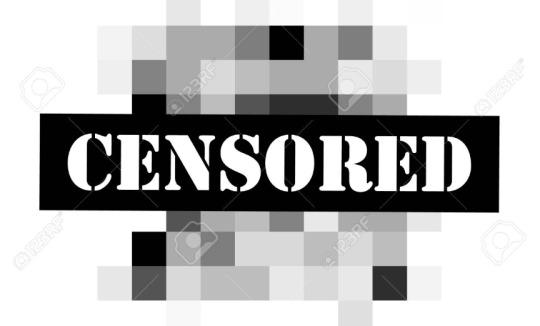
chapter 22 begins with Bella and Edward getting into the car to get to the airport to get on the studio’s private jet to fly to a different airport to get into a limo to get to the awards ceremony. okay, so maybe it’s not fun right off the bat. just hang on a sec.
on the drive, Edward notices Bella’s lack of delicious, suck-able earrings. she tells him she lost one, and he tells her he found it in her room and has kept it as a trophy. now he can’t stand the sight of her disgusting, shamefully naked ears, declaring that she should be wearing

so he makes Mike pull over at a Tiffany’s. I’m not even kidding. they’re on their way to an official event and he insists they need a pit stop to go jewelry shopping. Tiffany’s should really have a drive-thru for occasions like these.
Bella is not allowed out of the car for security reasons, so Edward takes Jasper to Tiffany’s instead. honestly at this point I am so checked out that nothing would please me more than a sharp left turn into Edward/Jasper territory, but alas, the most we get is Edward calling Jasper

and telling us how bitter and jealous Jasper is as Edward casually drops twelve grand on a single pair of earrings.
Edward makes sure to tell us how clueless he is choosing earrings, in case we needed to be reminded of what a good ol’ fashioned Red-Blooded Hetero™ he is. he’s so out of his depth here, among all this

don’t worry ladies, this hunk of oozing testosterone has never seen a diamond or a sparkle in his life
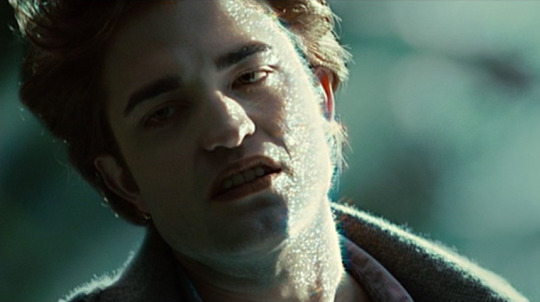
he quickly picks a pair of earrings called the “Victoria Double Drop,” which is as close as this story will get to having Victoria in it. oh well. on second thought it’s probably for the best that way, seeing as how in f!fty sh@des, erika made Victoria a head of Human Resources.
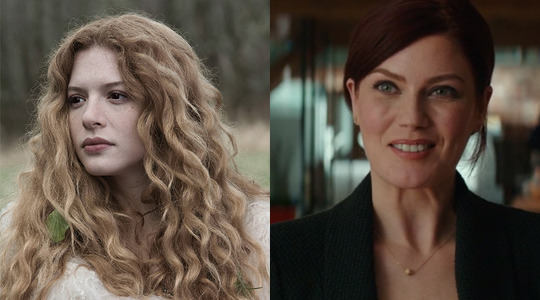

back in the car, Bella opens the

causing Edward to feel such varied emotions as

and

but of course Bella loves the earrings and puts them on right away.
I...assume we’re supposed to be impressed with Edward’s generosity and largesse and thoughtfulness here, but. do I even need to point out that if he were actually a thoughtful and considerate boyfriend, he would have spent more than two seconds picking out a gift for Bella and done it, oh, maybe a day or two before the black tie event as opposed to in the car on the way there?
Edward, Bella, and their retinue (Emmett, Jasper, and Edward’s movie’s director, Chris, who is completely unimportant to the story but still here for some reason) board the jet, which is decorated in

Ed and Bella sit down on the couch, causing Edward to have a flashback to the time he had a threesome with two beautiful flight attendants on the same couch last year.
like actually. that’s an actual thing in the actual story. flight attendant threesome.
Edward catches Bella eyeing him during his fun little reverie and has a moment of panic

wait, was that a joke? was that a...fun reference to canon?
...gosh,
if only it were in a better story
anyway. after the plane ride, the gang meets up with Taylor and gets into some

to head to the read carpet. once on said carpet, they pose for “the fucking press corps” in a paragraph where erika hilariously mixes up flashbulbs and flashlights, making it sound like everyone on the red carpet is playing flashlight tag.
Bella gets a lot of attention from the press and seems uncomfortable with it, causing Edward to wonder if it was a good idea to bring a shy person who’s spent the last six months in hiding from murderers to such a high profile event. ya fucking think?
they talk to a bunch of people Edward hates and drink a glass of champagne

remember kids, champagne is gay. this post brought to you by Beer Hets™
Ed and Bella sit down for the ceremony, and guess whomst is one of the award presenters? that’s right, the delectable old vain blonde hussy herself.

and just when I thought Safe Haven!Bella couldn’t possibly get any stupider, I’m proven wrong.
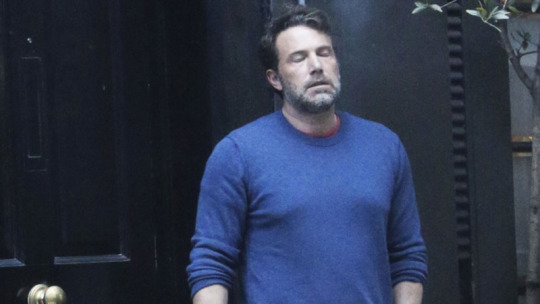
not to get all Serious And Analytical here, but Safe Haven is an amazing example of erika’s patented “write a heroine so unbelievably fucking dumb that all of the creepy male love interest’s abusive, controlling actions seem justified” method.
Tanya opens the Best Actor envelope with

and pauses for

and surprise, surprise, Edward has won. the audience dissolves into

then Edward goes up to collect his award, and we get one of my favorite paragraphs of all time, which I have here preserved for you in its entirety:

yes, that was 5 “fucks” in...two? sentences

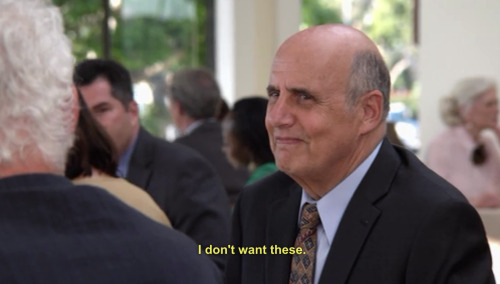
then Edward and Tanya have to do a photo op in front of a “lit to fuck board.” Tanya makes some catty remark about Bella and Edward snaps at her that Bella is “the future Mrs. Cullen, if you don’t mind.”
quick sidebar, are we sure an adult wrote this? like are we sure it wasn’t a ten-year-old? have we double-checked? like are we totally certain?
ok then.
Edward and Bella make their way to the after party, where they drink more champagne (gay) and something finally dawns on Edward

no, and no official, televised, US-based event would serve her in the first place. I can’t wait for the next chapter, in which all these characters serve 60 days in jail for supplying alcohol to a teenager.

then Bella starts to feel dizzy, so Emmett takes her to the ladies’ room while Edward poses for more pictures. place your bets now on whether she’s poisoned, pregnant, or both! my money’s on “both” but I wish it was just poison. that would be way more fun.
and indeed, some type of skulduggery seems to be afoot, because when Edward joins Emmett to lurk outside the ladies’ room, Bella still hasn’t come back after five whole minutes! Edward and Emmett share a glance

I’m sorry erika but literally what is the point of describing them like that if they aren’t going to fall in love?? can you fucking read, erika? can you read the phrase “dark burning eyes”?? can you read that last sentence aloud and then honestly sit here and tell me it’s not the gayest thing since gay sliced bread?? hmm? can you???
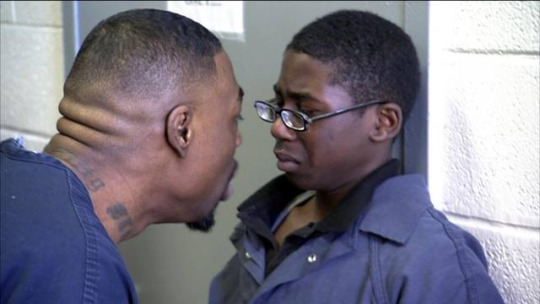
after this epically, gloriously homosexual moment, Edward bursts into the ladies’ room, surprising all the ladies who are engaged in activities like

you know, the more of el james’ work I encounter, the more I’m convinced that she has never actually met another human woman and that her only source of information on womankind is stock photos.


Edward rushes through the women’s restroom, checking every stall, only to find that—alas—horror of horrors—Bella has disappeared! oh, the humanity!
he fights “the nausea that’s threatening to erupt all over the fucking floor,” and there the chapter ends.
predictions: chapter 23 will begin with Edward projectile vomiting all over the women’s room. then it turns out that Bella is totally fine and was just taking some Me Time in order to laugh alone with a salad.

best “fucks”
“a complete fucking delight”
“every fucking muscle”
“a fucking house on fire”
“pouty fucking lip”
“secretly fucking pleased” (bella)
“fucking elegant” (bella)
“fucking blinking” (the Tiffany’s salesgirl)
“fucking flashy” (earrings)
“fucking animated” (bella)
“one of the biggest fucking mouths in Hollywood” (tanya)
“completely fucking oblivious” (bella)

next chapter: salt fucking peter
#spork haven#twilight fanfiction#anti e.l. james#alcohol mention //#if I had to guess I think this chapter has the most 'fucks' of any chapter#it's a good one lads#we're BACK baby#unsafe for work text //
16 notes
·
View notes
Text

Hey there, anon.
First, let me start by saying that I truly appreciate exchanging ideas and debating topics; I believe that’s one of the best ways to reach a deeper understanding, having a lot of different perspectives brought into it. But I’ll only do it if we keep it respectful. And if there’s interest in discussing this issue (and I’m assuming there is because you did send me this ask) we’ll need to first examine our own emotional reactions to it and see if we’re ready to be clear-minded about it. It is only possible to discuss ideas if we’re open to different ones in the first place.
Second, I want to make clear that I won’t try to convince you of anything nor, frankly, is that the point. All that I can do is present the information that we have and then offer my personal reading of it. What your takeaway is, concerns only you. But it is also wise to examine our own motives approaching this exchange; mine is to reach a deeper understanding of these people. If it was only a battle of wills, or each trying to “win” the argument by conquering the other with their strong pre-conceived notions, I’m afraid it wouldn’t be half as enlightening. I’ll proceed in the good faith that we’re all here seeking a greater awareness of other human beings’ inner lives.
And lastly, if we do want to get a look at those inner worlds and emotional landscapes, we have to actually look inside. This means we can’t take every word at face value and realise that every intervenient is dealing with their own complicated feelings, motives and biases; that means the initial subject, the surrounding associates, and finally, even ourselves. The best we can do is develop the critical sense and emotional intelligence necessary to be aware of all these different factors.
So, all preparations done with and guidelines established, let’s actually address your points.
I’ll start providing an excerpt of the Yoko Ono interview you’re referring to:
I ask if she has ever had sex with a woman, or been attracted to them.
“Well, that’s another thing. John and I had a big talk about it, saying, basically, all of us must be bisexual. And we were sort of in a situation of thinking that we’re not [bisexual] because of society. So we are hiding the other side of ourselves, which is less acceptable. But I don’t have a strong sexual desire towards another woman.”
Have you ever? “Not really, not sexually.”
One online satire imagined an affair between Ono and Hillary Clinton.
“It’s great,” Ono laughs. “I mean, both John and I thought it was good that people think we were bisexual, or homosexual.” She laughs again.
What about that old rumor that Lennon had sex with Beatles manager Brian Epstein (which was also the subject of the 1991 film, The Hours and The Times)?
Lennon himself said: “Well, it was almost a love affair, but not quite. It was never consummated. But it was a pretty intense relationship.” Later, Lennon’s friend Pete Shotton said Lennon had told him that he had allowed Epstein to “toss [wank] him off.”
“Uh, well, the story I was told was a very explicit story, and from that I think they didn’t have it [sex],” Ono tells me. “But they went to Spain, and when they came back, tons of reporters were asking, ‘Did you do it, did you do it?’ So he said, ‘I did it.’ Isn’t that amazing? But of course he would say that. I’m sure Brian Epstein made a move, yeah.”
And Lennon said no to Epstein?
“He just didn’t want to do it, I think.”
Did Lennon have sex with other men?
“I think he had a desire to, but I think he was too inhibited,” says Ono.
“No, not inhibited. He said, ‘I don’t mind if there’s an incredibly attractive guy.’ It’s very difficult: They would have to be not just physically attractive, but mentally very advanced too. And you can’t find people like that.”
So did Lennon ever have sex with men?
“No, I don’t think so,” says Ono. “The beginning of the year he was killed, he said to me, ‘I could have done it, but I can’t because I just never found somebody that was that attractive.’ Both John and I were into attractiveness—you know—beauty.”
I ask what she makes of the people outside the building, the crowds still at Strawberry Fields.
Ono misunderstands, or mishears (or is simply focused on the last strand of our conversation), and continues to talk about sex.
“I don’t make anything out of it. When you’re not really interested in that sort of sex, you don’t think about it. Both John and I surprisingly were very passive people. Unless somebody made a thing out of it, if they made a move, I wouldn’t even think about it.”
— in Yoko Ono: I Still Fear John’s Killer by Tim Teeman for the Daily Beast (13 October 2015).
You may not believe Yoko. But it is also important to understand if it’s because of her unreliableness as a witness (Yoko is excellent at PR and marketing, and John Lennon is the brand she’s built her life upon) or because of what she’s saying (John Lennon being interested in men). If it’s the first, that’s a reasonable worry, but like I said, you just have to possess the critical sense to be aware that that’s a motivation that is there and examine what she says with that in mind. If it’s the second, there’s a lot more testimony available from people other than Yoko that may help illuminate the matter. One of my favourite sources is John himself. But more on that in a minute.
But let’s go with the first one, for a second. That Yoko is someone with personal feelings, biases and motivations, one of them being that her livelihood depends on the maintenance of her continued association with the John Lennon brand and the fairytale JohnandYoko narrative she’s been promoting since 1968. Why then would she be one of the main voices claiming John’s bisexuality? And she gives us the answer in this interview: “both John and I thought it was good that people think we were bisexual, or homosexual.”
Consider that their image was that of the avant-garde, anti-establishment, bohemian couple. Like Yoko said, it not only generated press but was also very in-brand for people to think they were bisexual. John himself put it on similar terms when he asks himself, on November 1974, “It is trendy to be bisexual and you’re usually ‘keeping up with the Jones’, haven’t you ever… there was talk about you and PAUL…”.
As singer Chuckie Starr told Christopher Andersen [author of Mick: The Wild Life and Mad Genius of Jagger]: “[1973] was the glitter era, and everybody wanted to be part of the bisexual revolution.” It’s relevant then to remember that the rock world was full of stars coming out as bisexual during this period: Elton John, David Bowie, Mick Jagger, Lou Reed, etc. All four ended up somewhat retracting their statements: Elton John officially came out as gay in 1992, and the other three simply renounced their bisexuality in the 1980s, in the wake of an increasingly conservative culture and public panic over the AIDS crisis.
Now, this is an entirely too complex a matter for me to get into in this post: trying to figure out what was the “truth”, to separate one’s genuine interests from the context of the times. Did the “bisexual chic” being a fad during the 1970s and good publicity for those involved make the experimentations undertaken any less true? Were they faking it for the press or liberated enough to try? Are the take-backs fruit of them having decided that just wasn’t it for them or are they a reflection of what was socially acceptable at each moment? Is it like John and Yoko decided that “all of us must be bisexual. And we were sort of in a situation of thinking that we’re not because of society” or was that just the free-love idealism of the times?
I feel like Yoko’s statements come from that perspective that it’s all about experimentation. Bringing up the famous Norman quote, “From chance remarks [John] had made, [Yoko] gathered there had even been a moment when—on the principle that bohemians should try everything—he had contemplated an affair with Paul, but had been deterred by Paul’s immovable heterosexuality.”
I don’t know if the bohemian ideology was offered by John as a justification, but I suspect these were Yoko’s own rationalizations coming into play, perhaps in an attempt to create an emotional distance in John’s interest in Paul, claiming it was all about the experience and the physicality.
(It also remains frustratingly unclear if the “[John] had been deterred by Paul’s immovable heterosexuality” was part of Norman’s readings, Yoko’s gatherings or of John’s chance remarks.)
Another informative bit is this: “I think [John] had a desire to [have sex with other men], but I think he was too inhibited. No, not inhibited. He said, ‘I don’t mind if there’s an incredibly attractive guy.’ It’s very difficult: They would have to be not just physically attractive, but mentally very advanced too. And you can’t find people like that.”
First, I’d like to point out that while in this interview Yoko says that John never found anyone both physically attractive and emotionally advanced enough to consider having sex with, she did tell Norman that he’d considered having an affair with Paul. So John did find someone like that.
Secondly, I find it extremely revealing of John’s view of sex that he doesn’t consider it enough to be physically attractive, but he’s also seeking mental compatibility and stimulation. This tells me that John wasn’t interested in it merely as bohemian experimentation or just the physical release of a one-off thing. He was actually searching for the qualities necessary to maintain a longer relationship.
I personally think that for John, ideal sex was personal, and an epitomization of intimacy and closeness. (He always was a romantic.)
In interview with Sandra Shevey (June 1972):
JOHN: It’s a plus, it’s not a minus. The plus is that your best friend, also, can hold you without… I mean, I’m not a homosexual, or we could have had a homosexual relationship and maybe that would have satisfied it, with working with other male artists. [faltering] An artist – it’s more – it’s much better to be working with another artist of the same energy, and that’s why there’s always been Beatles or Marx Brothers or men, together. Because it’s alright for them to work together or whatever it is. It’s the same except that we sleep together, you know? I mean, not counting love and all the things on the side, just as a working relationship with her, it has all the benefits of working with another male artist and all the joint inspiration, and then we can hold hands too, right?
SHEVEY: But Yoko is a very independent person. Isn’t it— [inaudible]
JOHN: Sure, and so were the men I worked with. The only difference is she’s female.
SHEVEY: But you didn’t find it difficult to make that transition?
JOHN: Oh yeah. I mean, it took me four years. I’m still not – I’m still only coming through it, you know.
See how for John sex is just an extension of all the other ways to show physical affection, that he had craved while “working with other male artists”? “The plus is that your best friend, also, can hold you without…”; “it has all the benefits of working with another male artist and all the joint inspiration, and then we can hold hands too, right?”
And I don’t know of many outright negations of John being homosexual or having interest in men, but this one, “I’m not a homosexual, or we could have had a homosexual relationship and maybe that would have satisfied it, with working with other male artists” sounds more like an admission to me. Of course he had to throw that “disclaimer” in there after saying “The plus is that your best friend, also, can hold you without…” Without what, prosecution? Because you’re both men? John had to save face; he would have been practically both coming out and declaring his longing for his recently divorced male best friend.
“We could have had a homosexual relationship and maybe that would have satisfied it…” Satisfied what? Satisfied whom? Paul was satisfied. The declaredly unsatisfied one was John.
As for your point that John couldn’t be open to the subject because he was a homophobe, there is the likelihood of internalized homophobia.
Defined by Meyer and Dean in 1998 as “the gay person’s direction of negative social attitudes toward the self, leading to a devaluation of the self and resultant internal conflicts and poor self-regard” and by Locke in that same year as “the self-hatred that occurs as a result of being a socially stigmatized person”, internalized homophobia can make a queer person both hateful of themselves and other LGBQ people.
John himself realised and admitted that his violent conduct when accused of being gay as a young man, was born out of his insecurities about his own sexuality: “And obviously, I must have been un– uh, f– frightened of the fag in me to get so angry at that. You know, when you’re twenty-one, you want to be a man, and all that.”; “I must have had a fear that maybe I was homosexual to attack [Bob Wooler] like that and it’s very complicated reasoning.”
And it soon became apparent that his instances of homophobia, like the rest of his outwards aggressive demeanour, were only posturing.
If you’d like to read more about the topic of John dealing with his sexuality, I’ve recently answered two more asks about it: on the Bob Wooler incident and on the Tony Manero story. For more examples and anecdotes you can always consult the tag.
There are really too numerous examples of John expressing his openness and sympathy with the LGBQ struggle, sometimes including himself in that pain. Some examples are more subtle than others, but it’s there if we ourselves are open to that possibility.
Now, let’s focus on your last point: the people in his life that defended his heterosexuality. We’ll have to afford them the same depth and critical eye, in examining their statements that we’ve been giving Yoko and John.
For Cynthia, I apologize, but I couldn’t find any statement on John being straight, but if one is provided I’d be happy to comment.
As for John’s half-sister, Julia Baird, I do have a quote:
“Brian Epstein, the Beatles’ manager, was a known homosexual. Epstein was always polite and charming. It has been insinuated that John was drawn to Epstein. I believe there was no such relationship between them. John was macho. But if John was a homosexual, it would have made no difference to me. I’ve asked Paul McCartney, who laughed and said: ‘Why not me? I’m handsome.’ Then he said: ‘I was holed up with John in hotel rooms everywhere. There was never a suggestion of anything like that.’ I believe him.”
— Julia Baird, in Boston Globe: Lennon’s half-sister remembers… (2 October 1988).
Again, we have to put ourselves in her perspective. This is a person who contacted with John for some years as a young girl and he obviously made an impression on her; the teddy boy, her cool big brother. It is understandable that she would not want her memory of him threatened. People often cling quite strongly to the idealised image they have of someone.
But her statement that John was macho (and therefore couldn’t be attracted to men), shows how far her understanding goes both of homosexuality and John himself.
So if her image of John reflects only his surface-level projections of a macho tough guy, is fixed on the teenager she knew as a child, and doesn’t go deep enough to realise how soft and insecure he really was, then what can we expect from her assessments on his sexuality (especially considering her view that homosexuality seems to threaten the masculinity of a man?)
And finally, we have Paul.
Paul’s relationship with the subject of John’s sexuality almost deserves a post of its own. [And I had in fact written quite a lot about it in this post before it suddenly closed without saving.] But the multitudes of emotional dynamics and levels of perception going on in there are so numerous that I think a new post really is better suited. I hope to get to it soon.
But let me just say here that there are a myriad of reasons why Paul would state that to his knowledge John was never gay, and none of them invalidates John actually being attracted to men. If he was or wasn’t is completely up to him, and from his own statements about it and his behaviour that was certainly something that he seemed to be exploring about himself.
Or at least, this is my reading of it. I only can guarantee you that I’ve certainly made the effort to examine all the possible motivations present, including my own. But what you take from here anon is, similarly to John’s sexuality, up to you entirely.
-
[Note: I’ve answered this ask despite feeling a certain defensiveness from the sender, that I feel translated in a kind of hostility in the language. Maybe this wasn’t the original intention but it was what it felt like to me. Hence the introductory disclaimer that it only makes sense to send an ask if one wants to discuss ideas and hear my opinion on a subject. If there is no openness to have this discussion in the first place, I’ll reserve the right not to respond either. Thank you, and please keep the exchanges ongoing but respectful.]
#John Lennon#yoko ono#paul mccartney#the beatles#cynthia#julia baird#asks me why#I'm not a homosexual or we could have had a homosexual relationship#the person I actually picked as my partner#johnny#macca#3rd verse#solo#meta#my stuff#(I feel kind of underwhelmed by this post because I wanted to get to Paul's part.#(But having written it all and then losing it just made me feel like not writing it now. Maybe soon. I hope this is enough.)#(Also Tumblr censured the original draft for some reason? An only text post was against their guidelines? That's why the ask is a screenshot
83 notes
·
View notes
Text
The Duke of the Bay: Part 4
If you want to be put on a taglist for this please let me know!
[Spotify Playlist] [Youtube Playlist]
First Part, Ao3 Link, Next Part
Story Warnings: Guns, threats, alcohol, homosexual slang used pejoratively and positively, internalized homophobia, ask me to add any if need be
Chapter warnings: mildly implied prostitution, ask me to add any if need be
Chapter Word Count: 2042
Summary: Patton O’Hearty was a great detective. Most people didn’t take him for one at first glance, especially when he dressed casual. He was abnormally chipper; he thought everything was the cat’s pajamas. He had a smile for everyone he met. He was always tipping his hat at the dames and gents when he walked the streets of the Bay Area.
The only person he could never catch was the leader of the planted mob in Emeryville, nicknamed The Duke. The Duke was good at hiding his dealings and joints well, and he rarely had a snitch in his ranks. The few who tried, well, somehow they disappeared before they could give the police any substantial information. He was well hidden, but popular among the residents of the town. People talked boldly of his rambunctious parties, never revealing the locations though. He was hard to catch, to say the least.
So what happens, when instead, the detective is the one that’s caught?
-
Mr. Doris was standing outside the small diner, holding a young brunette girl by the elbow. He was obviously struggling to hold her still. There weren’t many people in the street to witness, though a few eyes in the diner were peeking through the blinds in the front windows.
The lady was a firecracker. She was putting up a fuss for sure. She was spewing profanities that would make a sailor blush. Her brown hair was falling out of it’s pins, and her tan coat was ripped at the shoulder seam.
She paused her fighting when she turned and saw the detectives. Her eyes grew large as she recognized the men.
“Alice!” Logan called. He ran up to Mr. Doris, holding his arm up to sucker punch him in the face. Patton was lucky to pull him back first.
“Detective!” he scolded, “Backup up is on it’s way, don’t lose your cool.”
Mr. Doris’ grin was sinister. He had straight teeth that made his smile seem dangerous. He was a handsome man, objectively. His narrow eyes were almost hypnotic. They were such a light hazel that in the daylight they were almost golden yellow. His scar gleamed in the sunlight.
The detective and Mr. Doris stared at each other, both waiting to see who made the first move. When the sirens of the backup were heard, the man in the bowler hat threw Alice forward and turned tail. Alice cursed as she stumbled.
Patton pushed her into Logan’s arms, “Get her to the station!” he called as he ran after the sneaky, sinister snake of a man.
Mr. Doris was fast. The soft-spoken man clearly had many tricks up his sleeves that Patton would need to catch up to. His body was short and stocky, yet he practically glided through the streets as he was chased. Patton once again was struggling to keep up with a criminal because he underestimated them. He underestimated the entire gang, it seemed.
The detective’s heart pounded as he chased the spy through the streets. He barely noticed the pedestrians moving out of his way. He couldn’t let himself get distracted again. His lungs burned, yet he pushed. His legs were aching but the fury he held edged him forward. He shed his jacket behind him, not letting himself get over heated as he ran.
Slithery Mr. Doris turned into an alleyway, so Patton followed- only to see a car barreling towards him. He jumped back, watching with disbelief at the vehicle. Without a thought he found himself chasing the black Rolls Royce on his own human legs. It may have been futile, but the detective didn’t care at that moment.
He looked at the license plate, trying to make out the figures through his own sweat. He stopped running as the car got further and further ahead.
He couldn’t run any more. He threw his hat down and cursed. He paced in the road, cursing at himself for once again not being able to keep up with a criminal. This was the third time not being able to catch up. He felt tears well in his eyes but held them back. Crying would do him no good, now.
A loud horn interrupted his episode. He looked up and saw Logan behind the wheel of their Ford police car. He bit the inside of his cheek, meeting Logan’s glare with his own through the window. He leaned down to pick up his hat, then trudged to the passenger seat.
Alice was seething in the back seat, “Either of you gents want to tell me what the hell is going on?” she yelled. Her voice wasn’t scared. If Patton weren’t so upset, he would have been concerned by her lack of fear.
“Watch your tongue, we’ll explain it when we get to the station,” Logan ordered through grit teeth. He glanced at Patton, an unspoken question in his eyes.
What the hell is going on, indeed?
Patton scrunched his face in worry. He didn’t understand what was wrong with him, himself. He wasn’t usually so careless. He always had a clear head when on a case. He never had such intense feelings on the job. He was meticulous in his dealings with people. He was steady, he could stay objective no matter how sensitive the matter. He was a good cop. He was good.
Wasn’t he?
He internally cursed himself for letting himself get too attached to the Duke. Not just as a victim of seduction, but as a policeman. He was so antsy to set the head criminal behind bars. To see what the man looked like without the backing of his operation. He was craving the satisfaction in putting an end to the madness before the madness even began. He was so damn anxious to go to the party when he found out Logan got that tip.
Anyone would have known the damn note was a trap. Why did he fall for it? Even Logan had warned him. He thought it was just an anonymous do-gooder. He had blind faith in the goodness of people. Patton cursed himself again for being so gullible.
He felt bitter, with a million questions forming in his mind. If the trap was so obvious, what caused him to disregard it? Why did he need to be lured in that way in the first place? If it was clear as day, why the hell did their captain approve the mission? Why didn’t the captain even pause when he was told the plan the morning they got the tip?
Patton remembered he had smiled in satisfaction. There was a memory of the captain’s blue eyes grinning in triumph that flashed across Patton’s mind. At the time he dismissed it as confidence in the plan, but what if...
His eyes widened in disbelief at the connection. The captain…
He looked to Logan, panicked. “We can’t take her to the station, Logan!”
“Are you nuts? Why not?” Logan asked incredulously. “You’ve been acting like a loon for a month, Pat. Why should I trust your judgement now?”
“Because the captain is in on it! Please,” he softened his voice, “trust me this once.”
“I agree with...whoever you really are,” Alice piped up from the back seat.
“Patton. Patton O’Hearty,” he introduced, half paying attention to the kid. He was staring at Logan. “Logan, please. She’s a kid. I can’t endanger her.”
Alice crossed her arms and huffed. Logan’s knuckles turned white as he gripped the steering wheel. He set his jaw in consideration. It was a moment before he spoke again. He looked at Patton once more, and saw that Patton resembled a puppy begging for scraps at the dinner table.
“Alright, alright.” He pulled over to the side of a lake. He turned his torso to look at his passengers. “Where do we go, then?”
----
They walked into a dirty apartment located in the ghettos of Oakland. The place was small. It was cramped with the three people occupying the space. There were still beautiful decorations despite that. Pieces that showed Alice’s determination to not be deterred by her circumstances.
Patton’s heart broke for Alice. She was only sixteen. She lived alone, braving the world on her own.
Alice had drawings covering the wall by her small vanity to the right of the doorway. There were little notes she had stuck to the mirrors, and there were perfume bottles that glittered in the dim lighting. The clutter was beautiful. It told a story of a girl who kept as much beauty in her life as she could. Patton admired the strength Alice had.
“Sorry about the mess, usually the visitors I have don’t care.” Alice remarked. Her voice was masking her panic well. Patton had barely caught it.
“Don’t worry, Miss. We’ve got bigger things to worry about than the cleanliness of your home.” Logan replied for them. His face betrayed him, though. He and Patton shared a look of concern for Alice’s well being.
Alice walked to the stove in the far corner of the room. “Could I interest you two in some tea before we start our discussion?”
The two men shook their heads. Logan made his way to sit down on the pillows on the ground. They looked like the type of pillows Indians used for sitting on the ground, Patton thought. Logan looked awkward, as always. Patton walked to the mirrors to read the notes.
“Hold on, Alice.” “The future is bright.” “Only a few more years to go.” “I love you - Lola”
Patton shook his head. He was so enraptured by his curiosity that he jumped when Alice spoke up behind him softly, “I try to keep my head up when things get bad.”
“Why is Mr. Doris after you, Alice?” Logan asked. He stared at the two with curiosity.
Alice turned to look at him. “I borrowed some money from the Duke. I needed to pay rent. I had lost my job, and I couldn’t lose this place,” her eyes shined. She looked at the wall, but her face told the men that her mind was in another place.
“I’ve been in between jobs before. Usually I can handle it. I have a backup. I have friends who help me. Well, more like acquaintances. I tried to reach out to them.
“They’re all married now, or engaged. They didn’t need my trade anymore,” she blinked away tears. “I knew borrowing the money was risky. The Duke has a reputation for a reason, you know?”
Patton had tears of his own shining in his brown eyes. Logan seemed sympathetic, as well. Alice was being careful not to admit about her other crime, and they let it slide. The implication was enough. She was a desperate kid in a desperate situation. The detectives discreetly nodded to each other, silently agreeing to help this girl get her life in order.
Patton laid a gentle hand on her shoulder. He looked into her eyes. He saw her strength, her passion. She hadn’t let her circumstances kill her will.
“Let us help you,” he requested. His voice was gruff with intense emotion. “In return, you can help us catch the Duke.”
Alice turned her face to look at the vanity. She looked at the framed picture of Lola and smiled.
“Sure,” she agreed enthusiastically. “Let’s put the bastard behind bars.”
“If you work with us, you’re going to have to watch your language,” Logan chastised. His voice was still kind. “Now Patton, what’s this about the captain being in on this?”
Patton took his hat off to run his hand through his messy brown hair. He was nervous. Implying the captain being dirty was serious. If he was wrong, he could get suspended for making a false report. That, or worse, get fired.
If he was proven wrong, the captain could have that implication follow him for life. The man had a wife. He had a baby on the way. Patton admired the leader, he truly did, but could that admiration be misplaced? He’d been misplacing his trust a lot lately.
He took his time to figure out his words. He wasn’t aware that he started pacing. He felt nearly manic. He couldn’t explain why he thought the captain was in on it. In fact, his thoughts were telling him he was being irrational. It was his mind who was telling him how ridiculous he was for questioning his faith in the captain.
His gut told him something else entirely. There was something missing. It was a jumbled up puzzle. Which is why he needed to tell Logan. Logan was good at puzzles. He still trusted his partner. He looked at Logan eyeing him warily. Patton was aware of what he looked like to Logan; he was going mad.
Alice sat at her vanity to brush her hair. It had become untamed in the chaos of the afternoon. She still looked at the nervous detective through her mirror, also curious about the theory Patton had. She kept her mouth shut, though, aiming to fix up her appearance with the chaotic mess of beautiful, cheap makeup.
Patton sucked in a deep breath, and began to tell Logan everything he had so far.
-
-
-
-
Let me know if you want to be added to the taglist for this story!
#Intruality#Romantic intruality#Patton sanders#Logan sanders#Deceit Sanders#Remus Sanders#Virgil sanders#sanders sides fanfics#sanders sides fic#sanders sides#multi chapter#Mob AU#human AU#The Duke of the Bay Part 4#The Duke of the Bay AU#gun mention#guns#alcohol mention#internalized homophobia#gun violence#homophobic language#Mama Cesa writes#writing requests#possible analogical#analogical#romantic angst#romantic comedy#action and romance#action#The Duke of the Bay
4 notes
·
View notes
Text
Racist mom tries to bribe son to dump me, I gain power over everything she cares about.
This is gonna be a LONG post lol, may have gotten exact timing sequences out of order.
Met a guy that we had mutual friends with and invited him to hang out with my friends and do fun stuff. Later learned he was not even allowed to hang out with my crowd cuz his mother was the very strict and hypocritical sort who thought everyone else was inferior to her precious kids. Guy was telling them he was doing work or something. Eventually he told them he wanted to date me and they flipped. The dad doesn’t have much say in the house and the mom (EM) was livid.
You know how Amish people don’t like rock and “sinful” music? Or females that wear shorts and tanks? Yuuup basically her. She went through my social medias and literally compiled and printed out giant lists of every country song I’d ever posted or concert I’d been to or clothing she thought was too provocative along and gave it to the pastors at both of our churches. EP called MY mom at 2am a couple times to rant and rave about “how could she let her daughter do such sinful things and flirt with boys yada yada yada”. She made racist remarks to Guy (I’m a super cute half Asian half messican, and all of his family is pale white golden haired angels) and even asked him if I’d molested him (I’m 5’ 2” and he’s literally a foot taller than me) and if that’s why he wanted to date and marry me. He was still at home and they went on a family trip to Colorado. Or as it turned out to be an exorcism style prayer meeting over Guy because EM just knows there must be a demon or something wrong with him. Oh and this was only within a span of a few months while he saved up to move the hell out.
Nope not over yet. EM then was harassing his work, his new church pastors (mine), his friends, got one of his business partners to leave him with lies that Guy is “bipolar” and “Schizophrenic”, thankfully most of the people had our back and we had some good laughs over what outrageous things they told us. Even driving an hour and a half to his apartment (I know dumb move to let them know where he moved to), in the middle of the night a couple times to harass and berate him and blubber about how everyone would judge her and how her reputation was going to suffer and church standing, she even dragged his two younger siblings into it all and told him they were heartbroken that he moved out and all the reasons he needed to move back home. Cue even more fun, one night he was just done so when they showed up to again try and bully him into moving back home or at least dumping me, he just up and left. Got in his mini and drove away. AND THEY FOLLOWED HIM. Unbelievable right? He used to race his mini so he lost them pretty quickly and booked it over to where I lived and spent the night there. I know, why not call the cops right? Well there was no physical damage or threats thereof. Yes she’s been verbally and borderline physically abusive to him growing up, think patriarchy super conservatives but it’s a matriarchy. At one point EM asked Guy what it would take for him to dump me, what amount of money could she pay him (Guys dad makes buttloads of moola, yeah those kind of people) to get me out of his life and for him to move back home. SHE TRIED TO BRIBE HIM TO LEAVE ME. She’d threatened to disown him and all the typical rich EP stuff before and knew he didn’t care. EM even called all his guy friends and asked if Guy has ever had any “homosexual” tendencies etc. Next month Guy proposed, and EM was SO MAD that she heard about it for the first time from a mutual friend congratulating her on the upcoming wedding! So of course she calls all the pastors and REEEEs about how we’ve been living in sin (kicker, we hadn’t even done the dirty dance but she didn’t bother asking) and telling everyone that they shouldn’t attend the wedding etc. Yea call us prudes :p EM also printed out all the reasons why I wasn’t good enough for her son and handed those out like candy to church leaders. Then when that had no effect she switched tactics and did the same thing with all her reasons why he was immature and shouldn’t get married and should move back home and be parented. Still no effect, except my dad at a huge meeting where she tried to distribute those, gathered them all back up and handed them to her and told her to stop slandering us and said how ungodly that was. And she stood there baffled and all the other people present agreed with my dad and told her to put those papers away. EMs exact words “but but I thought the very reason everyone is here is to show Guy why he needs to leave that girl and move back home!” I couldn’t help a giggle and a few other people couldn’t either. That meeting is a whole nother story, it was hilarious.
Where is the revenge you ask? Well all that was just the tip of the iceberg of course, but the revenge has been pretty simple. Spend a few obvious nights (SLEEPING ONLY) at his place, just to trigger her, but ofc our pastors and friends knew we’d committed to abstinence our entire lives up to the wedding (hella yea wedding night was killer) and other things like that to get under her skin but nothing that anyone else thought was bad. Very publicly plan and execute a HUGE wedding (over 500 people) and tell everyone about how our relationship is so beautiful and holy and how Gods destiny brought us together yada yada. She made a couple extra hoops for our pastors but we jumped through them with flying colors and everyone except her thought we were the cutest most Christian kosher thing. So basically to save face she had to fake smile and accept all the congratulations and be secretly embarrassed that we didn’t invite her to the wedding showers (she said she never wanted to see me and wouldn’t go to the wedding) and made excuses as to why she hadn’t gone, EM couldn’t tell her friends that we hadn’t invited her now could she? She went after the best man too and he almost decided against being the best man she was such a hassle and he was a pushover, but I told him the best passive way to deal with her is tell her that he wants to be there for his friend and how could she argue with that? She didn’t. But of course, what’s better than forcing her to attend the wedding but not allowing her to ruin it? Extremely petty I know, but I’m a drama llama and have enjoyed 98% of all this. I of course get ahold of EMs own mom and get to know her and she’s very sweet and loves me to death, along with Guys siblings and his dad, as many of EMs own friends and their families etc. So everyone loves me and when we invite them all to the wedding, they strong arm her into coming. I have my cop friends who have been having a heyday hearing about all this drama coming in for the wedding, one of them I make my MC so if she tried anything, not only would they take care of her swiftly, but she would also deeply embarrass herself because there was no denying that there were 500+ people there who loved Guy and I, including a lot of her friends. The ceremony was great, went off without a hitch, oh wait... I am not a bridezilla so if anything went wrong it was fine and the drama was cracking me up, I was a little disappointed she didn’t try anything drastic, but I could see on her face the entire time that EMs smile was sooo fake, and I got reports that she was seen crying outside later. Watching people congratulate her was priceless. When my own friends congratulated her a few of them later told me that she seemed surprised that I had any “respectable” friends (her literal words) who thought well of me. And no I’d arranged her to be only in one photo so she couldn’t ruin any others.
Oh and our wedding day was only the 3rd time she’d ever set eyes on me. She was against me from the start for almost a year without ever having spoken a word or ever seen me in person. Take that EM. To this day I have no idea what was her real beef with me. Happy ending: now that I provided the first grandkids, to my chagrin they’re like baby Targaryens they’re so white, and of course she’s too “young” to be a grandma so she’s called “nana”, but we laid down ground rules and she knows we will ostracize her at the drop of a hat, and she has kissed butt so hard and to her credit done her best to mend everything without ever really actually mentioning any of it. It’s great. We have holidays and fun visits in between and she showers us with super expensive gifts and will drop everything possible to help if we need anything. I think we’re friends now. One day I think she might bring it all up and try and play the victim, idk, but she’ll be hit with a carefully detailed account of everything that went down, in case her memory “fails” her. I can forgive but I’ll never forget, after all, I got my delicious revenge. Power over everything she holds dear and the evidence to expose whatever she hasn’t already done by her own dumb self and absolutely ruin her reputation and community and church standing. I feel really good right now
TLDR entitles mom wants to be petty about me dating her son so I take petty to another universe levels and crush her with epicc facts and logic and hold all the cards to ruin her life now
(source) story by (/u/cyborgurl)
334 notes
·
View notes
Link
It's two days before Jess Fishlock flies back to America. She’s been back home in her native Cardiff for a month: the longest period she has been home for since she moved away to Holland aged 19 to pursue her football dream.
She’s 32 now.
The first thing she did after suffering a horrific anterior cruciate ligament injury was book flights to Cardiff.
Home acts as her stabiliser.
“Coming back to Llanrumney and being around my people, it just makes me feel safe,” she says.
Fishlock is a distinctively cool character. Wearing an almost entirely black outfit, the globally-recognised athlete is rocking ankle-skimming trousers, a black tee and leather jacket, with her trademark short blonde hair styled. In one pierced ear is a stud, in the other a gold cross hoop earring, and she wears a low silver chain around her neck.
Jess and Llanrumney
We’re probably within a 10-minute drive of Jess’ family home; the heart of the city suburb that acted as her playground during her childhood.
“I’m a Llanrumney girl, through and through, born and bred”, she proudly says.
“I have that rough side to me, I have that cheeky side to me, I’m fearless.
“I’m lucky because there was so much grass around so I was always playing loads of sports. I was one of six kids, so I was never alone, I was always getting into trouble with my brothers and sisters.
“The beauty of Llanrumney as well is my dad’s one of seven boys, all named Fishlock, all in Llanrumney. So I couldn’t get into too much trouble before my mum would get a phone call, and then I’d be found."
While at home, Jess admits she forgets that she's 'Jess Fishlock MBE': Wales’ most-capped footballer and one of the most recognisable Welsh athletes.
“I went over to watch one of the girls’ teams play the other day on the field and one of the girls just broke down in tears, just from seeing me. I didn’t even say anything to her.
“Her mum was like, ‘Why are you crying?’ She said, ‘I can’t believe it, Jess Fishlock’.
“When I’m home, I forget that.”
As if it’s what every professional athlete would have done, Jess adds, fairly nonchalantly: “So I took her to my house, actually, and gave her one of my shirts, because that’s what Llanrumney is.”
Back to school in Llanedeyrn, and the children - boys and girls, a mixture of ages - have entered the room.
'School's not for everybody - that's not a myth'
We’re at Jess’ former school, St Teilo's Church in Wales High School, although it's not the same building anymore. When Jess attended, the school was the other side of the hill but it’s now housed in a huge, modern, impressive home.
When telling her friends she was heading back here to speak to pupils, they had joked that she was brave.
In an interview published earlier this year, Jess had described her time at school as “hell on Earth”.
She’s here to set the record straight.
When setting her mind to doing some community work while home, she decided she absolutely wanted to return.
After her saddening comment was published, the school’s headteacher Ian Loynd dug out her email. When it pinged in her inbox, she knew going back was the right thing to do.
“Coming back here after me coming out and saying that school was hard for me, I don’t want this school to think it was because of them. It wasn’t, it was a time of my life and school isn’t for everybody - that’s not a myth.
“But although it was a very hard time in my life, it was still a school that I went to every single day, I got through it and it helped to mould me into who I am, whether that be great or bad experiences.
“You can’t just shut out all the bad stuff, because it’s the bad stuff that actually makes you a better person.”
She elaborates, and clarifies she wasn’t exactly the perfect pupil.
“I could have applied myself a little bit better in school, probably. But if you’re not comfortable somewhere, it’s hard to do that and I think that goes in any part of life.”
'Nothing about school helped me be me'
After the school talk, Jess shares a vivid memory that would make any listener uncomfortable, but if offers an honest insight into her school experience.
“Back then, the stairs wherever you went were segregated – boys only, girls only. And for someone like me at that point, I had short hair as I do now - which is far more acceptable nowadays than it was back then - you could only imagine what was being said in these stairwells.”
She would also go into the girls’ locker room and be told, “You’ve got short hair – you’re a boy”.
“At the time, when you don’t know what is actually going on with your own body, you don’t know, you don’t understand it because back then there was a rule that you couldn’t educate anybody on homosexuality, it was just ‘boy and girl’.
“They’re the most important years of your developmental life and everything that I was, in school I could not be.
“I couldn’t play football, I wasn’t really comfortable going from class to class because I’d have to go through these stairwells where I knew something was going to be said.
“Going into school every day there was nothing about it that helped me be who I am or who I wanted to be from a professional perspective, and who I was as a human. Just try to imagine that as an adult.
“And then try to imagine that as a child.”
Remarkably, she holds no bitterness.
“A generation of people went through the same stuff, it’s just I’m talking about it and I don’t want it to happen to anybody else.”
Jess says she knew she was gay around the age of 12.
“I knew really young. But knowing it and accepting it are two different things.”
She was terrified, not in herself, but of people knowing.
“Knowing it would be hard for my mum and dad, hard for my family, impossible for my grandparents and in a different kind of world, really, to the rest of society, now that is scary, especially for a 12-year-old.”
Sport, and nature-filled surroundings, acted as her respite.
“I was lucky because I would go out in the evening and I would play football.
“And then I would have a terrible day and then I would play football, and everything would be fine, and I’d go back to school. That was just what it was.”
When one of the pupils asks her how many league titles she’s won, she literally has to stop, look down and count.
“One sec,” she says, prompting a few giggles.
“I don’t know, more than 15.”
Every story starts somewhere.
And, for this double Champions League winner who has played in countries from Australia to Germany and France to America, her football story starts aged seven.

Elder sister Kathryn wanted to go to a summer football camp near Heath park. Jess had no interest, but it was either join in or stay in her bedroom.
Jess’ mum still has the picture of Jess that day that was published in the newspaper, where she has a mushroom haircut, ball in arms, looking at the camera.
Jess name-checks Cardiff City Ladies’ club chair Michelle Adams MBE and secretary Karen Jones MBE as pivotal figures who helped her.
She was allowed to train with teenagers at the club when she was seven years old, and then with the adults aged 12 onwards.
“I remember I’d be shouting and crying to my mum if I’d go to training and Karen and Michelle would say ‘you can’t train with them today, you have to train with the youth’. I would just bawl!”
Seattle Reign
Jess is settled in Seattle having played for the city club, Reign FC, for almost seven years.
For an athlete of her profile and success, she is astonishingly grounded.
Frequently acknowledging how others have guided her, she uses the word ‘lucky’ no less than 11 times during an hour-long interview to describe her journey.
But it hasn’t always been a smooth ride.
After dropping out of college to concentrate on making football her career, she got a job - working in customer services for a telecomms provider. She was working 40 hours per week aged 16 to be able to pay her way and afford her football equipment.
“If I went back, I’d probably change my decision, even though it’s worked out.”
A few years later, aged 19, Jess had moved to Holland to play for AZ Alkmaar. It was her first time living outside of Llanrumney, pretty much, and she wasn’t coping well three months in.
“I rang my mum, crying my eyes out, ‘I can’t do this, I hate it, it’s not what I wanted, it’s not what I thought it was going to be, I’m coming home’.
“Her response was, ‘You’re not coming home, but if you do come home, you’re not living here’.”
Her mum Sharon can’t believe she tells this story to other people, Jess comically concedes.
“She said, ‘Give it until after Christmas and if you don’t feel any better, I’ll fly you home’.”
That was another three months away.
“Obviously I got upset and hated my mum at that point in time, which she always says was the hardest thing for her.
“She wanted me to go home, of course she did, but she knew that was selfish of her to want me to come home, because she knew that I wanted my career more than I wanted anything.
“In three months, I was having the time of my life. I just turned a corner, I don’t know what it was, broke through it and signed a two-year deal.”
It’s clear to see how much family means to Jess. She envisages returning to Wales to live permanently at some stage: to be closer to them, and to enjoy being an auntie.
Jess says she learned one of the most important lessons in life from her parents when she told them she was gay.
“Their love for me never faltered and all they needed was education and understanding.
“That’s one of the best lessons of my entire life that my mum and dad have taught me, without knowing, is the ability to understand something and want to learn to understand something for the sake of somebody else, is the most powerful thing."
December 2018 saw the Wales footballer become Jess Fishlock MBE at Buckingham Palace for her services to football and the LGBT community. At the time, she said it meant so much more to receive it for both, and not just football.
In August this year, she was named in our Pinc List as the most influential LGBT+ person in Wales.
“It’s nice to be recognised for being visible and pushing the LGBTQ agenda, but I think I will always do that anyway.
“I think a massive part of LGBTQ ignorance and the darker side of it comes from a lack of understanding. I don’t think it’s genuine hate. I mean, that does exist, but I don’t believe that it is that, I truly believe it is a lack of understanding and visibility of what it means and what you feel and that kind of stuff.”
'Your influence on society won't stop when your career is over'
Jess is adamant that she could not just disregard her platform.
“Sports is at a point right now where so many more sportspeople are coming out and trying to change life things and politics, and that’s not a bad thing at all, but it is up to us to also be a little bit humble with that.”
Referring to her Reign FC teammate and USA World Cup winner Megan Rapinoe - who, along with her team, came in for a lot of negative attention during the Women's World Cup - Jess says: “When you get to that point, like Megan is now, winning games and winning these championships is amazing, but it’ll end at some point.
“What won’t end is your influence on society and your influence on the next generation.”
Jess agrees that the public reaction to the USA team speaks volumes about how sportswomen are generally expected to behave.
“I think they expect women to behave differently. I don’t think they expect women to have the little bit of arrogance to come and do a celebration, although it’s brilliant and it’s funny.
“And yet Ronaldo and Messi can take off their jerseys and hold their shirts up, but [USA star] Alex [Morgan] can’t sip a little bit of tea, which, by the way, was hysterical, and Megan can’t just pose after she’s just knocked out France. What is the problem with a female kicking ass, celebrating it, why does that bring you so much negativity?”
Wales' hopes for Euro 2021 and progress
She has missed the start of Wales’ new campaign as they bid to qualify for Euro 2021, being hosted in England. We won’t see her in a Welsh jersey again probably before April.
“Every day is like, ‘I’m going to retire’ and then, ‘Oh, I’m fine’, and then, ‘Oh no, I’m going to retire’ again. That’s kind of the everyday mental progress of it.
“But, physically, it’s fine. My biggest drive to get back is to put on the Welsh jersey again.
“I think if we were able to qualify for Euro 2021, I think it would change the nation. It would change the dynamic, completely, and ultimately that’s what we want to try to do.
“If we don’t qualify then we can really deem it as failure because we have a good enough squad, we have a good enough group to be qualifying for a major tournament."
Just one poignant sign of progress made in recent years is the surprise that players were given at a friendly against Italy back in January: having their names on the back of their shirts for the very first time.
It had been organised by FAW backroom staff, and how much this meant is not to be underestimated.
“People who we’d worked with for a few years behind the scenes, they were fighting it for us – I think that is more powerful than anything else.
“That means so much more to us than us going into a boardroom and trying to fight with the FAW, which we would never do. We have a great relationship with the FAW and Jonathan Ford.”
Beginning the previous campaign with a couple of hundred supporters per game, The Red Wall flourished as Wales’ hopes of qualifying for the World Cup grew over the last campaign, before their final test against the Lionesses saw them miss out. That match was watched by more than 5,000 fans inside Rodney Parade.
Addressing the increased interest, Jess says: “It’s huge.
“It’s what it should be, but ultimately it’s what it should be because of who we are and what we’ve done.
“It’s wrong for us to say this should just happen anyway, because there has to be an element of development and an element of success.
“You don’t just demand stuff because you’ve got a job. You have to work at it.”
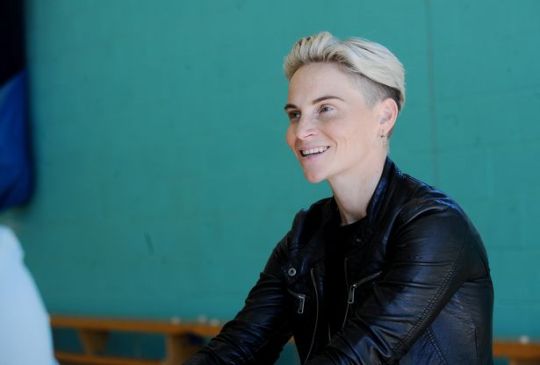
There is a long way to go in terms of catching up with the growth, visibility and commercial aspect to the men’s game.
Given the generally inclusive, accepting and welcoming vibe in women’s football - and men’s football not exactly being known for such qualities - I ask if there are aspects of the game and what goes with it that Jess would not want to see inherited from the men’s game.
“A hundred per cent, and that’s one of our biggest fears in women’s football is that we’re going to grow it, and we want to grow it so fast, that we make the wrong decisions and then it becomes exactly like the men’s game. And we don’t want that. Categorically.
“People might read this who are in the women’s game and be like, ‘no’, but I’m telling you now we don’t want that.”
She cites racism, abuse at players and the negative side of social media.
“What is beautiful about the women’s game is that it is inclusive, it is relatively safe and, as we grow it, we have to keep that. It is the most important part of it as far as I’m concerned.”
It’s approaching the end of the school Q&A on a sunny Friday afternoon in September.
“I would love to say I went to all my classes, but I didn’t. Don't listen to Jess Fishlock! But I’m not going to lie to you and say I was the best student in the world, I wasn’t.”
There’s the cue from the FAW’s media officer that it might be a good point to end the visit.
She laughingly agrees.
The headteacher explains there is a ban on mobile phones in the building, but makes an exception for selfies and pictures in honour of their special guest, to which Jess seems delighted and breaks into a cheeky smile.
“Breaking all the rules, I am back in school! Nothing’s changed!”
Let’s hope she carries on breaking every rule she sets her mind to.
Katie Sands | Wales Online Oct 6, 2019
#wales women's football#wales wnt#jess fishlock#woso#women in sport#i love her with all my heart#my baby tiny dragon
24 notes
·
View notes
Text
The Consequences of Jean Paul and Food For Thought, an excerpt from Aurora's Feather: The Queer Decoding of The Sign of Four.
"Some things should not be hidden behind glass. They were made to be touched."
“How small we feel with our petty ambitions and strivings in the presence of the great elemental forces of nature! Are you well up in your Jean Paul?"
"Fairly so. I worked back to him through Carlyle."
"That was like following the brook to the parent lake. He makes one curious but profound remark. It is that the chief proof of man's real greatness lies in his perception of his own smallness. It argues, you see, a power of comparison and of appreciation which is in itself a proof of nobility. There is much food for thought in Richter.”
Now, this was odd. Jean Paul Richter never became friends with Von Goethe, who disliked some of his literary methods. Goethe even dubbed him 'A Chinese in Rome' due to his perceived overuse of Orientalism in his writings..."but in Weimar, as elsewhere, his remarkable conversational powers and his genial manners made him a favorite in general society.” Carlyle liked him.
Goethe spoke often of, especially in his play about striving and strife, itself, but so had other Romantics, so why use a quote from another author, already so close to the thoughts of the original muse it seems ACD has been using so far, especially if Goethe didn’t even like the guy?

You know something I have finally picked up on, is when having to look into historical figures, there is the official version...and then there is the rest that gets left out, which is a theme that seems to be peeking out from this story; that of an incomplete tale, searching for wholeness; the same theme that was used in BBC Sherlock.
Enter Warm Brothers: Queer Theory In The Age of Goethe by Robert Tobin, which contributed to most of the following information.
Jean Paul
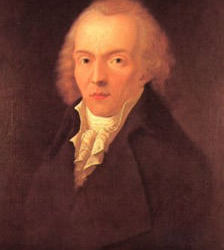
Johann Paul Friedrich Richter at one point changed his name from it’s more German sound to Jean Paul, which was French and what German society considered effeminate.
While most Romantic novelists wrote in the positive about Marriage, he usually wrote the experience as a negative; a deadly trap.
When he decide to marry, J.P. was quoted as saying “what he wanted was a woman to cook for him”.
18th century blurred the lines between homosexuality and heterosexuality. A person could have several ‘friends’ of different sexes, but could only love one person. Under the guise of friendship, people could say and write things that sound incredibly queer. Some men did not want their spouses to know about their letters, but others who were more pro-feminine, shared their lifestyle with their wives.
He coined the term “love of friends” used as a term among German homosexuals in the 20th century.
Jean was upset with the Christian faith, in part because he could not engage in health, fun horseplay with his male friends.
He once wrote to a friend, "Love must have something physical, a twig, down to which it flies. Send me a twig!”
(Seriously, these German dudes are killing me!)
Jean Paul is...or should be...considered an important voice in Love, Romance, and Homosexuality in German literature.
His novel Siebenkas is about Same Sex Desire, Orientalism, and a Love Triangle. From Transcendental Masturbators: Jean Paul's Siebenkas:
"Siebenkäs found Jean Paul leveling a more general critique at the Romantics and at Fichtean Idealism. This novel has been called “the first German marriage novel.” It appeared at a time in which the theory of marriage and the theory of self-consciousness were curiously intertwined. Jean Paul's critique of philosophical language threatened the self-understanding of German Idealism, construing it as a radicalization rather than a partial repudiation of the Enlightenment. Johann Wolfgang von Goethe's Wahlverwandtschaften showed that a married couple has sex while committing imaginary adultery. The erotics in the Wahlverwandtschafte imagined the four partners (real and imaginary) in four different sexual arrangements."

Orientalism
The Orient had a reputation of an ‘excess of intercourse’ and that it ‘exuded dangerous sex’. It is probably not a coincidence that increase in colonization to parts of the Orient run parallel to the popularity of it’s ‘Sexual Exoticism’ in widespread European literature. Germany reinforced cliches about Sex and the Orient, codified and promoted them in literature and philosophy.

The 19th century British explorer Richard Burton mapped out what he called the SOTADIC ZONE; an area outside of Europe that seemed more prevalent to Homosexuality and Pederasty. (For Burton, pederasty and homosexuality were "geographical and climatic, not racial," meaning it could be found in all the red bits.)
The countries included Morocco, Tahiti, Siam, the West Indies, Northwest America, India, Arabia, Algiers, Egypt, Turkey, China, Siberia, Italy, Constantinople and more within this zone.
Many Europeans, including Wilde, regarded North Africa as ‘a playground full of potential partners’. Italy was well known for its male prostitutes. Hans Christian Anderson was quite ‘distracted’ by them.
Goethe penned an Orientalist novel The East-Western Divan. It turns out that among Goethe’s many interests, it included Eastern Religion and Literature. In an amenable nod to Jean Paul, he stated that “A man who has 'penetrated' the breadth, height, and depth of the Orient, will find that no author had approached the Eastern poets and other authors more than Jean Paul.”
From Holmes quoting Jean Paul, if one were to assume that he wasn't merely referring to Paul's general philosophies, but his other 'foods for thought', then that would have to point to the German novelist being an advent for same sex male friendship AND desire, his use of Orientalism, in Paul's case, BOTH of very close male-male friendships, and Exotic male bodies. He wrote novels, poetry, and papers on the subject, particularly about the acceptance of close male friendships, be they homo-social, homosexual, or otherwise.
(Incidentally, the story within the story of Small, and his exotic adventures...where is it set, again?)
"In response to an ongoing public feud between a local Gay poet and a known homophobe, Goethe took up the cause of homosexuality when it was under massive attack. The attacks had begun in earnest in 1807, not only in response to Goethe’s championing of Winkelmann in his essay of 1805, but in a politically charged campaign against the supposedly treasonous Homosexual Johannes Muller...the attacks on Muller, one of the most celebrated historians of his day, were venomous, for the first time, bringing Nationalism to bear on the interpretation of Homosexuality (at the same time, incidentally, when anti-semitism took on a particularly modern virulence)”
“Man, esthetically is after all much more beautiful, superior, more complete than woman. Once it had arisen, such a feeling then can veer off easily into the animalistic, brutishly physical. Pedarastry is as old as Humanity, and we can therefore say that it is found In nature, even as it is AGAINST nature.”
At this point in the meta, I was almost finished, and had saved Jean Paul for one of the last pieces. I almost stopped here, but I kept having a thought: WHAT IF 'FOOD FOR THOUGHT' REFERRED TO SOMETHING ELSE? A POEM OR OTHER BOOK BY PAUL?
From Amazon: "Life of Jean Paul F. Richter Volume 2", by Eliza Buckminster Lee and William Howitt, is a replication of a book originally published before 1845. It has been restored by human beings, page by page, so that you may enjoy it in a form as close to the original as possible."
This book includes a quote, from a critic, on a piece of work:
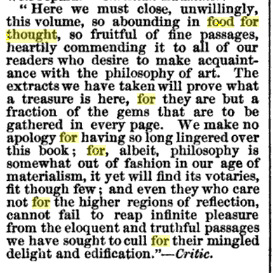
Only...the critic above was not speaking about Jean Paul, but Fredrich Schiller, and his highly praised piece of work,
The Philosophical and Aesthetic Letter and Essays of Schiller.
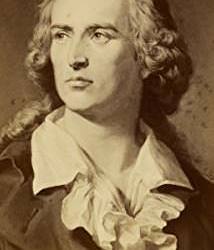
Johann Christoph Friedrich Schiller (1759–1805) is best known for his immense influence on German literature. In his relatively short life, he authored an extraordinary series of dramas, including The Robbers, Maria Stuart, and the trilogy Wallenstein. He was also a prodigious poet, composing perhaps most famously the “Ode to Joy” featured in the culmination of Beethoven’s Ninth Symphony and enshrined, some two centuries later, in the European Hymn.[1] In part through his celebrated friendship with Goethe, he edited epoch-defining literary journals and exerted lasting influence on German stage production. He is sometimes referred to as the German Shakespeare; his are still among the most widely produced German plays both in Germany and internationally.
In addition to his literary accomplishments, Schiller was a formidable philosophical thinker. Between 1791 and 1796, he authored a range of theoretical works that are both sophisticated and original. These writings primarily concern aesthetics, but they stake out notable positions on ethics, metaphysics, ontology, and political theory as well. Together, his essays helped shape one of the most prolific periods of German philosophizing; since then, they have served as a significant source of philosophical insight from an aesthetic practitioner of the highest standing.
"As we shall see, Schiller’s solution to Kant’s belief that morality can only be achieved by negating man’s negative sensuous impulses, is to educate the emotions of man, in order to bring them into harmony with reason. For Schiller, a human being who has achieved such harmony, by transforming his selfish, infantile erotic emotions into agape of truth, justice, and beauty, is a “beautiful soul.” Moreover, since only such a person is truly free, durable political freedom can only be achieved by deliberately fostering such an aesthetical education of man’s emotions among the population. Because Schiller’s writings are such a devastating critique of the philosophical basis for continuing oligarchical oppression of humanity, academic agents of the oligarchy, taking advantage of the abstraction of Schiller’s argument, have gone so far as to attempt to deny his opposition to Kant, even to the point of lyingly portraying him as a Kantian".
Thomas Mann did a life-long study of Schiller in Queer terms for decades, and asserted in his last work Essay on Schiller, that the philosopher had an intense love for Goethe:
"The great adventure of his life, his experience of passion, of passionate attraction and repulsion, of deep friendship, deep desire and admiration; of give and take, of jealousy, of melancholy, envy and proud self-assertion, of lasting, affective tension...was an event between man and a man. It was his relationship with Goethe." Mann asserts that Schiller was the completely 'masculine' writer, that wanted to attribute to Goethe a 'feminine manner'.
The intense male friendships in many of Schiller's works have resulted in the inclusion of his works in various compilations of 'Gay Literature', including Bullough's Bibliography of Homosexuality. His piece Wallenstein is a known source for Gay Male History. During Schiller's time and beyond, his work was considered so Queered, that it seems 'The Appropriation of Schiller' actually became a thing. You will find his influence in plays, essays, adaptations, cinema.
So prominent was the talk about Schiller's perceived Homosexuality in Queer circles, that a Satirical magazine, Jugend, featured in one issue a drawing of two boys, resting, and overlooking a bridge and a tower, complete with a quote from Schiller. Sascha Schneider, untitled, 1897, Queer Schiller?
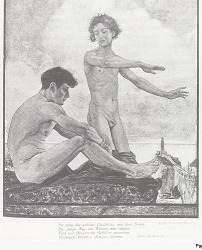
From Warm Brothers: "Let us leave the realm of psychoanalysis and return to Schiller . As Jane Bennett points out, confining Schiller to the purely abstract, to concepts like humanity and liberty vitiates his most heartfelt beliefs. Schiller was quite capable of writing abstract theses but chose instead, to write dramatic plays. In the abstract thesis, he went to bat for Aesthetics...for that realm of experience that attempted to bridge the gap between the mind and body; that attempted to connect sensual pleasure with thought. Schiller's hope, in the Letters of Aesthetic Education on Humanity, was that people could will to do what they ought to do. 'The 'willing' is often a sensual, physical, bodily act. The drama attempts as to flesh out the moral problems that Schiller confronts by giving these problems to people with actual bodies. By ignoring the sensual, physical, bodily in Schiller's dramas, readers have tended to turn him into an intellectual, concept artist, which is at odds with his philosophy of art. Schiller had begun his career with writings on the mind/body problem, inspired by the medical models that denied the separation."
Faust is academically seen as a treatise on Schiller's Letters. And the skull that Faust has is based on the actual skull of Schiller's that Johann kept for a short time.
If HoImes sees himself in this story, as Goethe and Watson as Schiller, he may have just hinted to Watson that he is a man of faults, but that he yearns to have a more human existence; a friendship that goes beyond the platonic, and to be made whole, through a sensual, physical act.
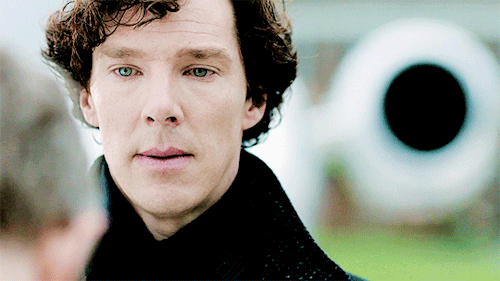
After all of this, everything just seemed to go quiet. I stopped working for a while, and started to cry.
@sarahthecoat @possiblyimbiassed @holmezyan @theconsultinglinguist @iamsherlockedbyholmes @impossibleleaf @raggedyblue @elldotsee @gosherlocked @elwinglyre @consulting-nerd-of-many-things @bluebluenova @devoursjohnlock @may-shepard
#i think this is what might be called a love confession#aurora's feather#happy 29 anniversay#johnlock#johann von goethe#faust#schiller
27 notes
·
View notes